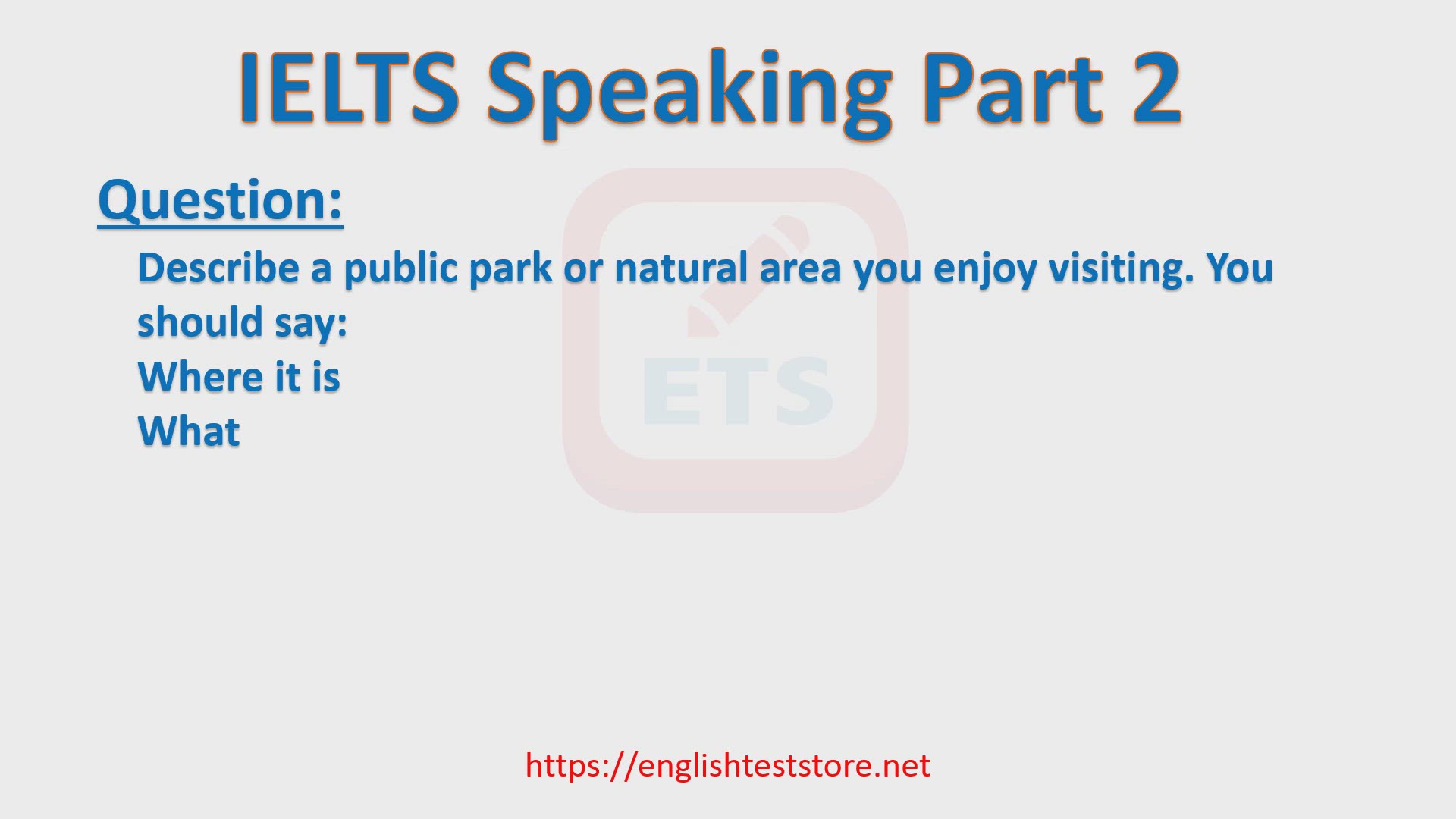
IELTS Speaking Part 2 - Describe a public park or natural ar...
32K views · Mar 16, 2023 englishteststore.net
IELTS Speaking Part 2 - Describe a public park or natural area you enjoy visiting
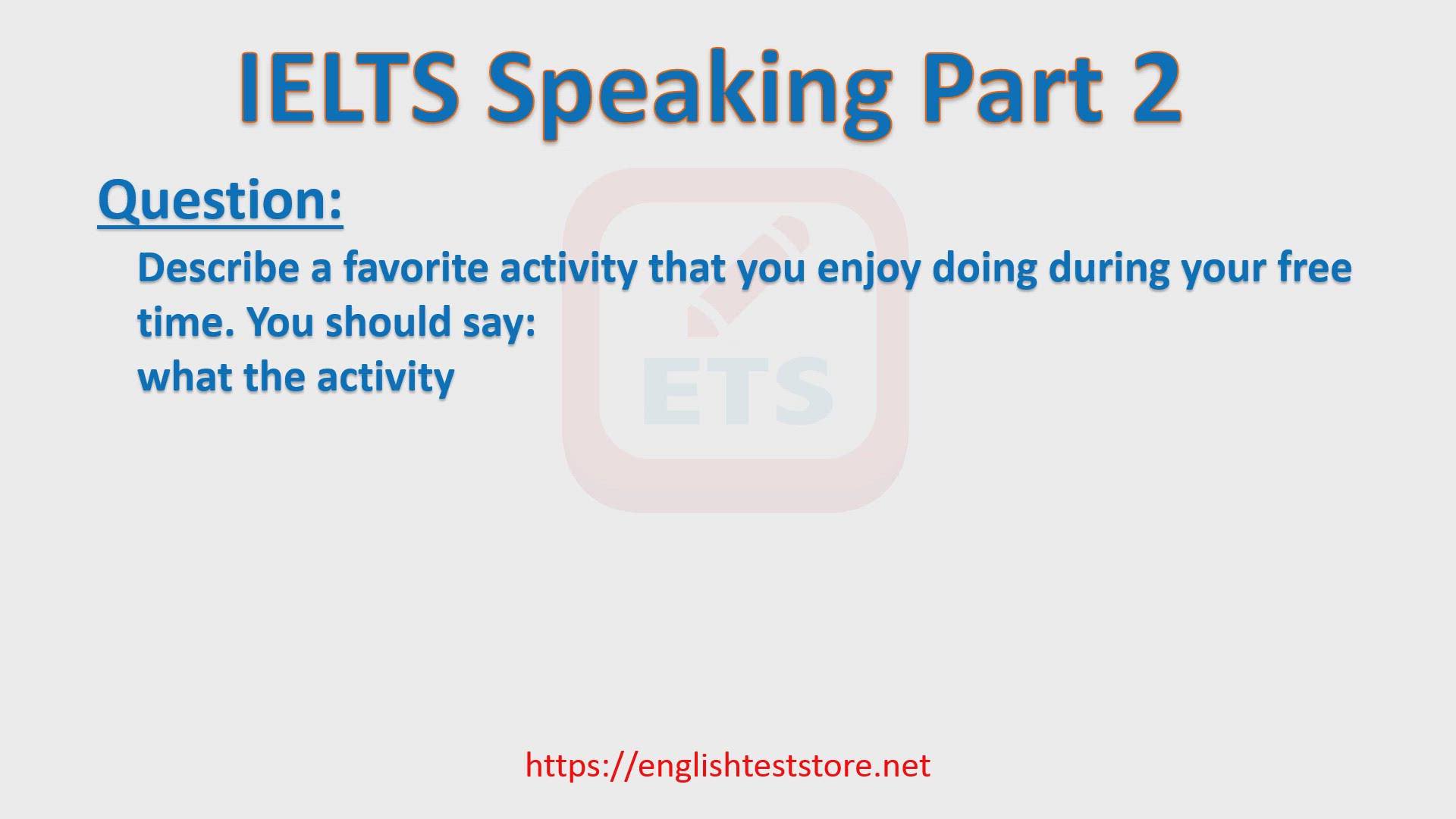
IELTS Speaking Part 2 - Describe a favorite activity that yo...
48K views · Mar 17, 2023 englishteststore.net
IELTS Speaking Part 2 - Describe a favorite activity that you enjoy doing during your free time
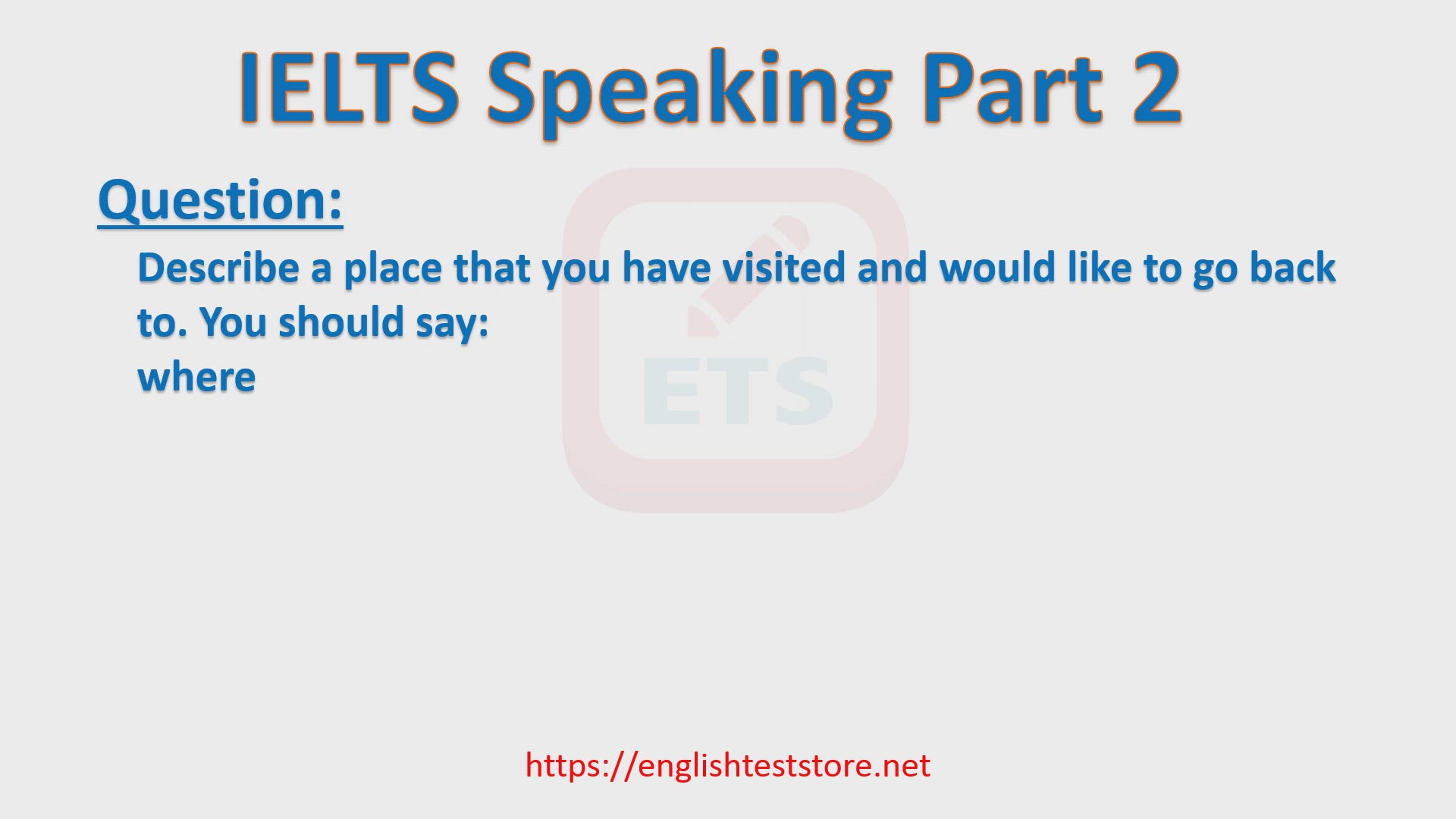
IELTS Speaking Part 2 - Describe a place that you have visit...
25K views · Mar 17, 2023 englishteststore.net
Describe a place that you have visited and would like to go back to. You should say: where the place is located when you visited it what you did there and why you would like to go back.
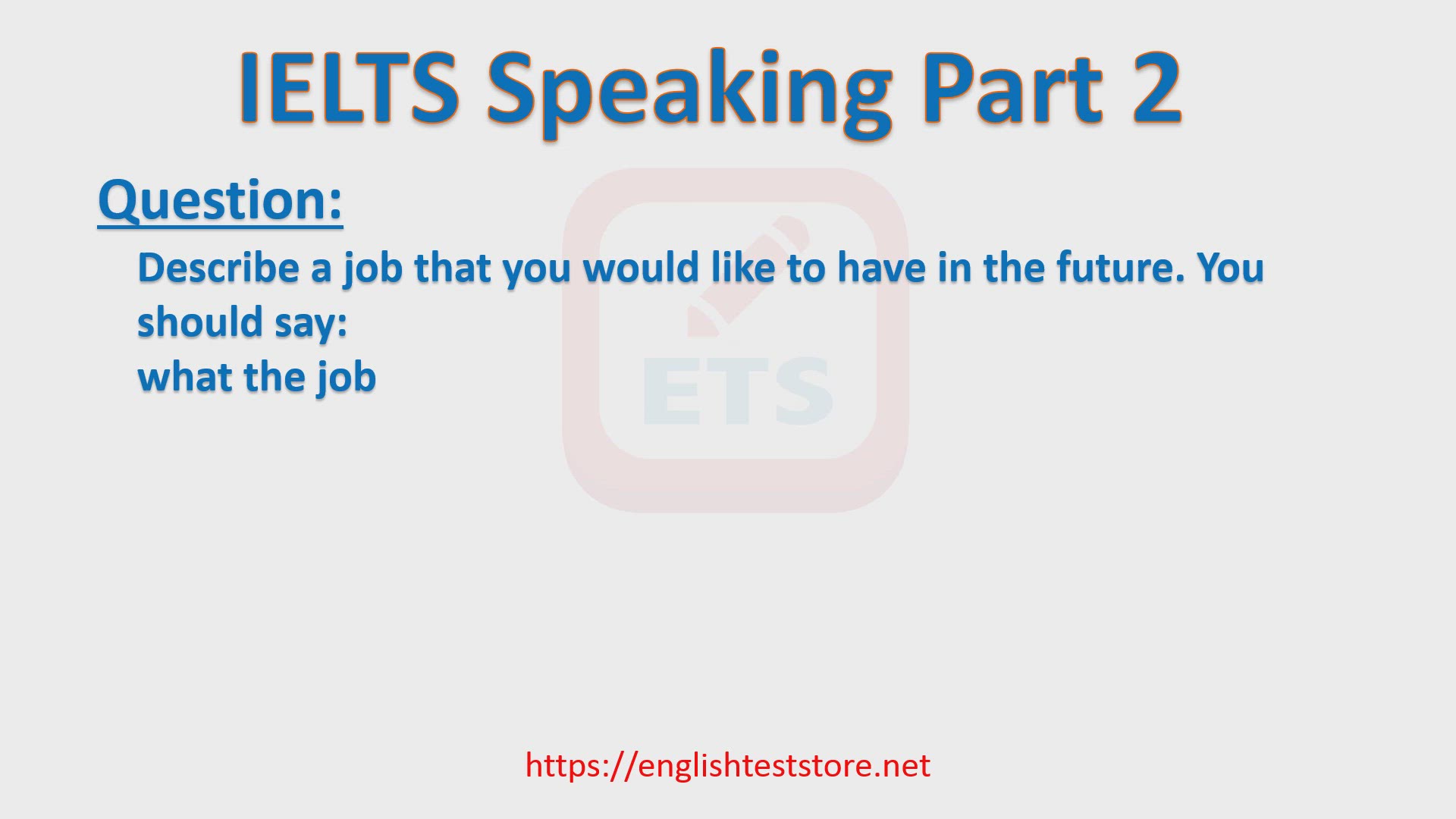
IELTS Speaking Part 2 - Describe a job that you would like t...
37K views · Mar 22, 2023 englishteststore.net
Describe a job that you would like to have in the future. You should say: what the job is why you would like to have it what skills or qualifications are needed for the job and what you would do to prepare for the job.
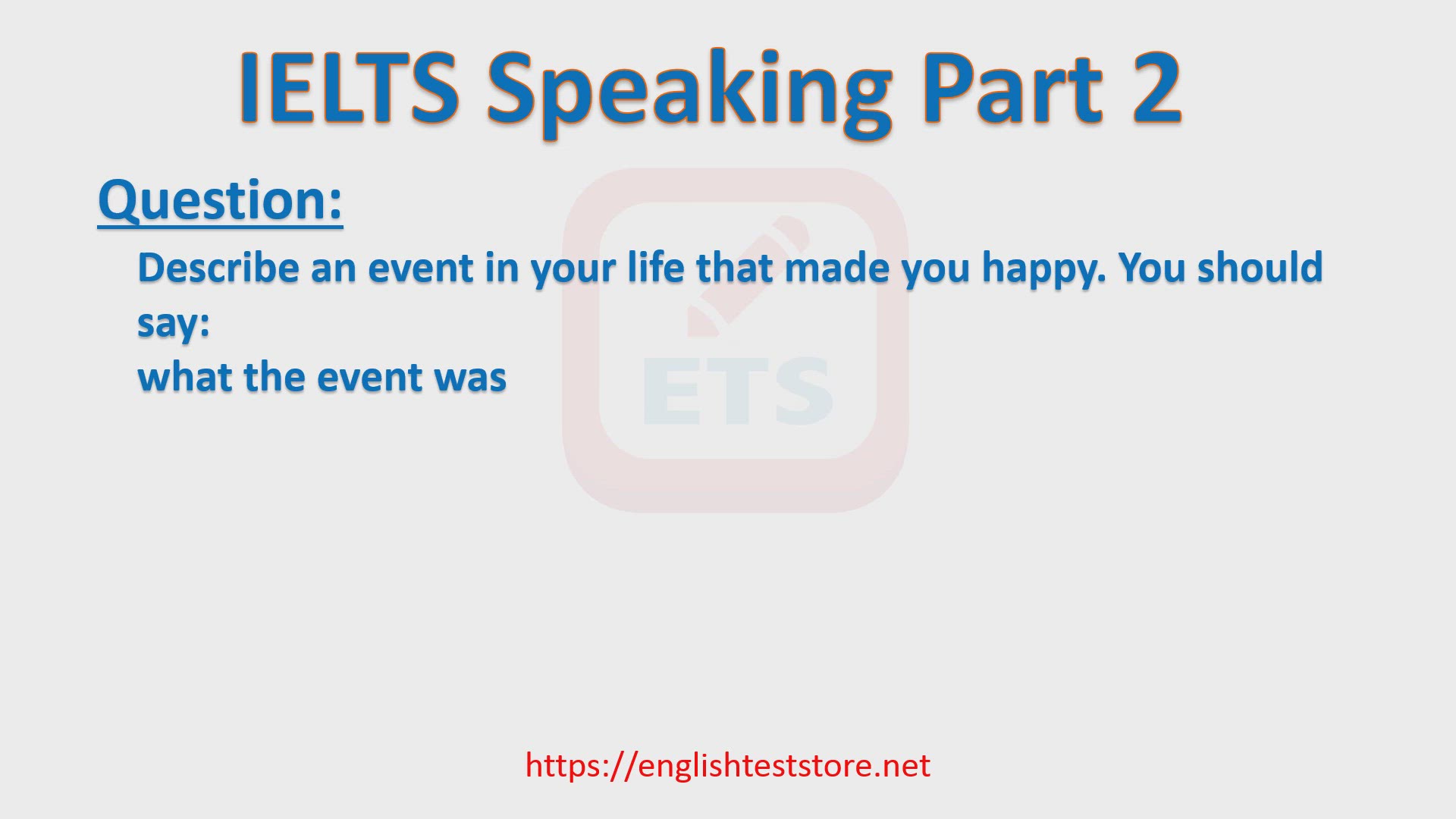
IELTS Speaking Part 2 - Describe an event in your life that ...
46K views · Mar 22, 2023 englishteststore.net
Describe an event in your life that made you happy. You should say: what the event was when it happened why it made you happy and how you celebrated the event. Practice at https://englishteststore.net/index.php?option=com_content&view=article&id=17777:ielts-speaking-part-2-describe-an-event-in-your-life-that-made-you-happy&catid=653&Itemid=1113
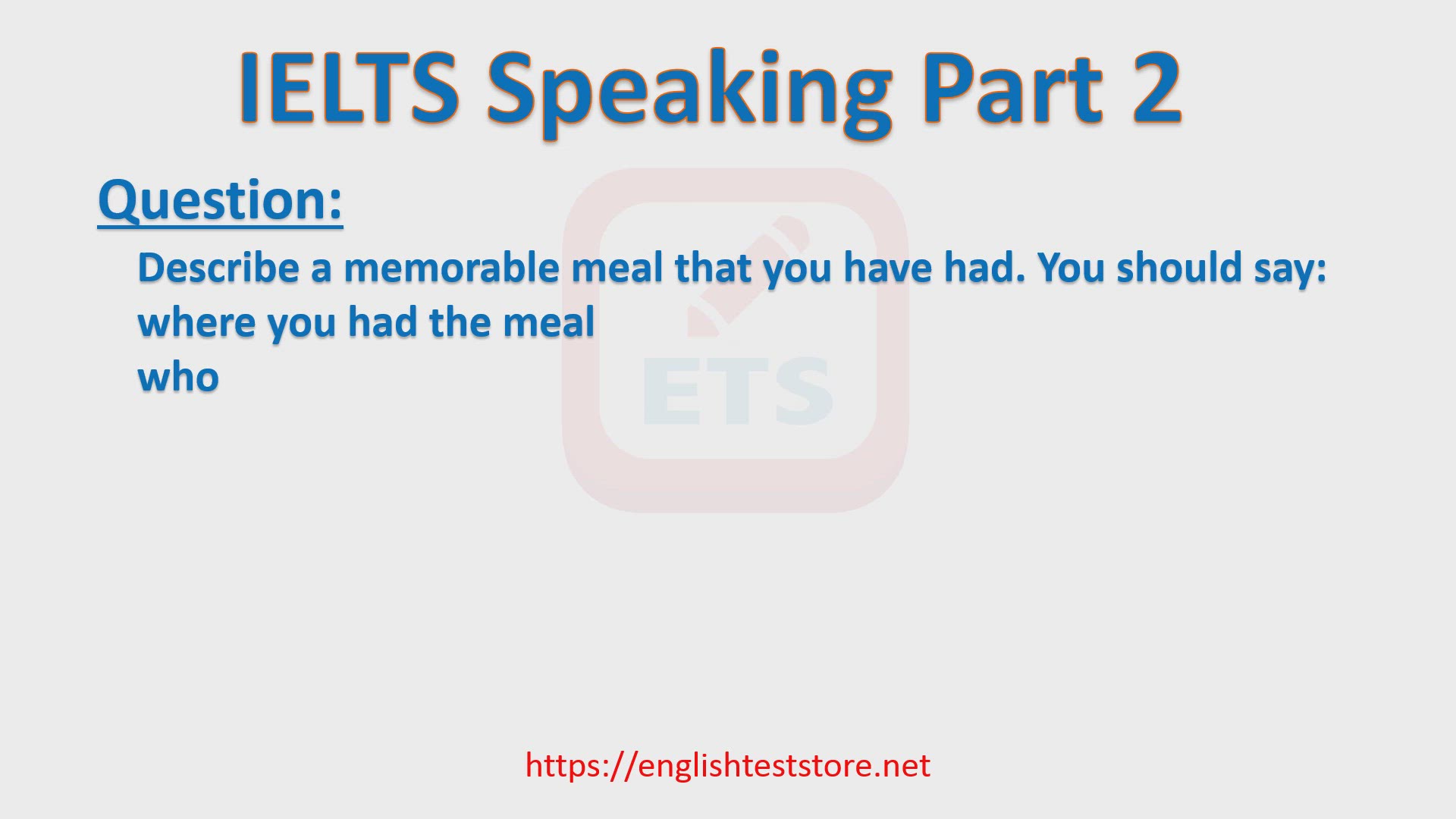
IELTS Speaking Part 2 - Describe a memorable meal that you h...
24K views · Mar 28, 2023 englishteststore.net
IELTS Speaking Part 2 - Describe a memorable meal that you have had. You should say: where you had the meal who you were with what you ate and why the meal was memorable.
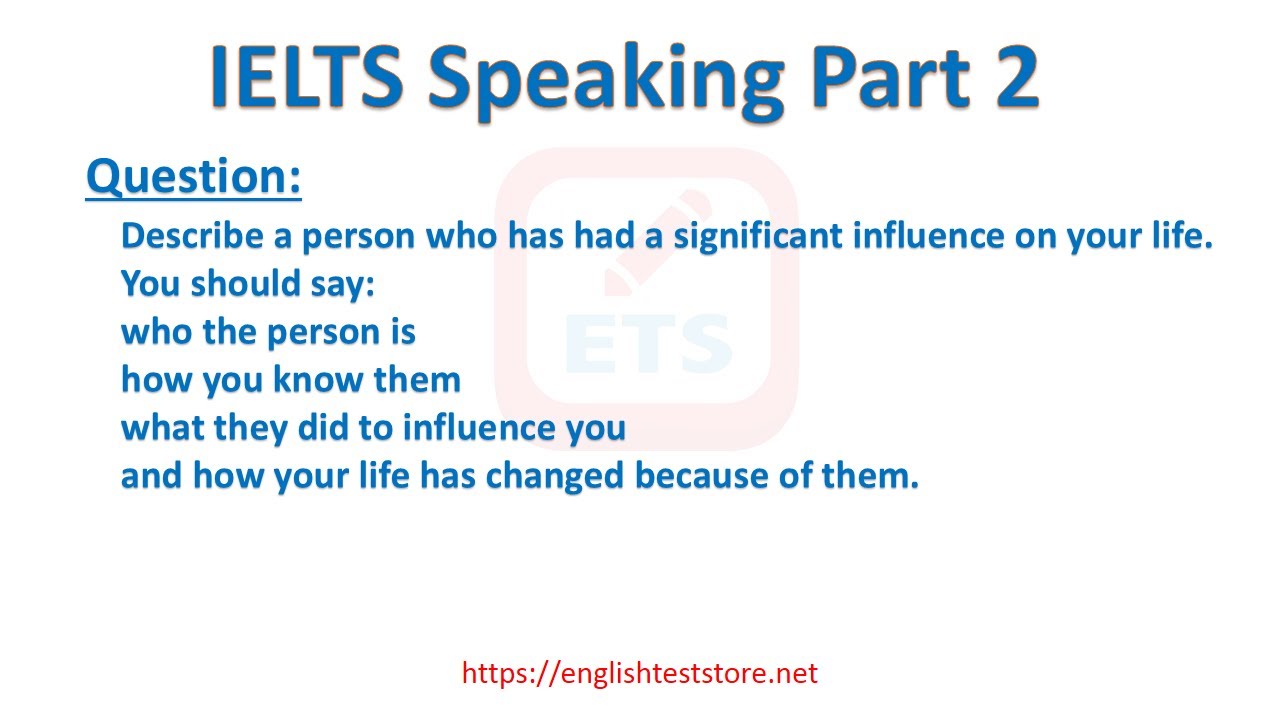
IELTS Speaking Part 2: Describe a person who has had a signi...
41K views · Apr 14, 2023 englishteststore.net
Describe a person who has had a significant influence on your life. You should say: who the person is how you know them what they did to influence you and how your life has changed because of them. Practice online at https://englishteststore.net/index.php?option=com_content&view=category&id=653&Itemid=1113 - Thank you for watching! Please subscribe, share, and like the video. EnglishTestStore ►https://englishteststore.net/ Facebook ►https://www.facebook.com/englishteststore.net/ Twitter ►https://twitter.com/englishteststor
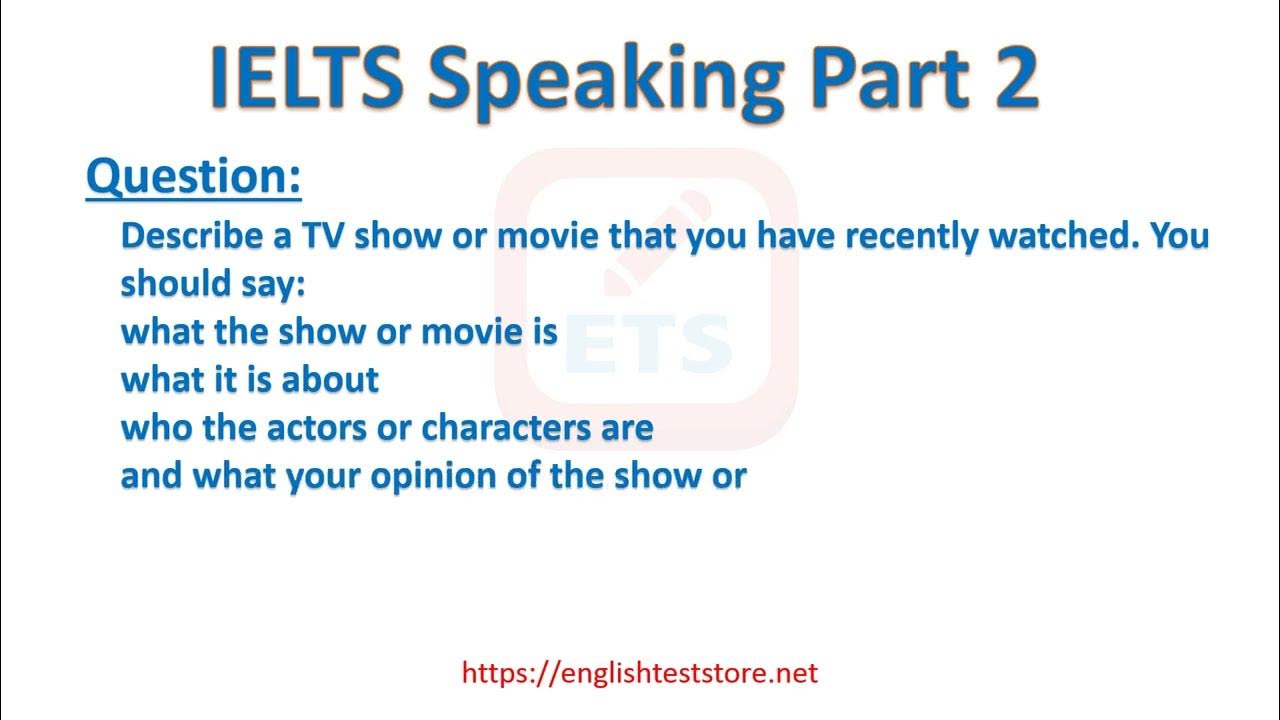
IELTS Speaking Part 2: Describe a TV show or movie that you ...
22K views · May 13, 2023 englishteststore.net
Practice online: https://englishteststore.net/index.php?option=com_content&view=category&id=653&Itemid=1113 Describe a TV show or movie that you have recently watched. You should say: what the show or movie is what it is about who the actors or characters are and what your opinion of the show or movie is. - Thank you for watching! Please subscribe, share, and like the video. #ieltsspeaking #ieltsspeakingpart2 #ieltstest #ielts #ieltspreparation #ieltsexam #ieltslistening #ieltslisteningtest EnglishTestStore ►https://englishteststore.net/ Facebook ►https://www.facebook.com/englishteststore.net/ Twitter ►https://twitter.com/englishteststor
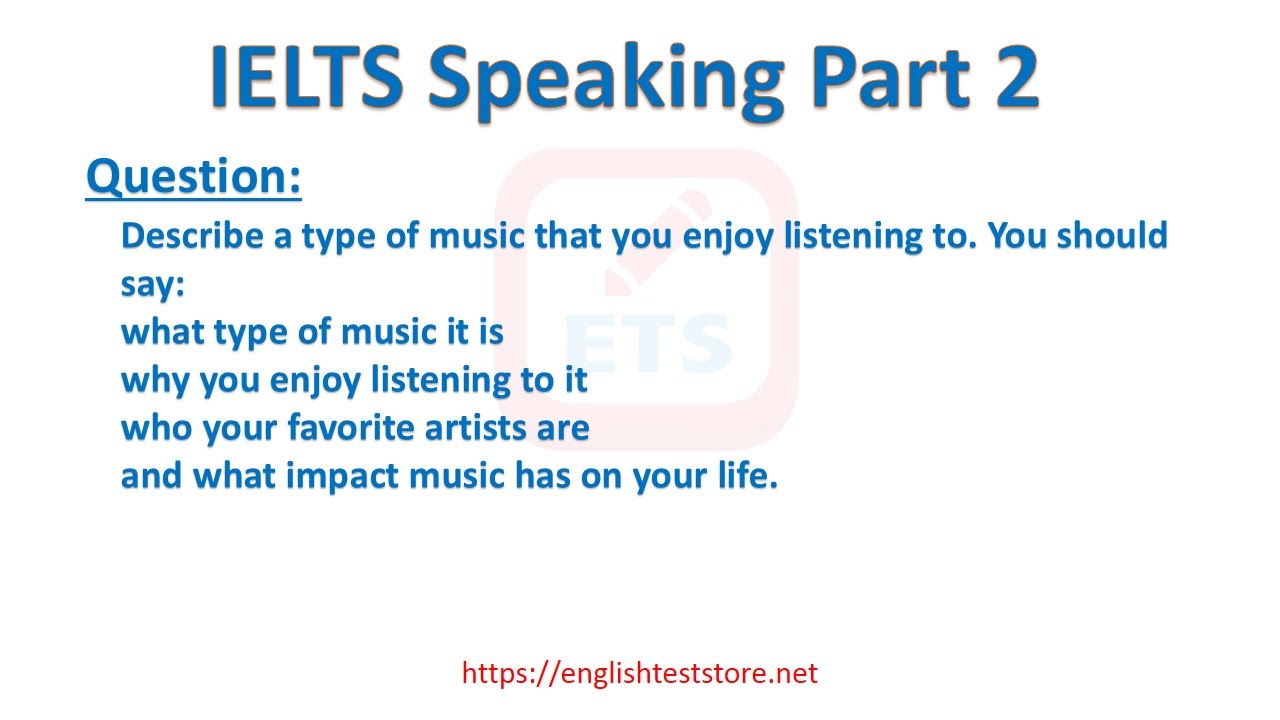
IELTS Speaking Part 2 - Describe a type of music that you en...
30K views · May 11, 2023 englishteststore.net
Describe a type of music that you enjoy listening to. You should say: what type of music it is why you enjoy listening to it who your favorite artists are and what impact music has on your life. Practice online at https://englishteststore.net/index.php?option=com_content&view=category&id=653&Itemid=1113 - Thank you for watching! Please subscribe, share, and like the video. EnglishTestStore ►https://englishteststore.net/ Facebook ►https://www.facebook.com/englishteststore.net/ Twitter ►https://twitter.com/englishteststor
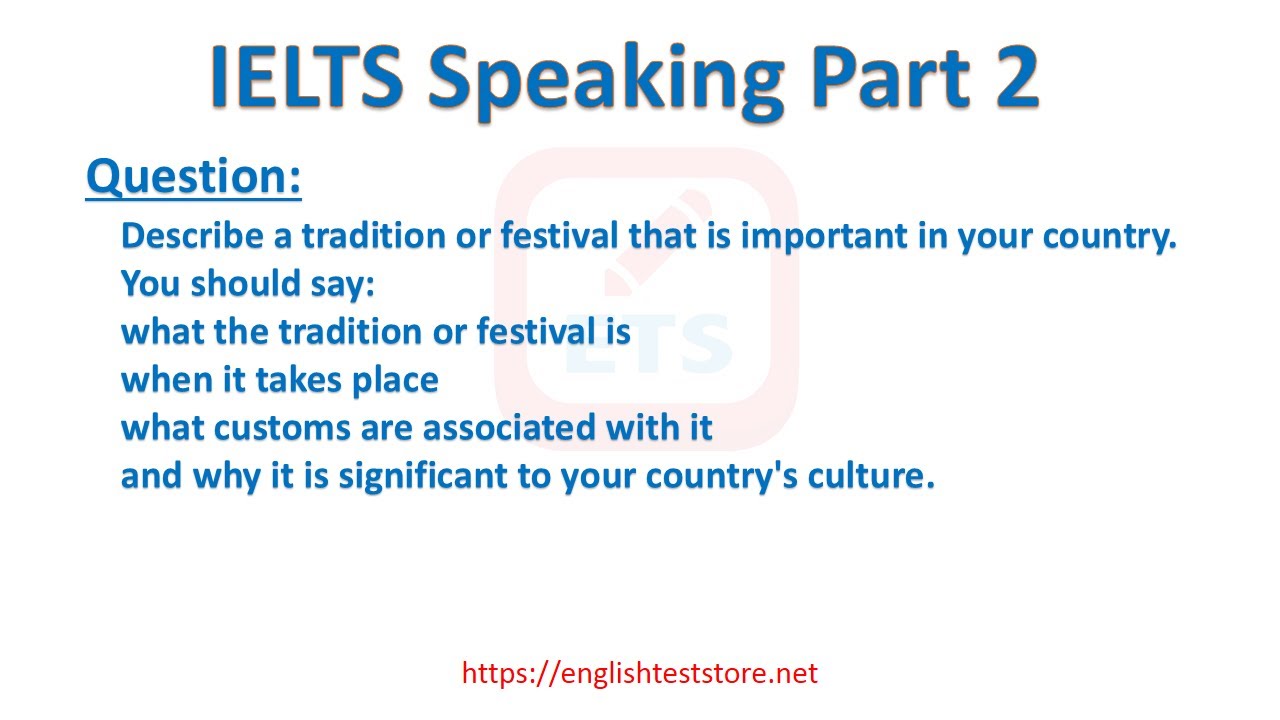
IELTS Speaking Part 2 - Describe a tradition or festival tha...
71K views · May 11, 2023 englishteststore.net
Describe a tradition or festival that is important in your country. You should say: what the tradition or festival is when it takes place what customs are associated with it and why it is significant to your country's culture. Practice online at https://englishteststore.net/index.php?option=com_content&view=category&id=653&Itemid=1113 - Thank you for watching! Please subscribe, share, and like the video. EnglishTestStore ►https://englishteststore.net/ Facebook ►https://www.facebook.com/englishteststore.net/ Twitter ►https://twitter.com/englishteststor
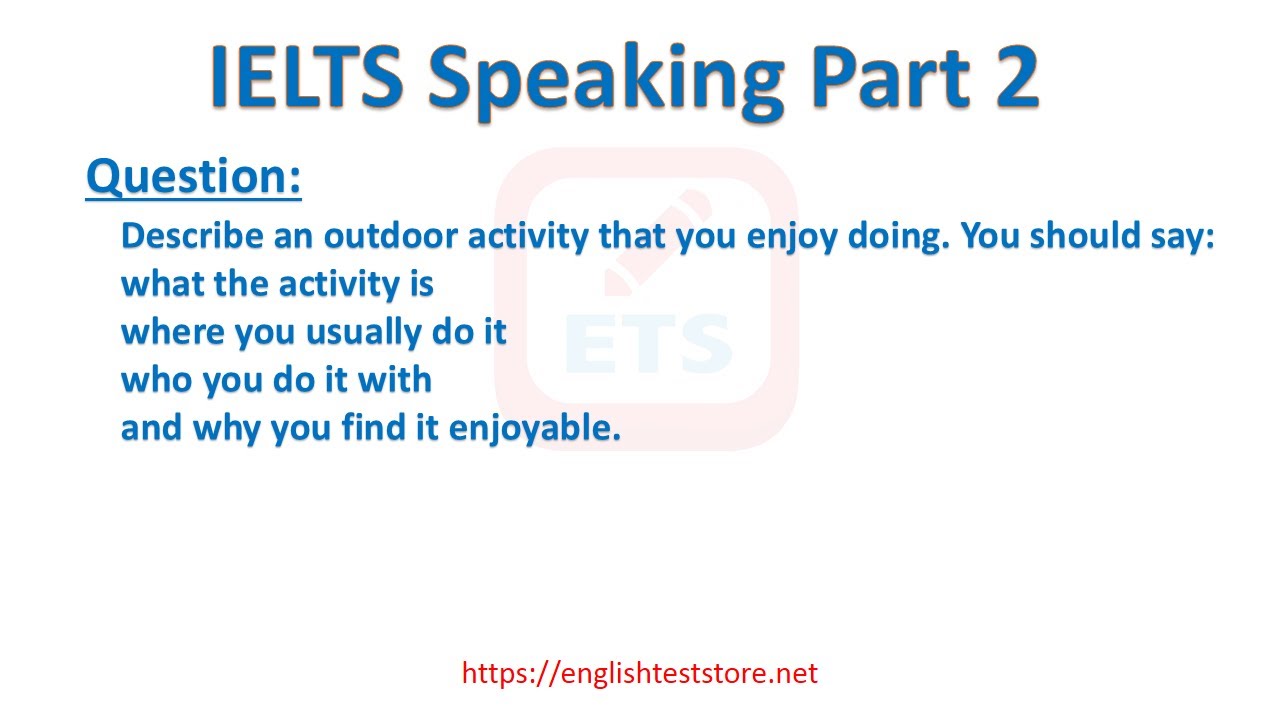
IELTS Speaking Part 2 - Describe an outdoor activity that yo...
14K views · May 11, 2023 englishteststore.net
Describe an outdoor activity that you enjoy doing. You should say: what the activity is where you usually do it who you do it with and why you find it enjoyable. Practice online at https://englishteststore.net/index.php?option=com_content&view=category&id=653&Itemid=1113 - Thank you for watching! Please subscribe, share, and like the video. EnglishTestStore ►https://englishteststore.net/ Facebook ►https://www.facebook.com/englishteststore.net/ Twitter ►https://twitter.com/englishteststor
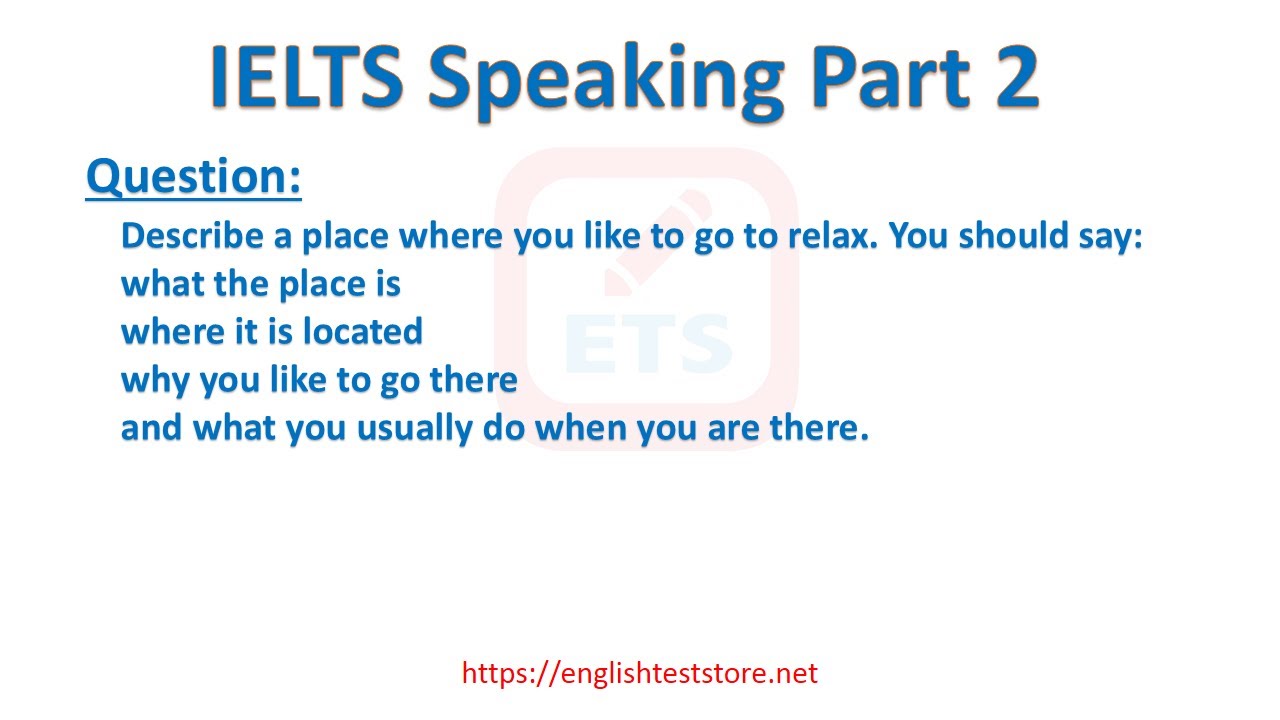
IELTS Speaking Part 2 - Describe a place where you like to g...
59K views · May 11, 2023 englishteststore.net
Describe a place where you like to go to relax. You should say: what the place is where it is located why you like to go there and what you usually do when you are there. Practice online at https://englishteststore.net/index.php?option=com_content&view=category&id=653&Itemid=1113 - Thank you for watching! Please subscribe, share, and like the video. EnglishTestStore ►https://englishteststore.net/ Facebook ►https://www.facebook.com/englishteststore.net/ Twitter ►https://twitter.com/englishteststor
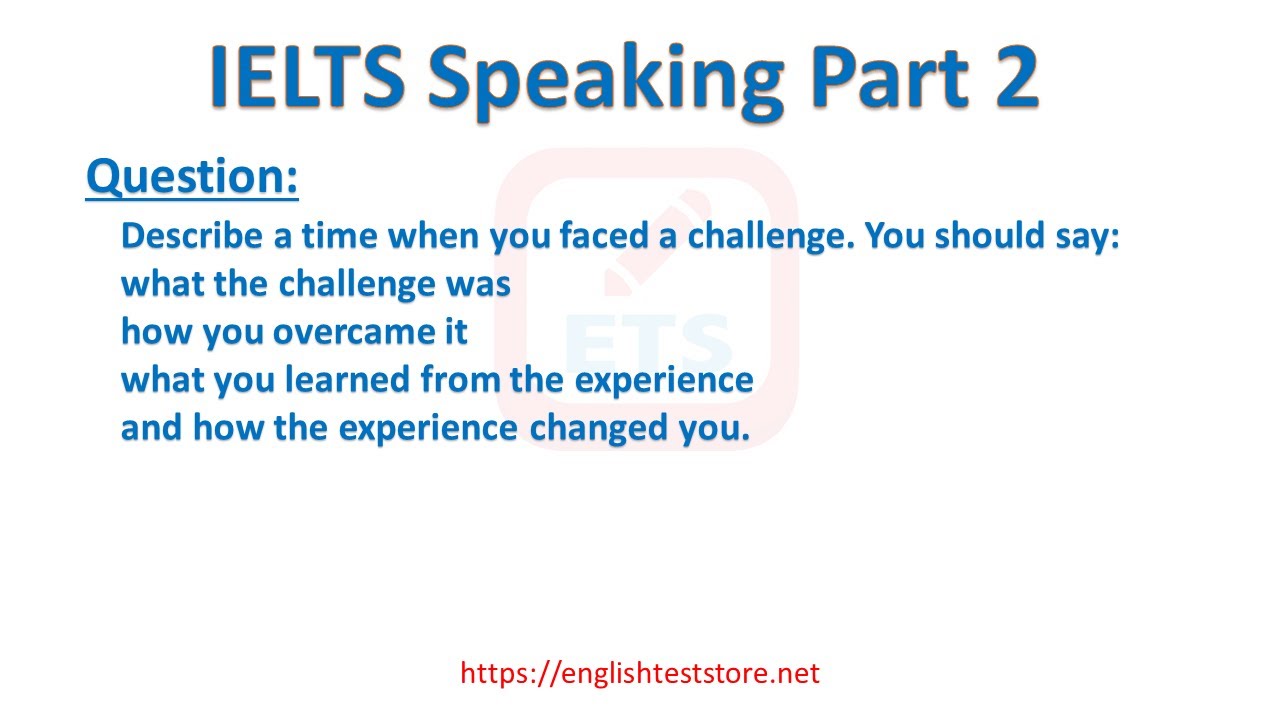
IELTS Speaking Part 2: Describe a time when you faced a chal...
58K views · May 17, 2023 englishteststore.net
Practice online: https://englishteststore.net/index.php?option=com_content&view=category&id=653&Itemid=1113 Describe a time when you faced a challenge. You should say: what the challenge was how you overcame it what you learned from the experience and how the experience changed you. - Thank you for watching! Please subscribe, share, and like the video. #ieltsspeaking #ieltsspeakingpart2 #ieltstest #ielts #ieltspreparation #ieltsexam #ieltslistening #ieltslisteningtest EnglishTestStore ►https://englishteststore.net/ Facebook ►https://www.facebook.com/englishteststore.net/ Twitter ►https://twitter.com/englishteststor
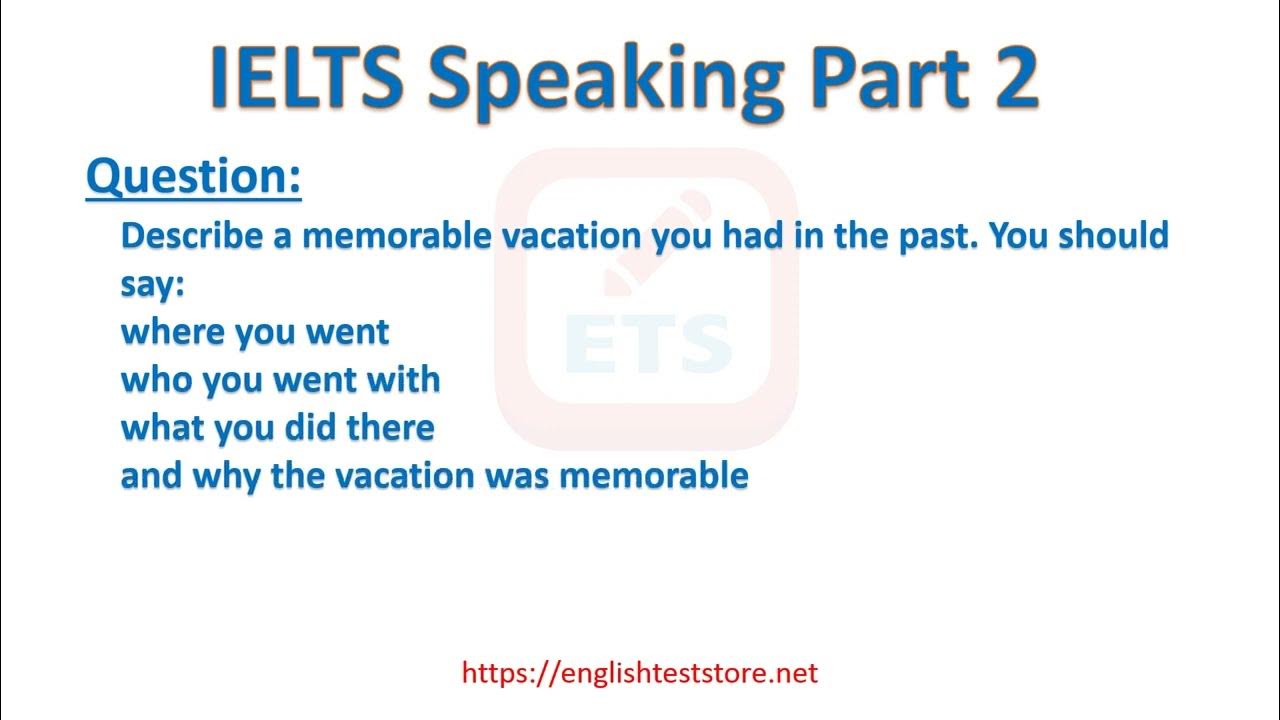
IELTS Speaking Part 2: Describe a memorable vacation you had...
54K views · May 16, 2023 englishteststore.net
Practice online: https://englishteststore.net/index.php?option=com_content&view=category&id=653&Itemid=1113 Describe a memorable vacation you had in the past. You should say: where you went who you went with what you did there and why the vacation was memorable. - Thank you for watching! Please subscribe, share, and like the video. #ieltsspeaking #ieltsspeakingpart2 #ieltstest #ielts #ieltspreparation #ieltsexam #ieltslistening #ieltslisteningtest EnglishTestStore ►https://englishteststore.net/ Facebook ►https://www.facebook.com/englishteststore.net/ Twitter ►https://twitter.com/englishteststor

IELTS Speaking Part 2: Describe a TV show or movie that you ...
22K views · May 13, 2023 englishteststore.net
Practice online: https://englishteststore.net/index.php?option=com_content&view=category&id=653&Itemid=1113 Describe a TV show or movie that you have recently watched. You should say: what the show or movie is what it is about who the actors or characters are and what your opinion of the show or movie is. - Thank you for watching! Please subscribe, share, and like the video. #ieltsspeaking #ieltsspeakingpart2 #ieltstest #ielts #ieltspreparation #ieltsexam #ieltslistening #ieltslisteningtest EnglishTestStore ►https://englishteststore.net/ Facebook ►https://www.facebook.com/englishteststore.net/ Twitter ►https://twitter.com/englishteststor

IELTS Speaking Part 2 - Describe a type of music that you en...
30K views · May 11, 2023 englishteststore.net
Describe a type of music that you enjoy listening to. You should say: what type of music it is why you enjoy listening to it who your favorite artists are and what impact music has on your life. Practice online at https://englishteststore.net/index.php?option=com_content&view=category&id=653&Itemid=1113 - Thank you for watching! Please subscribe, share, and like the video. EnglishTestStore ►https://englishteststore.net/ Facebook ►https://www.facebook.com/englishteststore.net/ Twitter ►https://twitter.com/englishteststor

IELTS Speaking Part 2 - Describe a tradition or festival tha...
71K views · May 11, 2023 englishteststore.net
Describe a tradition or festival that is important in your country. You should say: what the tradition or festival is when it takes place what customs are associated with it and why it is significant to your country's culture. Practice online at https://englishteststore.net/index.php?option=com_content&view=category&id=653&Itemid=1113 - Thank you for watching! Please subscribe, share, and like the video. EnglishTestStore ►https://englishteststore.net/ Facebook ►https://www.facebook.com/englishteststore.net/ Twitter ►https://twitter.com/englishteststor
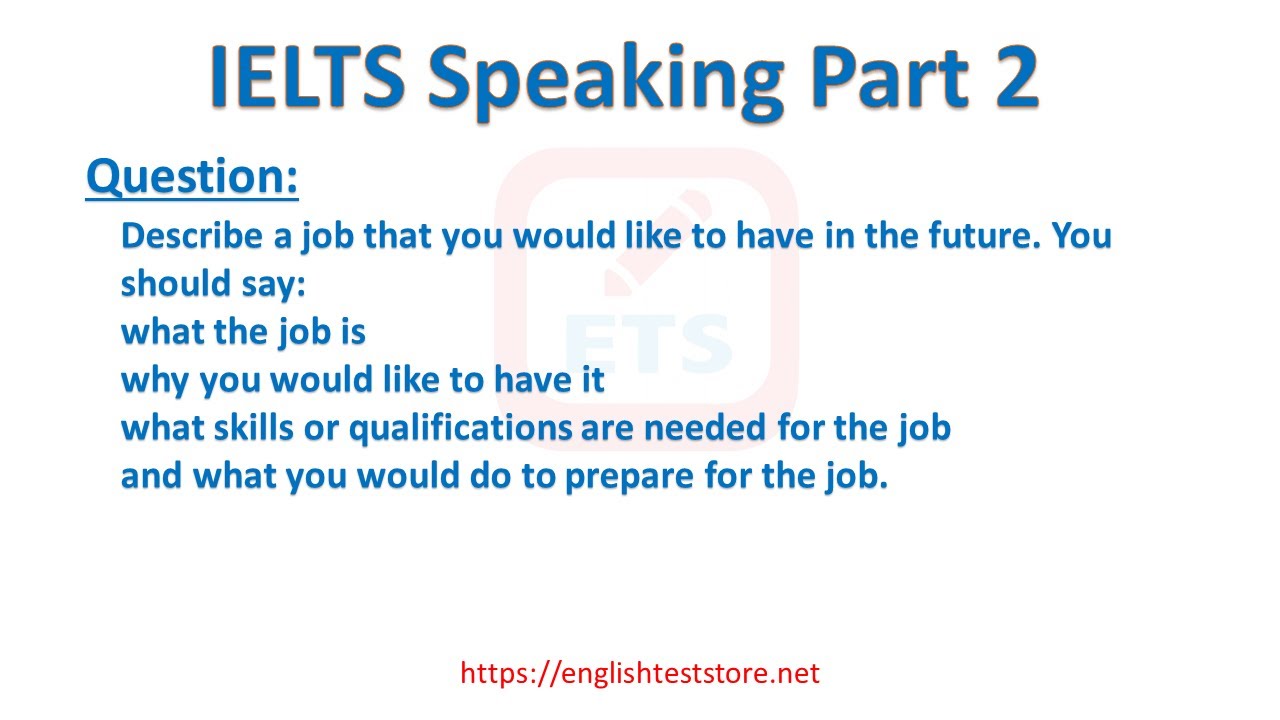
IELTS Speaking Part 2: Describe a job that you would like to...
72K views · Apr 29, 2023 englishteststore.net
Describe a job that you would like to have in the future. You should say: what the job is why you would like to have it what skills or qualifications are needed for the job and what you would do to prepare for the job. Practice online at https://englishteststore.net/index.php?option=com_content&view=category&id=653&Itemid=1113
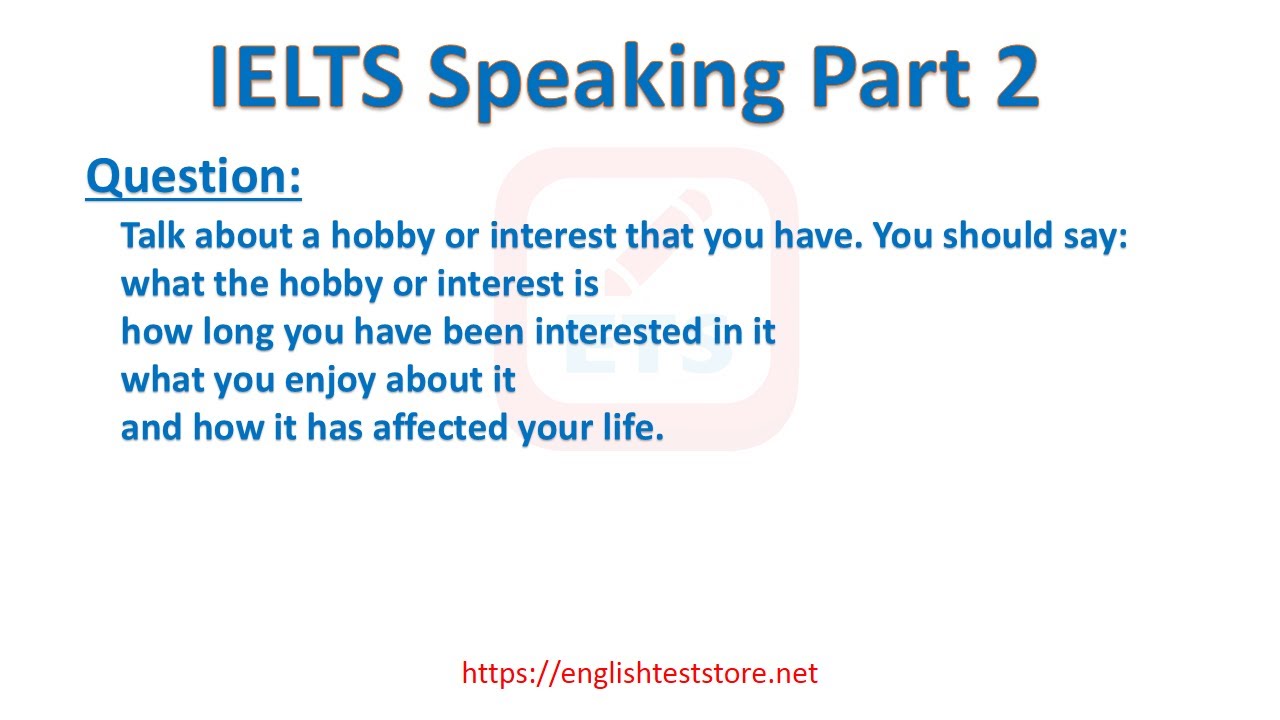
IELTS Speaking Part 2 - Talk about a hobby or interest that ...
15K views · Apr 29, 2023 englishteststore.net
Talk about a hobby or interest that you have. You should say: what the hobby or interest is how long you have been interested in it what you enjoy about it and how it has affected your life. Practice online at https://englishteststore.net/index.php?option=com_content&view=category&id=653&Itemid=1113 - Thank you for watching! Please subscribe, share, and like the video. EnglishTestStore ►https://englishteststore.net/ Facebook ►https://www.facebook.com/englishteststore.net/ Twitter ►https://twitter.com/englishteststor
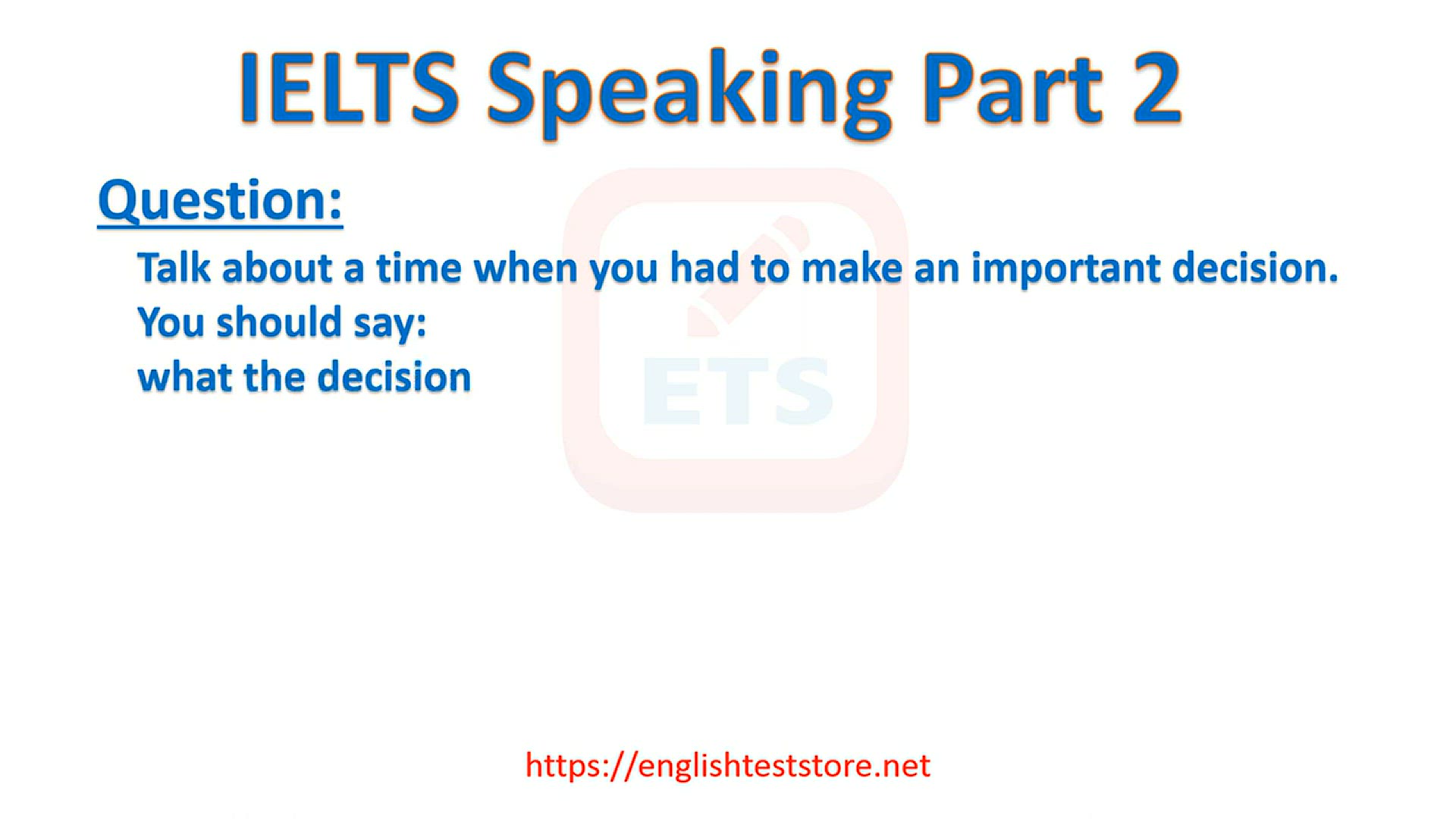
IELTS Speaking Part 2 - Talk about a time when you had to ma...
17K views · May 11, 2023 englishteststore.net
Talk about a time when you had to make an important decision. You should say: what the decision was how you went about making the decision what the outcome was and what you learned from the experience. Practice online at https://englishteststore.net/index.php?option=com_content&view=category&id=653&Itemid=1113 - Thank you for watching! Please subscribe, share, and like the video. EnglishTestStore ►https://englishteststore.net/ Facebook ►https://www.facebook.com/englishteststore.net/ Twitter ►https://twitter.com/englishteststor

IELTS Speaking Part 2 - Describe a place where you like to g...
59K views · May 11, 2023 englishteststore.net
Describe a place where you like to go to relax. You should say: what the place is where it is located why you like to go there and what you usually do when you are there. Practice online at https://englishteststore.net/index.php?option=com_content&view=category&id=653&Itemid=1113 - Thank you for watching! Please subscribe, share, and like the video. EnglishTestStore ►https://englishteststore.net/ Facebook ►https://www.facebook.com/englishteststore.net/ Twitter ►https://twitter.com/englishteststor

IELTS Speaking Part 2 - Describe an outdoor activity that yo...
14K views · May 11, 2023 englishteststore.net
Describe an outdoor activity that you enjoy doing. You should say: what the activity is where you usually do it who you do it with and why you find it enjoyable. Practice online at https://englishteststore.net/index.php?option=com_content&view=category&id=653&Itemid=1113 - Thank you for watching! Please subscribe, share, and like the video. EnglishTestStore ►https://englishteststore.net/ Facebook ►https://www.facebook.com/englishteststore.net/ Twitter ►https://twitter.com/englishteststor
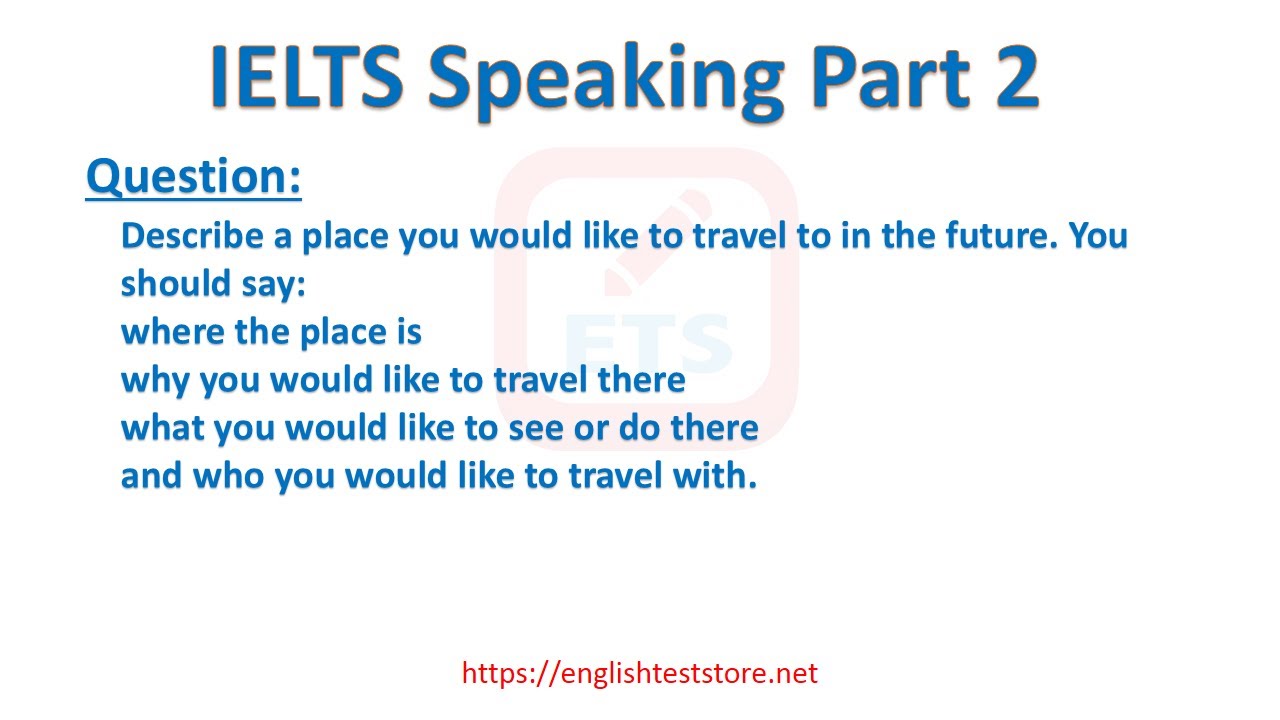
IELTS Speaking Part 2 - Describe a place you would like to t...
72K views · Apr 21, 2023 englishteststore.net
Describe a place you would like to travel to in the future. You should say: where the place is why you would like to travel there what you would like to see or do there and who you would like to travel with. Practice online at https://englishteststore.net/index.php?option=com_content&view=category&id=653&Itemid=1113 - Thank you for watching! Please subscribe, share, and like the video. EnglishTestStore ►https://englishteststore.net/ Facebook ►https://www.facebook.com/englishteststore.net/ Twitter ►https://twitter.com/englishteststor
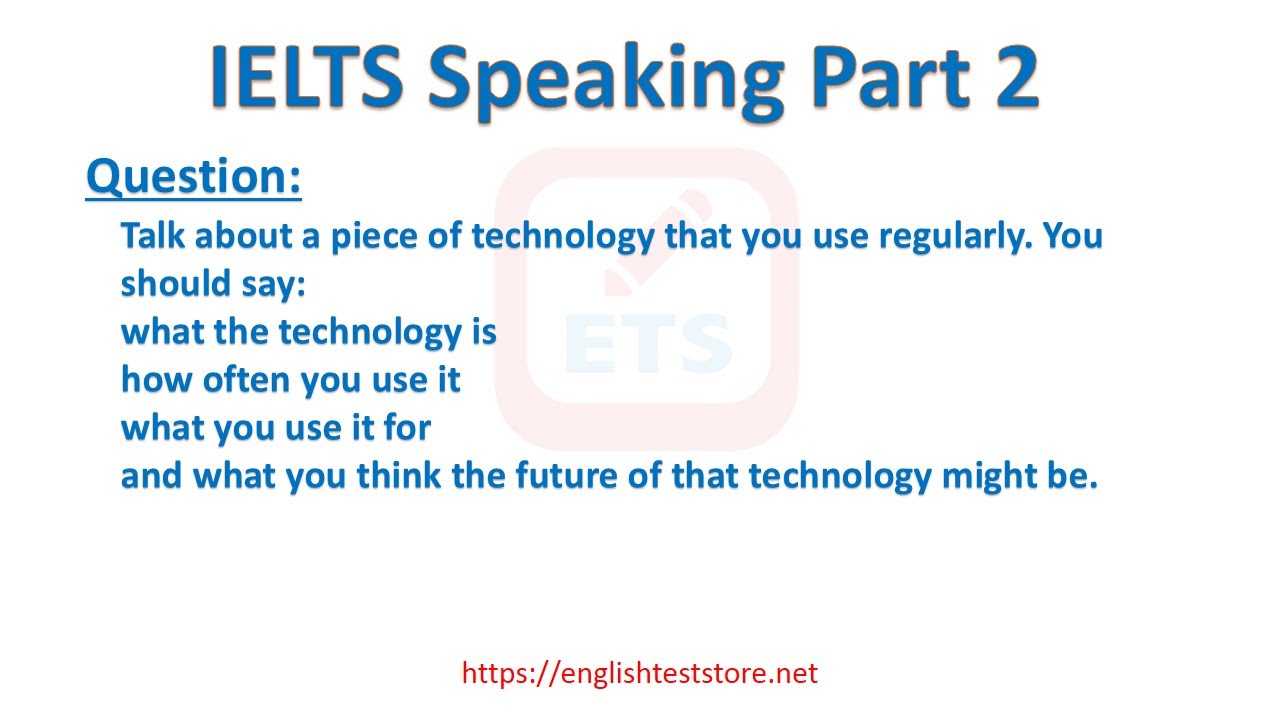
IELTS Speaking Part 2 - Talk about a piece of technology tha...
43K views · Apr 24, 2023 englishteststore.net
Talk about a piece of technology that you use regularly. You should say: what the technology is how often you use it what you use it for and what you think the future of that technology might be. Practice online at https://englishteststore.net/index.php?option=com_content&view=category&id=653&Itemid=1113 - Thank you for watching! Please subscribe, share, and like the video. EnglishTestStore ►https://englishteststore.net/ Facebook ►https://www.facebook.com/englishteststore.net/ Twitter ►https://twitter.com/englishteststor
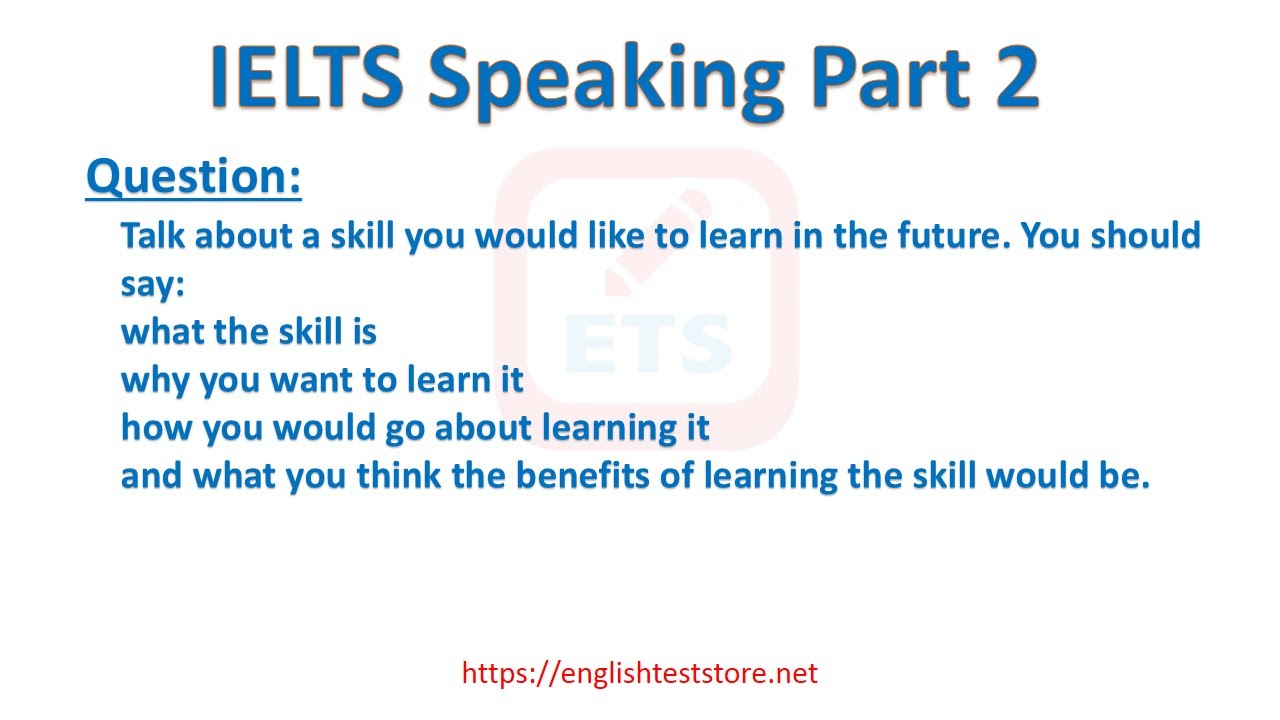
IELTS Speaking Part 2 - Talk about a skill you would like to...
34K views · Apr 24, 2023 englishteststore.net
Talk about a skill you would like to learn in the future. You should say: what the skill is why you want to learn it how you would go about learning it and what you think the benefits of learning the skill would be. Practice online at https://englishteststore.net/index.php?option=com_content&view=category&id=653&Itemid=1113 - Thank you for watching! Please subscribe, share, and like the video. EnglishTestStore ►https://englishteststore.net/ Facebook ►https://www.facebook.com/englishteststore.net/ Twitter ►https://twitter.com/englishteststor
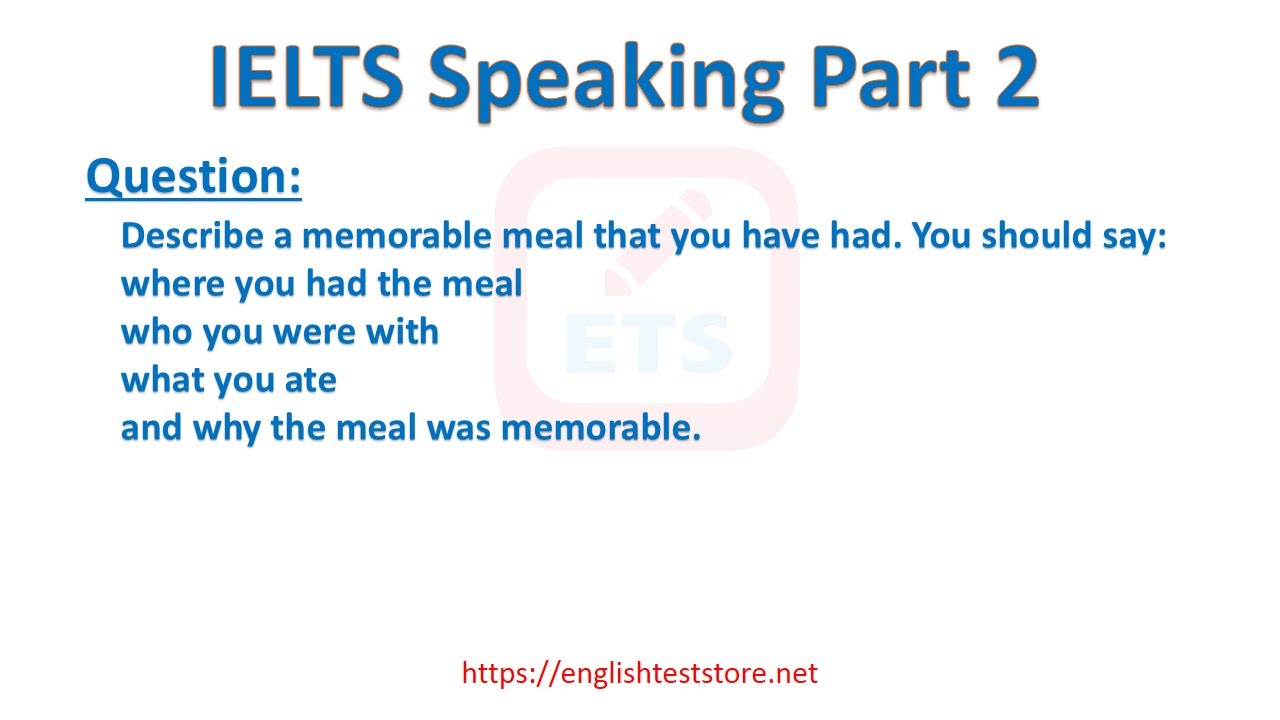
IELTS Speaking Part 2 - Describe a memorable meal that you h...
37K views · Apr 25, 2023 englishteststore.net
Describe a memorable meal that you have had. You should say: where you had the meal who you were with what you ate and why the meal was memorable. Practice online at https://englishteststore.net/index.php?option=com_content&view=category&id=653&Itemid=1113 - Thank you for watching! Please subscribe, share, and like the video. EnglishTestStore ►https://englishteststore.net/ Facebook ►https://www.facebook.com/englishteststore.net/ Twitter ►https://twitter.com/englishteststor
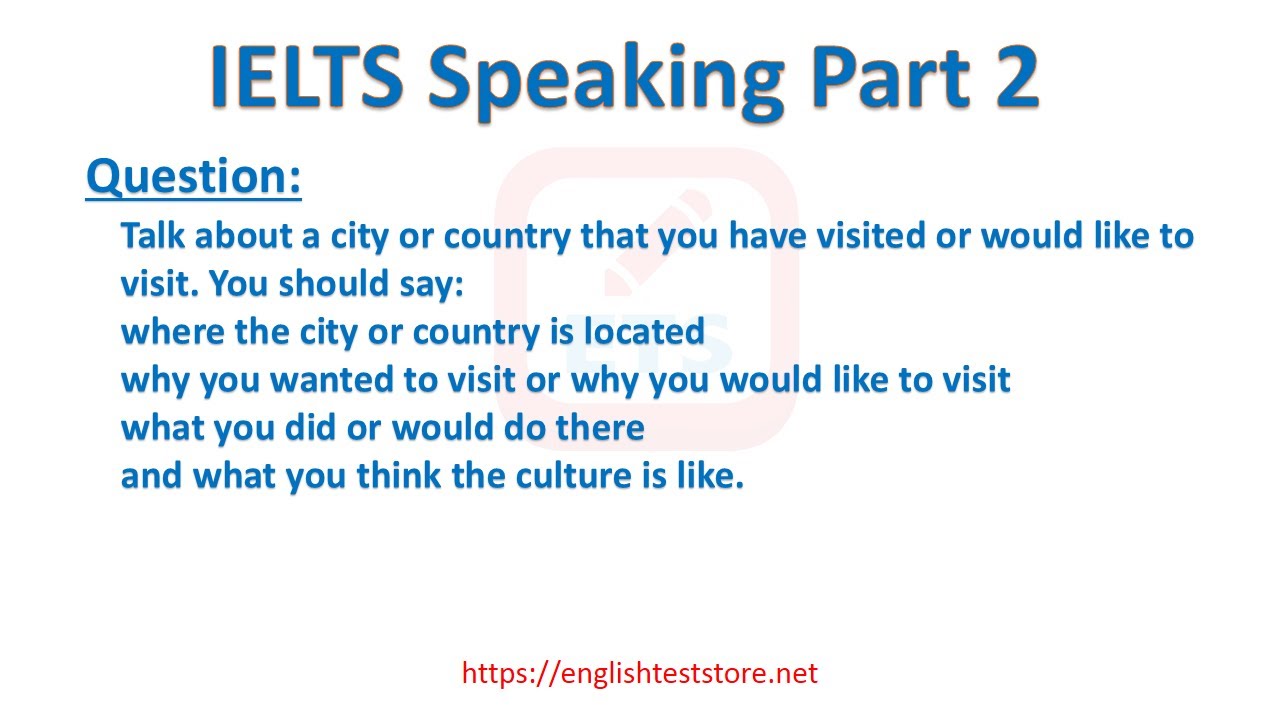
IELTS Speaking Part 2 - Talk about a city or country that yo...
14K views · Apr 27, 2023 englishteststore.net
Talk about a city or country that you have visited or would like to visit. You should say: where the city or country is located why you wanted to visit or why you would like to visit what you did or would do there and what you think the culture is like. Practice online at https://englishteststore.net/index.php?option=com_content&view=category&id=653&Itemid=1113 - Thank you for watching! Please subscribe, share, and like the video. EnglishTestStore ►https://englishteststore.net/ Facebook ►https://www.facebook.com/englishteststore.net/ Twitter ►https://twitter.com/englishteststor

IELTS Speaking Part 2 - Describe a memorable meal that you h...
24K views · Mar 28, 2023 englishteststore.net
IELTS Speaking Part 2 - Describe a memorable meal that you have had. You should say: where you had the meal who you were with what you ate and why the meal was memorable.

IELTS Speaking Part 2: Describe a person who has had a signi...
41K views · Apr 14, 2023 englishteststore.net
Describe a person who has had a significant influence on your life. You should say: who the person is how you know them what they did to influence you and how your life has changed because of them. Practice online at https://englishteststore.net/index.php?option=com_content&view=category&id=653&Itemid=1113 - Thank you for watching! Please subscribe, share, and like the video. EnglishTestStore ►https://englishteststore.net/ Facebook ►https://www.facebook.com/englishteststore.net/ Twitter ►https://twitter.com/englishteststor
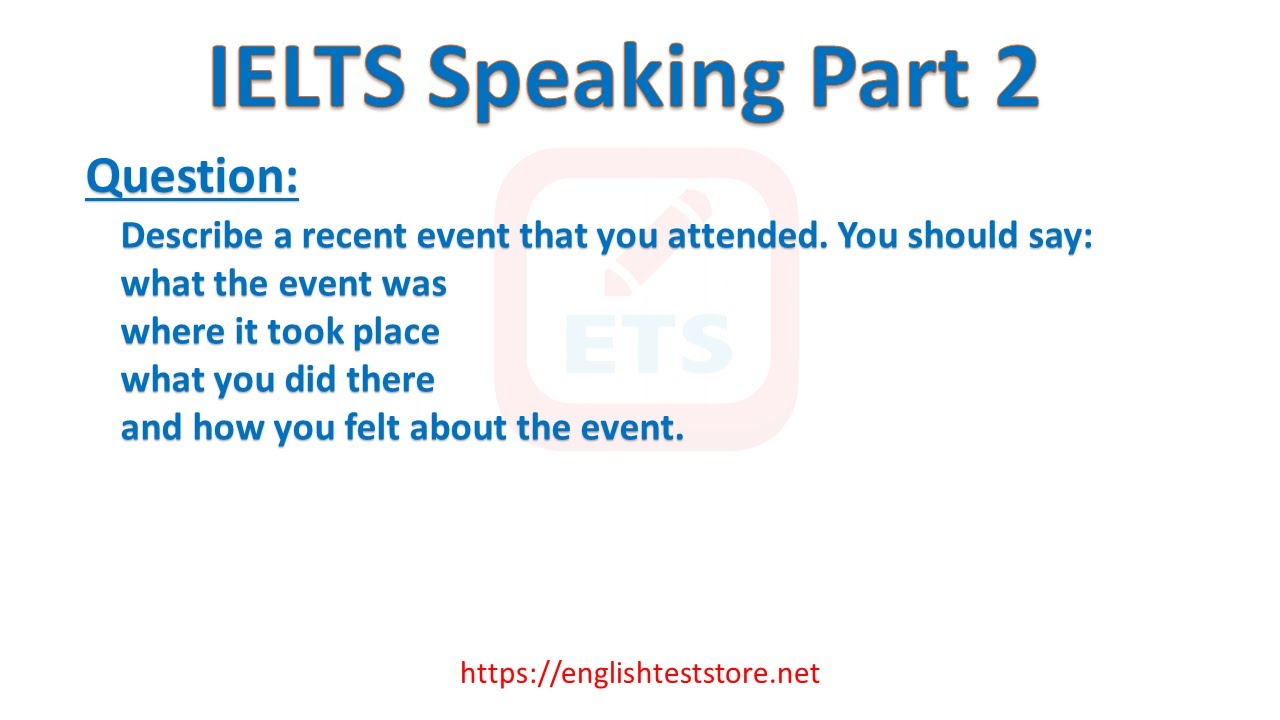
IELTS Speaking Part 2 - Describe a recent event that you att...
197K views · Apr 15, 2023 englishteststore.net
Describe a recent event that you attended. You should say: what the event was where it took place what you did there and how you felt about the event. - Thank you for watching! Please subscribe, share, and like the video. EnglishTestStore ►https://englishteststore.net/ Facebook ►https://www.facebook.com/englishteststore.net/ Twitter ►https://twitter.com/englishteststor
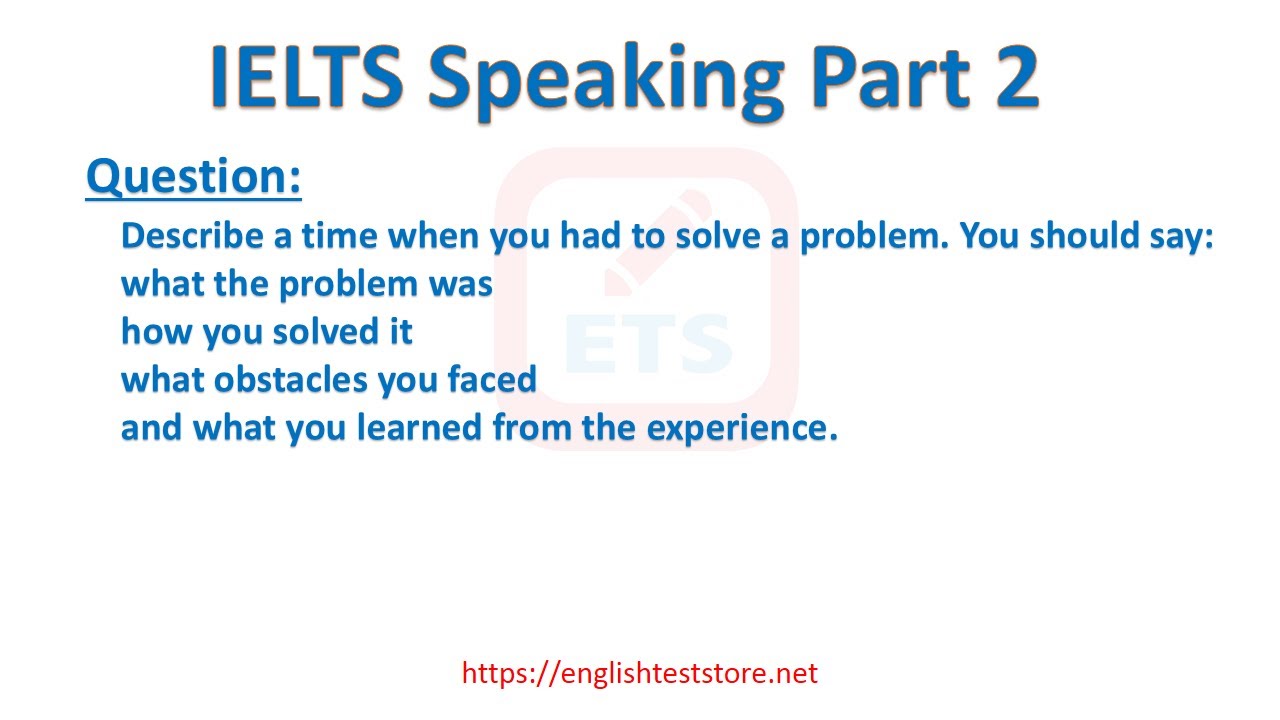
IELTS Speaking Part 2 - Describe a time when you had to solv...
124K views · Apr 16, 2023 englishteststore.net
-Describe a time when you had to solve a problem. You should say: what the problem was how you solved it what obstacles you faced and what you learned from the experience. Practice online at https://englishteststore.net/index.php?option=com_content&view=category&id=653&Itemid=1113#gsc.tab=0 - Thank you for watching! Please subscribe, share, and like the video. EnglishTestStore ►https://englishteststore.net/ Facebook ►https://www.facebook.com/englishteststore.net/ Twitter ►https://twitter.com/englishteststor
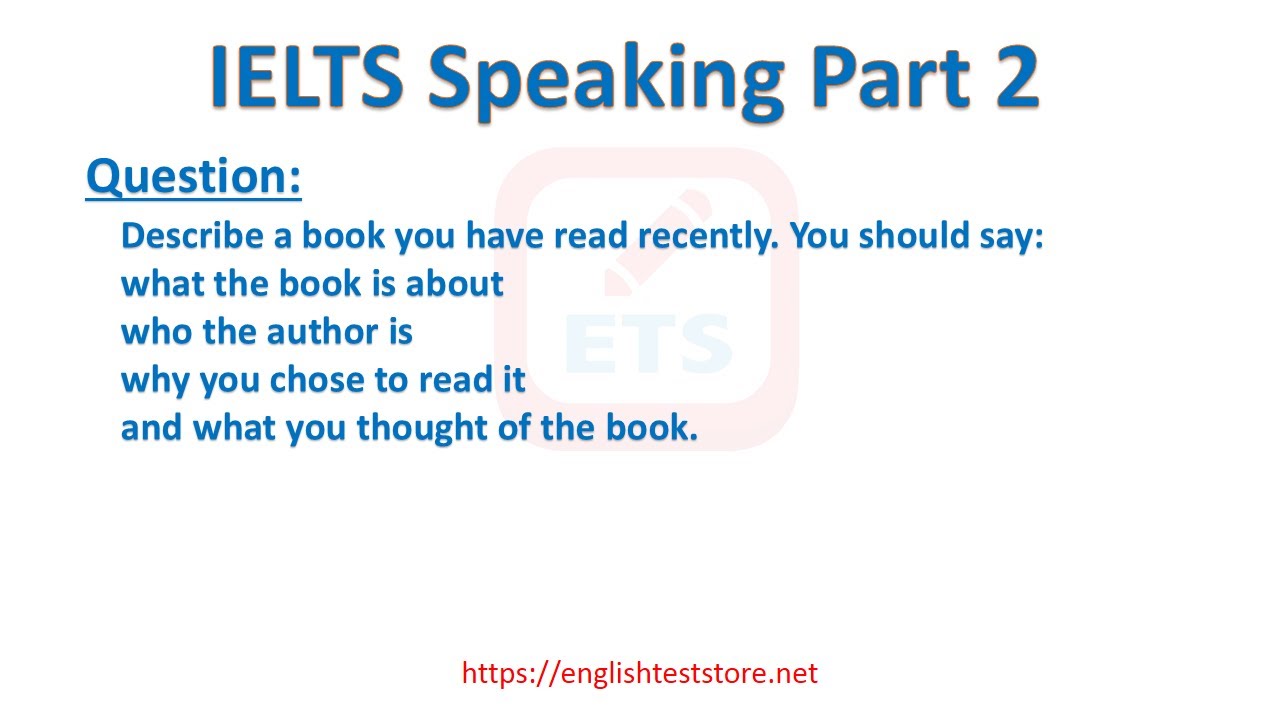
IELTS Speaking Part 2 - Describe a book you have read recent...
88K views · Apr 18, 2023 englishteststore.net
Describe a book you have read recently. You should say: what the book is about who the author is why you chose to read it and what you thought of the book. Practice online at https://englishteststore.net/index.php?option=com_content&view=category&id=653&Itemid=1113 - Thank you for watching! Please subscribe, share, and like the video. EnglishTestStore ►https://englishteststore.net/ Facebook ►https://www.facebook.com/englishteststore.net/ Twitter ►https://twitter.com/englishteststor

IELTS Speaking Part 2 - Describe a public park or natural ar...
32K views · Mar 16, 2023 englishteststore.net
IELTS Speaking Part 2 - Describe a public park or natural area you enjoy visiting

IELTS Speaking Part 2 - Describe a favorite activity that yo...
48K views · Mar 17, 2023 englishteststore.net
IELTS Speaking Part 2 - Describe a favorite activity that you enjoy doing during your free time

IELTS Speaking Part 2 - Describe a place that you have visit...
25K views · Mar 17, 2023 englishteststore.net
Describe a place that you have visited and would like to go back to. You should say: where the place is located when you visited it what you did there and why you would like to go back.

IELTS Speaking Part 2 - Describe an event in your life that ...
46K views · Mar 22, 2023 englishteststore.net
Describe an event in your life that made you happy. You should say: what the event was when it happened why it made you happy and how you celebrated the event. Practice at https://englishteststore.net/index.php?option=com_content&view=article&id=17777:ielts-speaking-part-2-describe-an-event-in-your-life-that-made-you-happy&catid=653&Itemid=1113

IELTS Speaking Part 2 - Describe a job that you would like t...
37K views · Mar 22, 2023 englishteststore.net
Describe a job that you would like to have in the future. You should say: what the job is why you would like to have it what skills or qualifications are needed for the job and what you would do to prepare for the job.
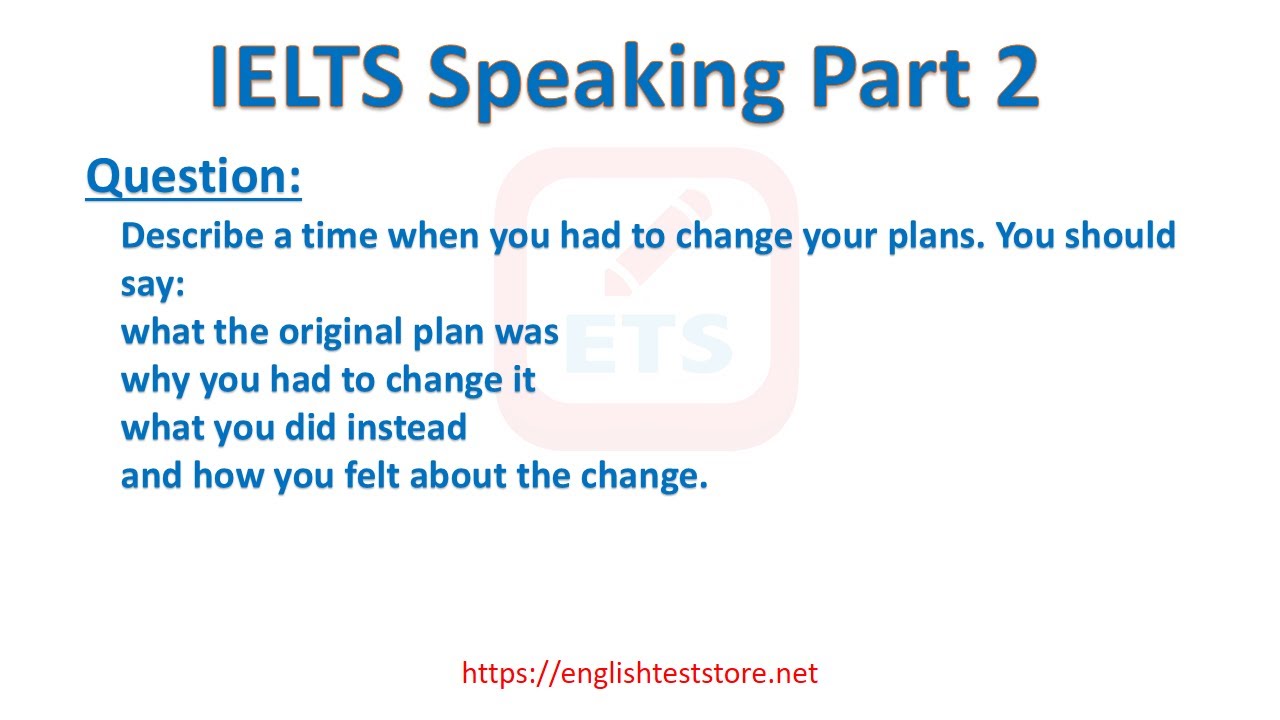
IELTS Speaking Part 2: Describe a time when you had to chang...
28K views · Jul 2, 2023 englishteststore.net
Practice online: https://englishteststore.net/index.php?option=com_content&view=category&id=653&Itemid=1113 Describe a time when you had to change your plans. You should say: what the original plan was why you had to change it what you did instead and how you felt about the change. - Thank you for watching! Please subscribe, share, and like the video. #ieltsspeaking #ieltsspeakingpart2 #ieltstest #ielts #ieltspreparation #ieltsexam #ieltslistening #ieltslisteningtest EnglishTestStore ►https://englishteststore.net/ Facebook ►https://www.facebook.com/englishteststore.net/ Twitter ►https://twitter.com/englishteststor
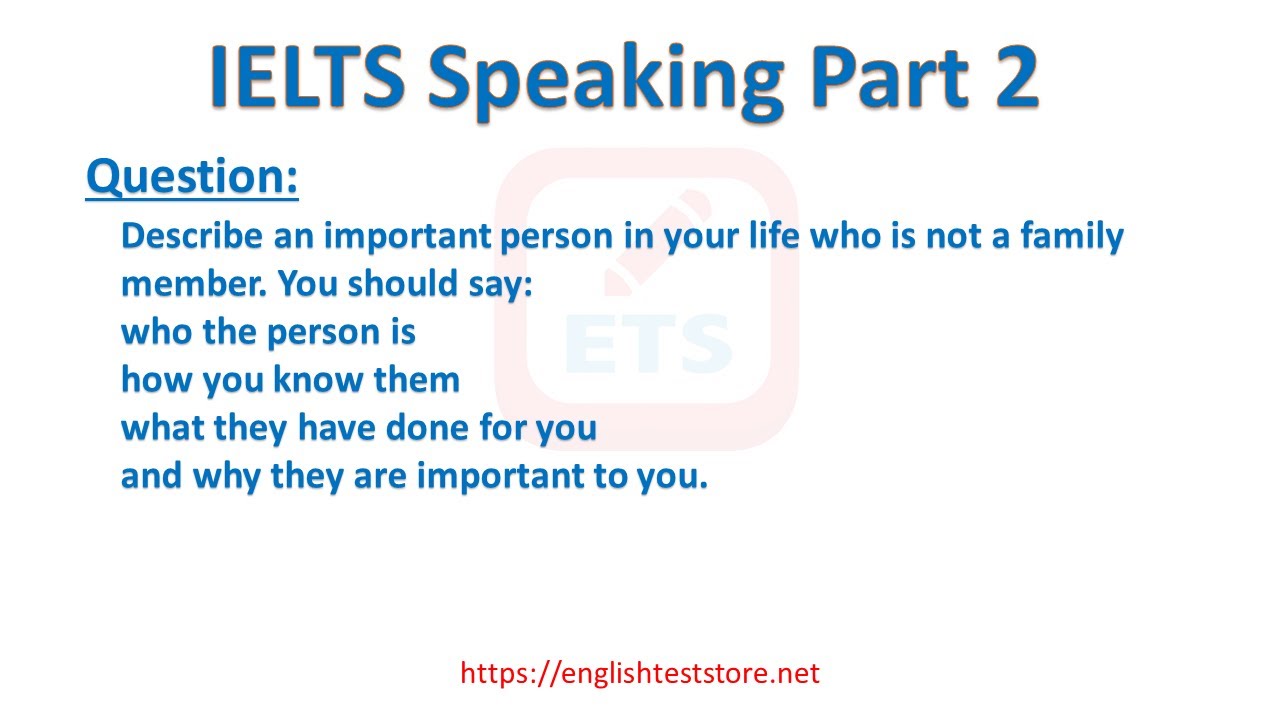
IELTS Speaking Part 2: Describe an important person in your ...
25K views · Jun 28, 2023 englishteststore.net
Practice online: https://englishteststore.net/index.php?option=com_content&view=category&id=653&Itemid=1113 Describe an important person in your life who is not a family member. You should say: who the person is how you know them what they have done for you and why they are important to you. - Thank you for watching! Please subscribe, share, and like the video. #ieltsspeaking #ieltsspeakingpart2 #ieltstest #ielts #ieltspreparation #ieltsexam #ieltslistening #ieltslisteningtest EnglishTestStore ►https://englishteststore.net/ Facebook ►https://www.facebook.com/englishteststore.net/ Twitter ►https://twitter.com/englishteststor
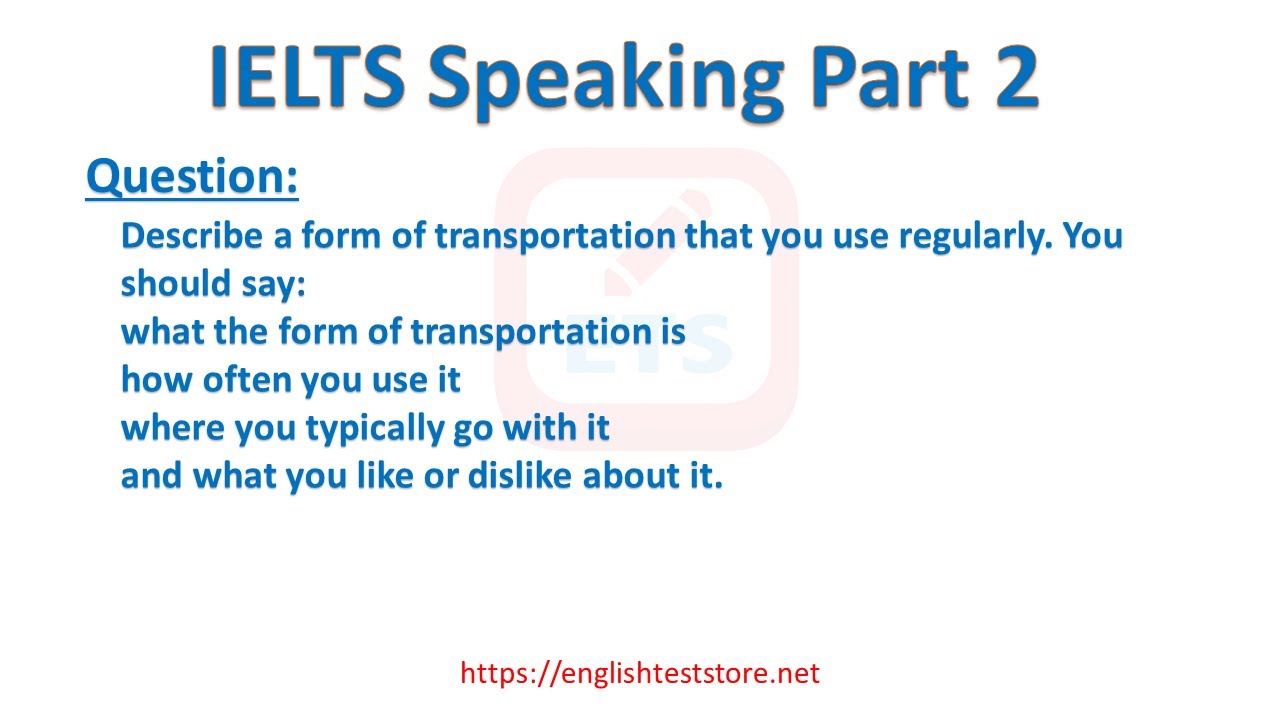
IELTS Speaking Part 2: Describe a form of transportation tha...
14K views · Jun 26, 2023 englishteststore.net
Practice online: https://englishteststore.net/index.php?option=com_content&view=category&id=653&Itemid=1113 Describe a form of transportation that you use regularly. You should say: what the form of transportation is how often you use it where you typically go with it and what you like or dislike about it. - Thank you for watching! Please subscribe, share, and like the video. #ieltsspeaking #ieltsspeakingpart2 #ieltstest #ielts #ieltspreparation #ieltsexam #ieltslistening #ieltslisteningtest EnglishTestStore ►https://englishteststore.net/ Facebook ►https://www.facebook.com/englishteststore.net/ Twitter ►https://twitter.com/englishteststor
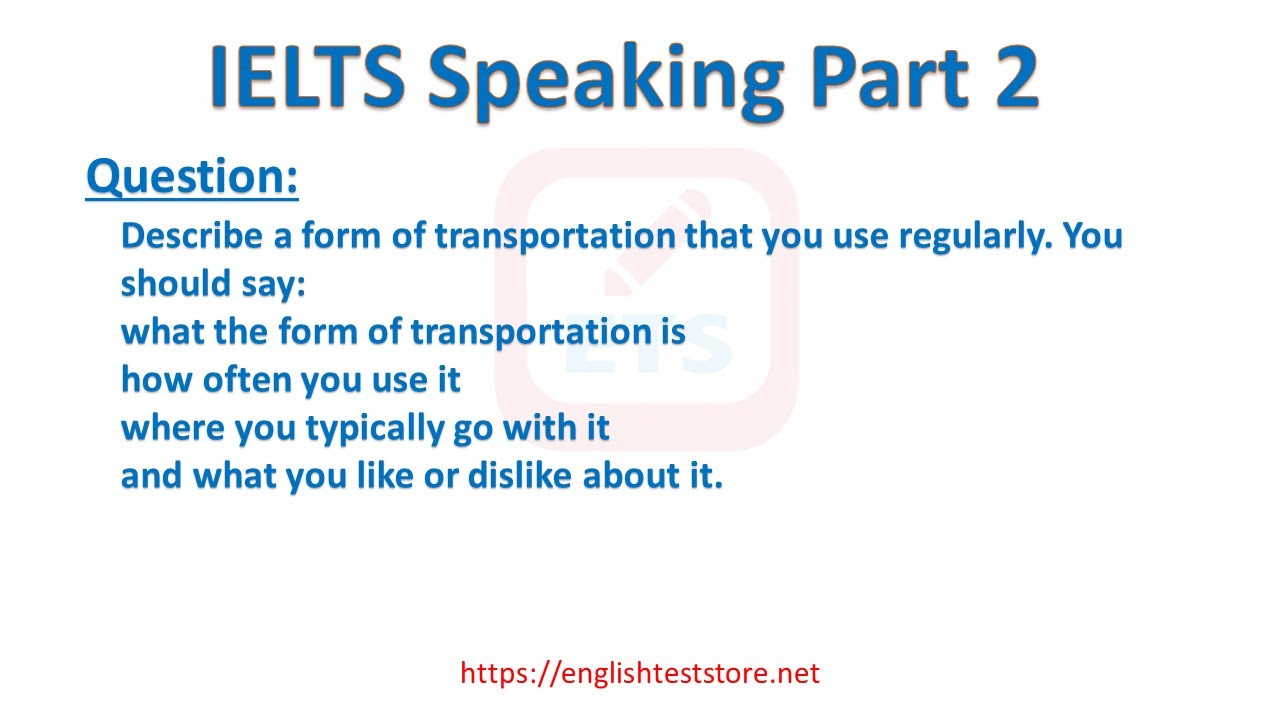
IELTS Speaking Part 2: Describe a form of transportation tha...
11K views · Jun 26, 2023 englishteststore.net
Practice online: https://englishteststore.net/index.php?option=com_content&view=category&id=653&Itemid=1113 Describe a form of transportation that you use regularly. You should say: what the form of transportation is how often you use it where you typically go with it and what you like or dislike about it. - Thank you for watching! Please subscribe, share, and like the video. #ieltsspeaking #ieltsspeakingpart2 #ieltstest #ielts #ieltspreparation #ieltsexam #ieltslistening #ieltslisteningtest EnglishTestStore ►https://englishteststore.net/ Facebook ►https://www.facebook.com/englishteststore.net/ Twitter ►https://twitter.com/englishteststor
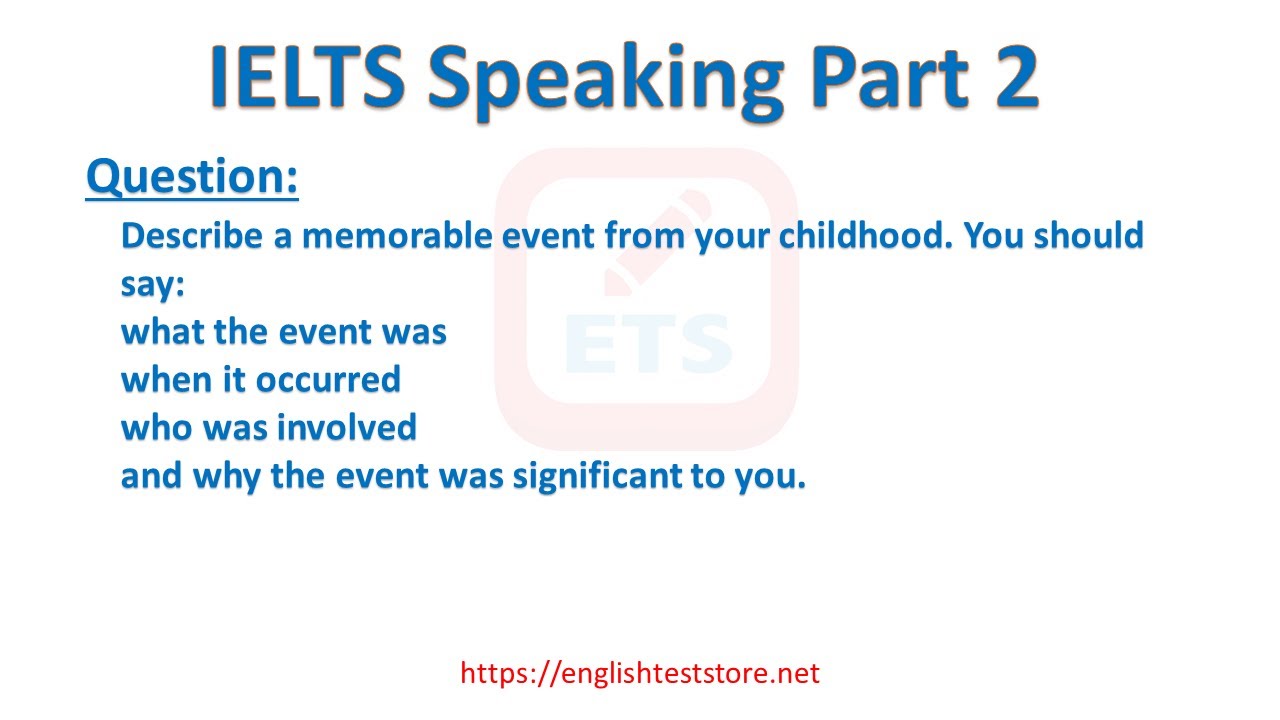
IELTS Speaking Part 2: Describe a memorable event from your ...
28K views · Jun 26, 2023 englishteststore.net
Practice online: https://englishteststore.net/index.php?option=com_content&view=category&id=653&Itemid=1113 Describe a memorable event from your childhood. You should say: what the event was when it occurred who was involved and why the event was significant to you. - Thank you for watching! Please subscribe, share, and like the video. #ieltsspeaking #ieltsspeakingpart2 #ieltstest #ielts #ieltspreparation #ieltsexam #ieltslistening #ieltslisteningtest EnglishTestStore ►https://englishteststore.net/ Facebook ►https://www.facebook.com/englishteststore.net/ Twitter ►https://twitter.com/englishteststor
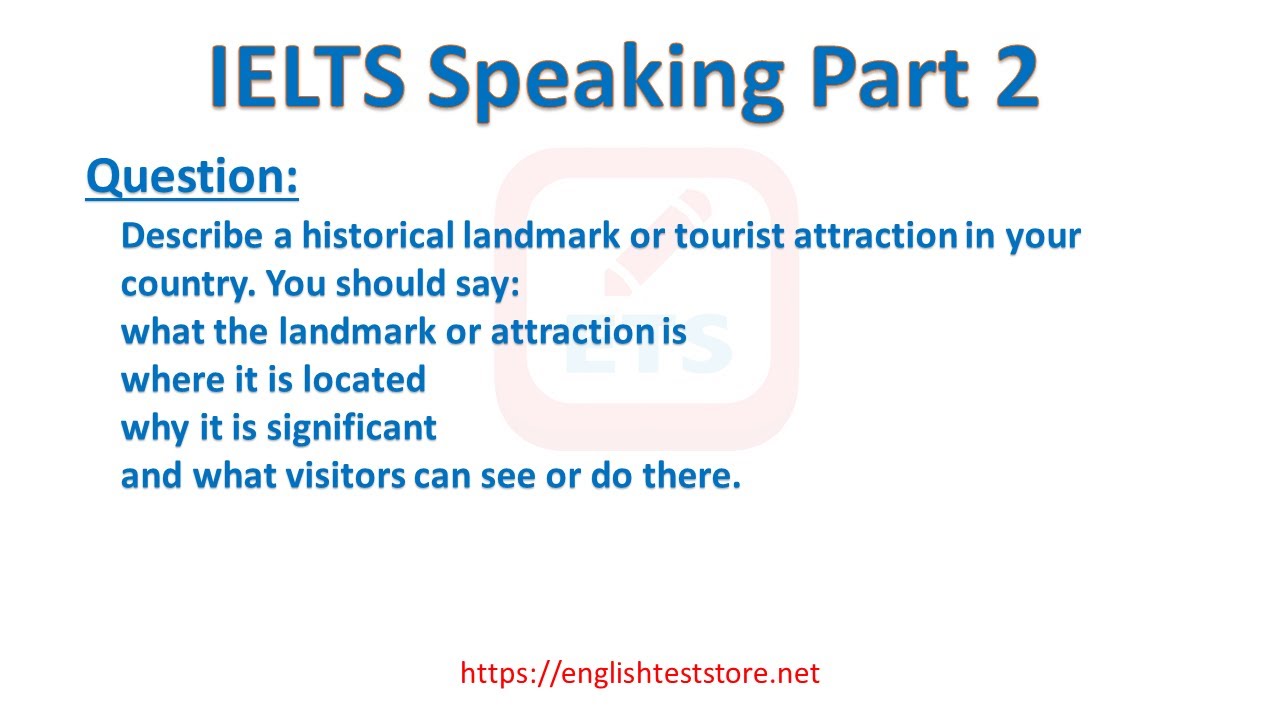
IELTS Speaking Part 2: Describe a historical landmark or tou...
22K views · Jun 24, 2023 englishteststore.net
Practice online: https://englishteststore.net/index.php?option=com_content&view=category&id=653&Itemid=1113 Describe a historical landmark or tourist attraction in your country. You should say: what the landmark or attraction is where it is located why it is significant and what visitors can see or do there. - Thank you for watching! Please subscribe, share, and like the video. #ieltsspeaking #ieltsspeakingpart2 #ieltstest #ielts #ieltspreparation #ieltsexam #ieltslistening #ieltslisteningtest EnglishTestStore ►https://englishteststore.net/ Facebook ►https://www.facebook.com/englishteststore.net/ Twitter ►https://twitter.com/englishteststor
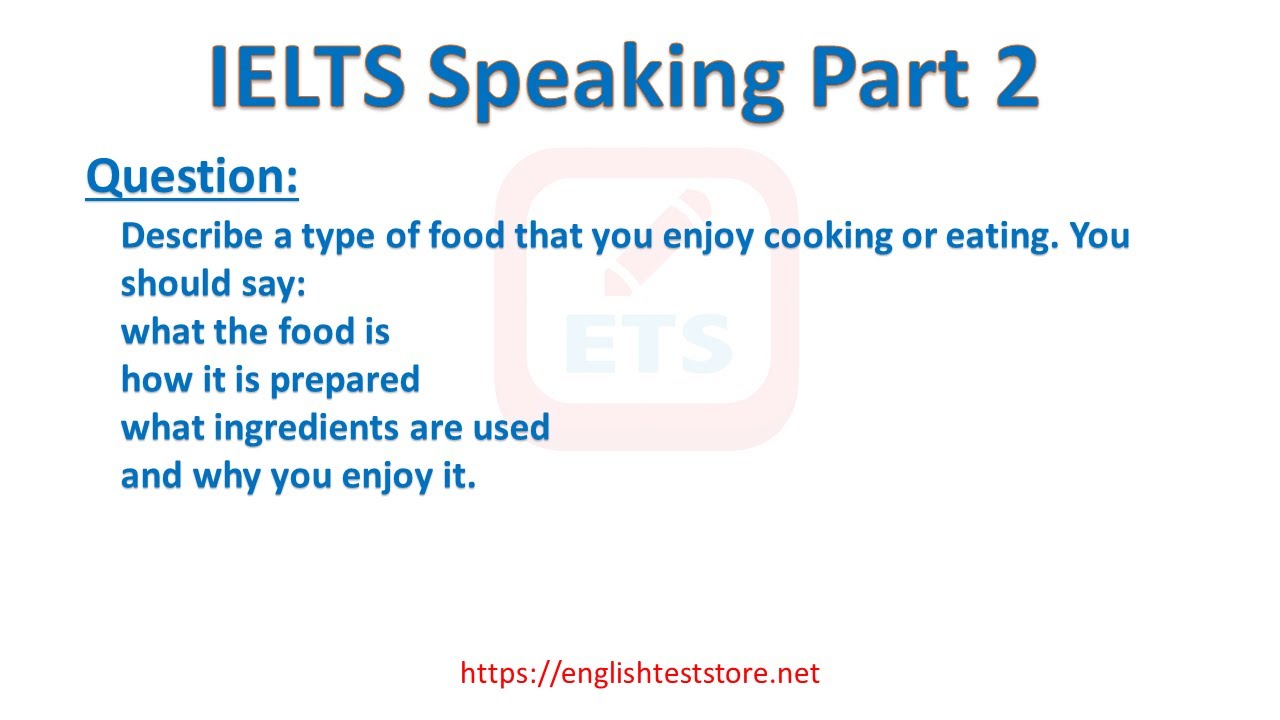
IELTS Speaking Part 2: Describe a type of food that you enjo...
19K views · Jun 24, 2023 englishteststore.net
Practice online: https://englishteststore.net/index.php?option=com_content&view=category&id=653&Itemid=1113 Describe a type of food that you enjoy cooking or eating. You should say: what the food is how it is prepared what ingredients are used and why you enjoy it. - Thank you for watching! Please subscribe, share, and like the video. #ieltsspeaking #ieltsspeakingpart2 #ieltstest #ielts #ieltspreparation #ieltsexam #ieltslistening #ieltslisteningtest EnglishTestStore ►https://englishteststore.net/ Facebook ►https://www.facebook.com/englishteststore.net/ Twitter ►https://twitter.com/englishteststor
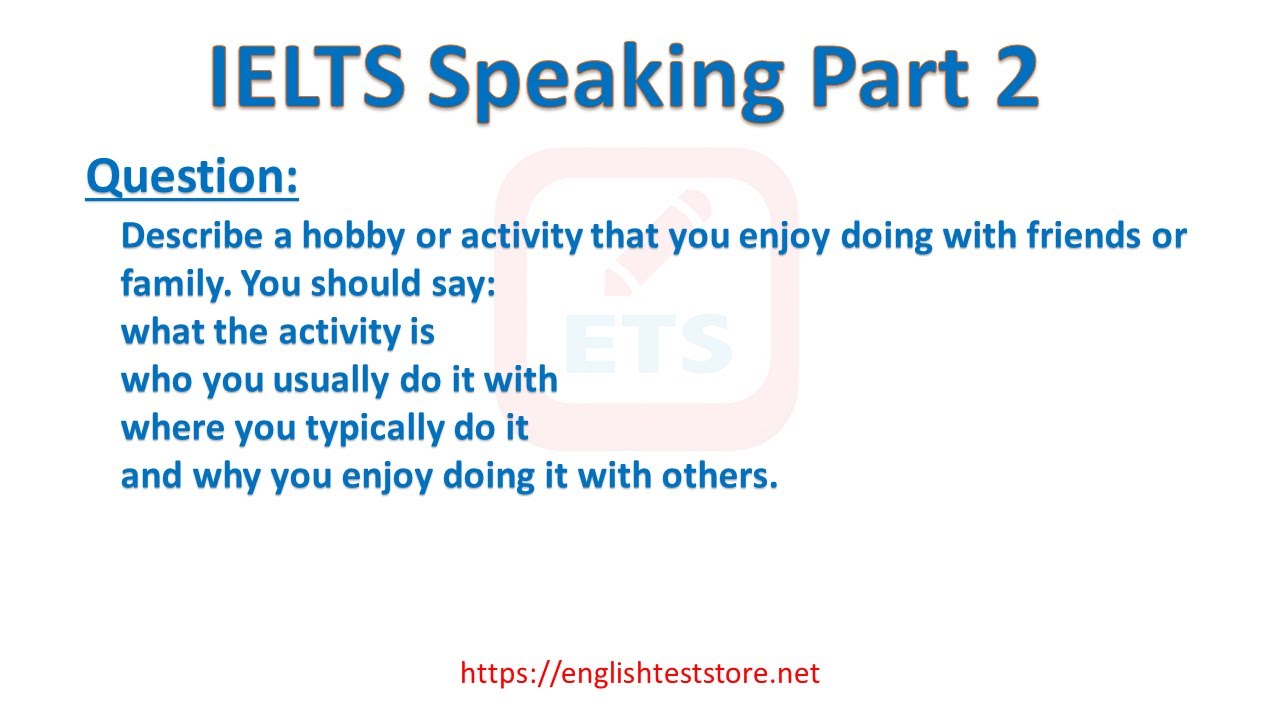
IELTS Speaking Part 2: Describe a hobby or activity that you...
44K views · Jun 24, 2023 englishteststore.net
Practice online: https://englishteststore.net/index.php?option=com_content&view=category&id=653&Itemid=1113 Describe a hobby or activity that you enjoy doing with friends or family. You should say: what the activity is who you usually do it with where you typically do it and why you enjoy doing it with others. - Thank you for watching! Please subscribe, share, and like the video. #ieltsspeaking #ieltsspeakingpart2 #ieltstest #ielts #ieltspreparation #ieltsexam #ieltslistening #ieltslisteningtest EnglishTestStore ►https://englishteststore.net/ Facebook ►https://www.facebook.com/englishteststore.net/ Twitter ►https://twitter.com/englishteststor
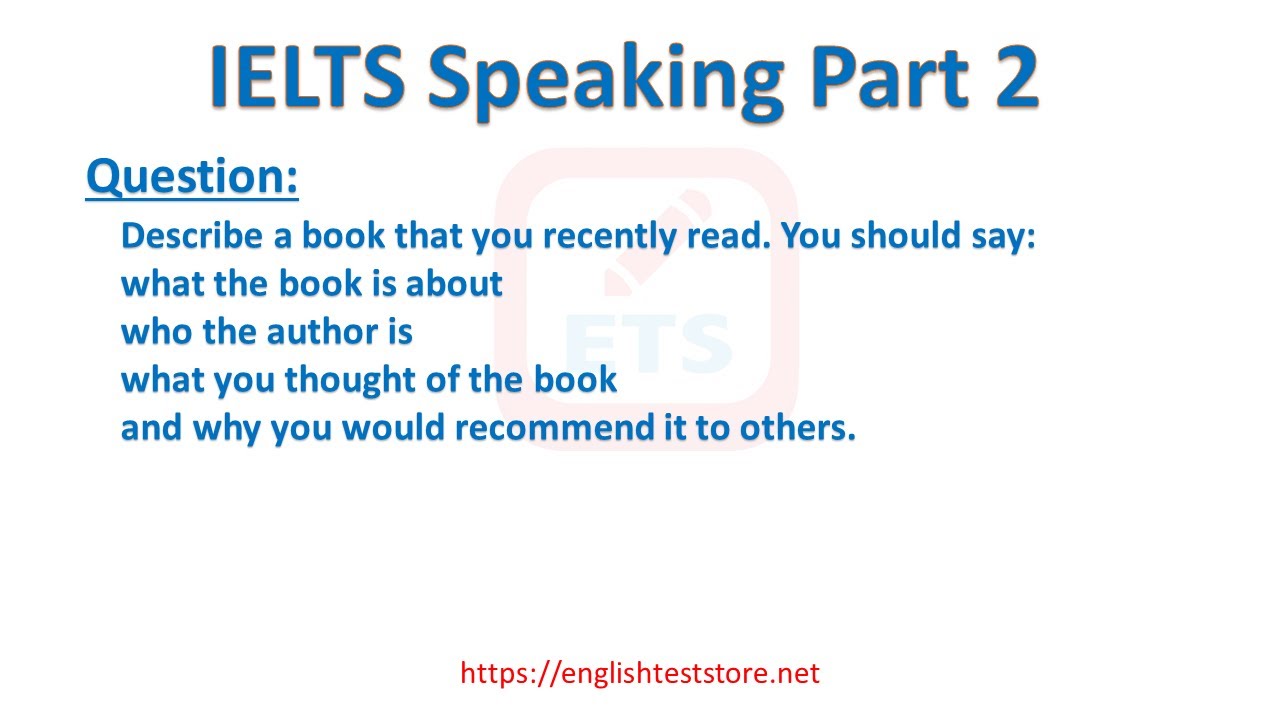
IELTS Speaking Part 2: Describe a book that you recently rea...
18K views · Jun 4, 2023 englishteststore.net
Practice online: https://englishteststore.net/index.php?option=com_content&view=category&id=653&Itemid=1113 Describe a book that you recently read. You should say: what the book is about who the author is what you thought of the book and why you would recommend it to others. - Thank you for watching! Please subscribe, share, and like the video. #ieltsspeaking #ieltsspeakingpart2 #ieltstest #ielts #ieltspreparation #ieltsexam #ieltslistening #ieltslisteningtest EnglishTestStore ►https://englishteststore.net/ Facebook ►https://www.facebook.com/englishteststore.net/ Twitter ►https://twitter.com/englishteststor
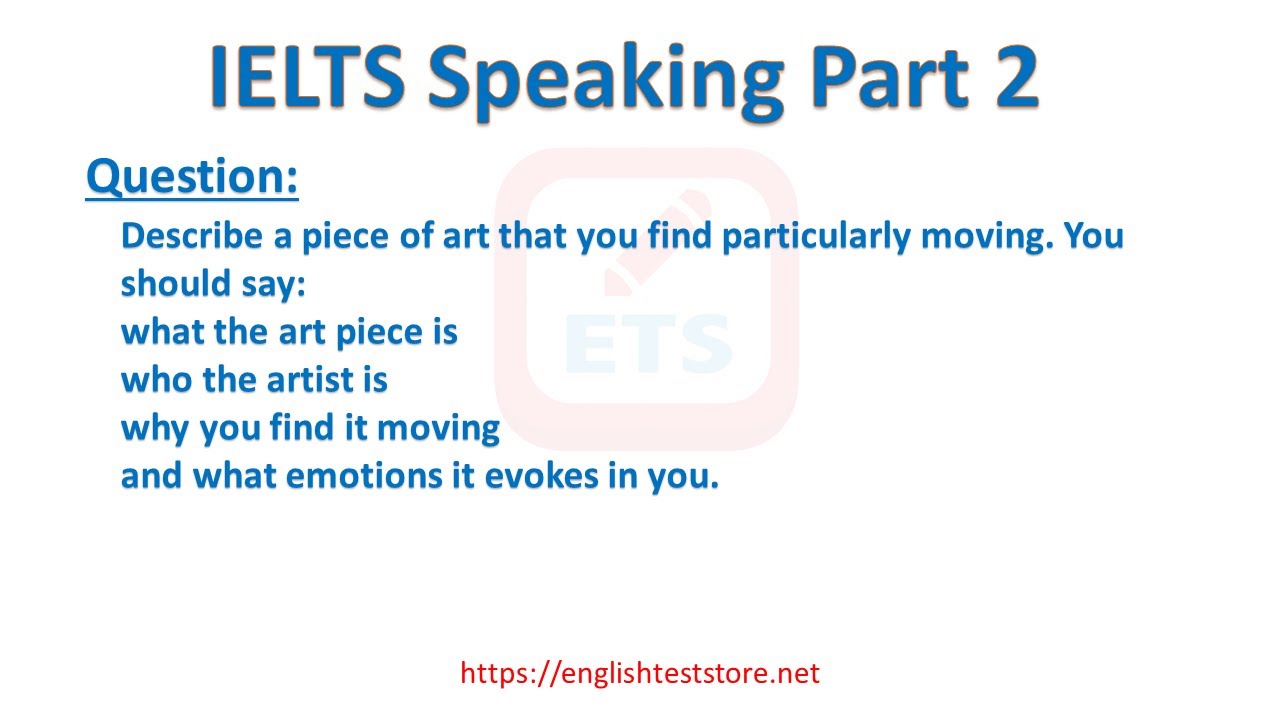
IELTS Speaking Part 2: Describe a piece of art that you find...
21K views · Jun 1, 2023 englishteststore.net
Practice online: https://englishteststore.net/index.php?option=com_content&view=category&id=653&Itemid=1113 Describe a piece of art that you find particularly moving. You should say: what the art piece is who the artist is why you find it moving and what emotions it evokes in you. - Thank you for watching! Please subscribe, share, and like the video. #ieltsspeaking #ieltsspeakingpart2 #ieltstest #ielts #ieltspreparation #ieltsexam #ieltslistening #ieltslisteningtest EnglishTestStore ►https://englishteststore.net/ Facebook ►https://www.facebook.com/englishteststore.net/ Twitter ►https://twitter.com/englishteststor
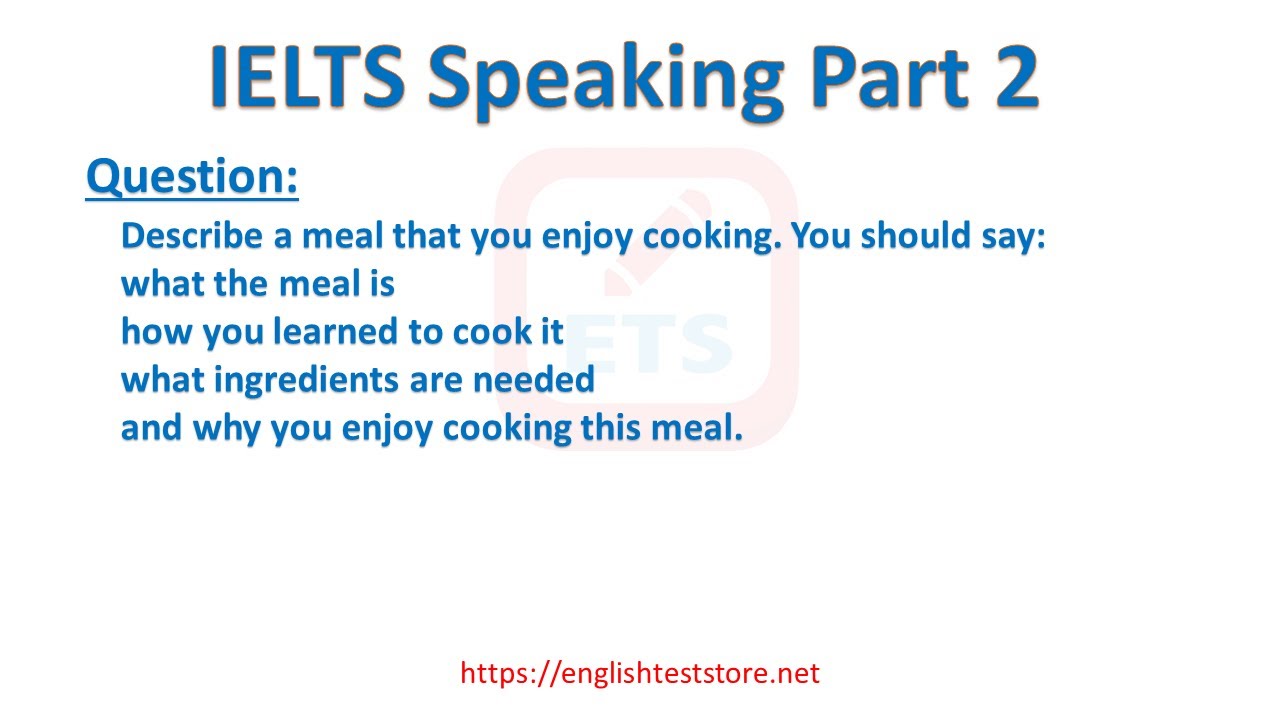
IELTS Speaking Part 2: Describe a meal that you enjoy cookin...
13K views · May 31, 2023 englishteststore.net
Practice online: https://englishteststore.net/index.php?option=com_content&view=category&id=653&Itemid=1113 Describe a meal that you enjoy cooking. You should say: what the meal is how you learned to cook it what ingredients are needed and why you enjoy cooking this meal. - Thank you for watching! Please subscribe, share, and like the video. #ieltsspeaking #ieltsspeakingpart2 #ieltstest #ielts #ieltspreparation #ieltsexam #ieltslistening #ieltslisteningtest EnglishTestStore ►https://englishteststore.net/ Facebook ►https://www.facebook.com/englishteststore.net/ Twitter ►https://twitter.com/englishteststor
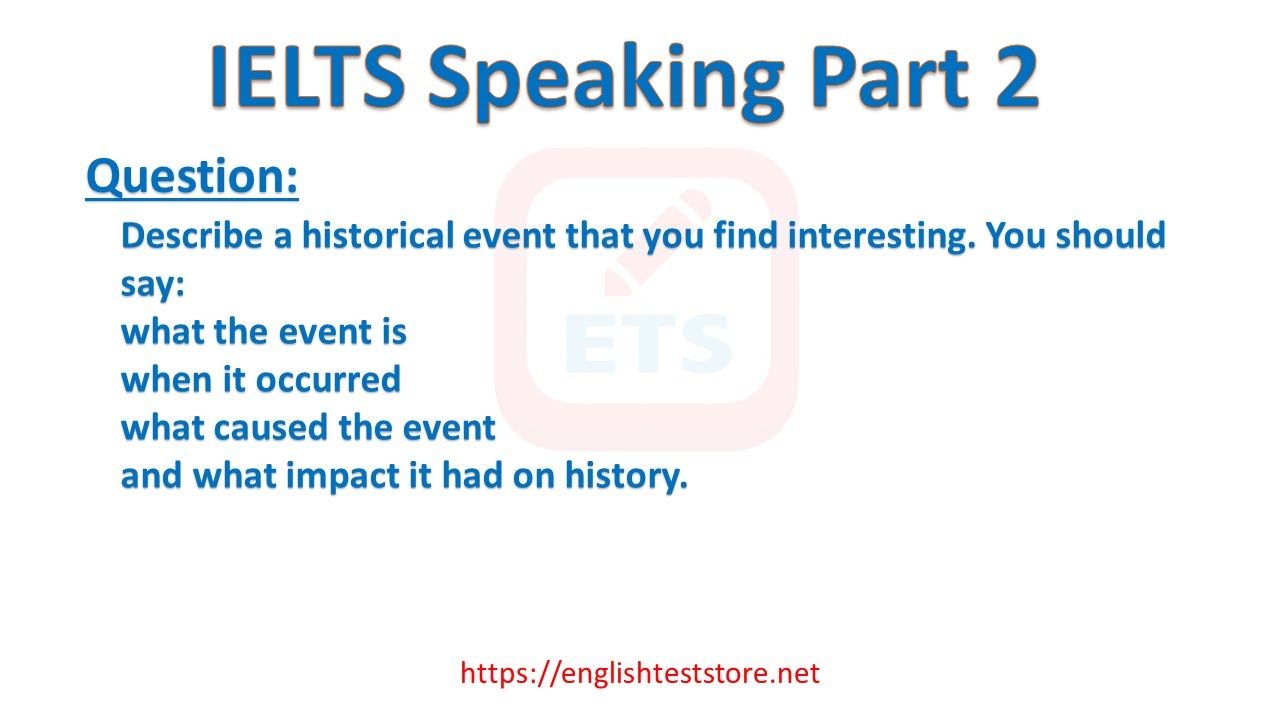
IELTS Speaking Part 2: Describe a historical event that you ...
28K views · May 31, 2023 englishteststore.net
Practice online: https://englishteststore.net/index.php?option=com_content&view=category&id=653&Itemid=1113 Describe a historical event that you find interesting. You should say: what the event is when it occurred what caused the event and what impact it had on history. - Thank you for watching! Please subscribe, share, and like the video. #ieltsspeaking #ieltsspeakingpart2 #ieltstest #ielts #ieltspreparation #ieltsexam #ieltslistening #ieltslisteningtest EnglishTestStore ►https://englishteststore.net/ Facebook ►https://www.facebook.com/englishteststore.net/ Twitter ►https://twitter.com/englishteststor
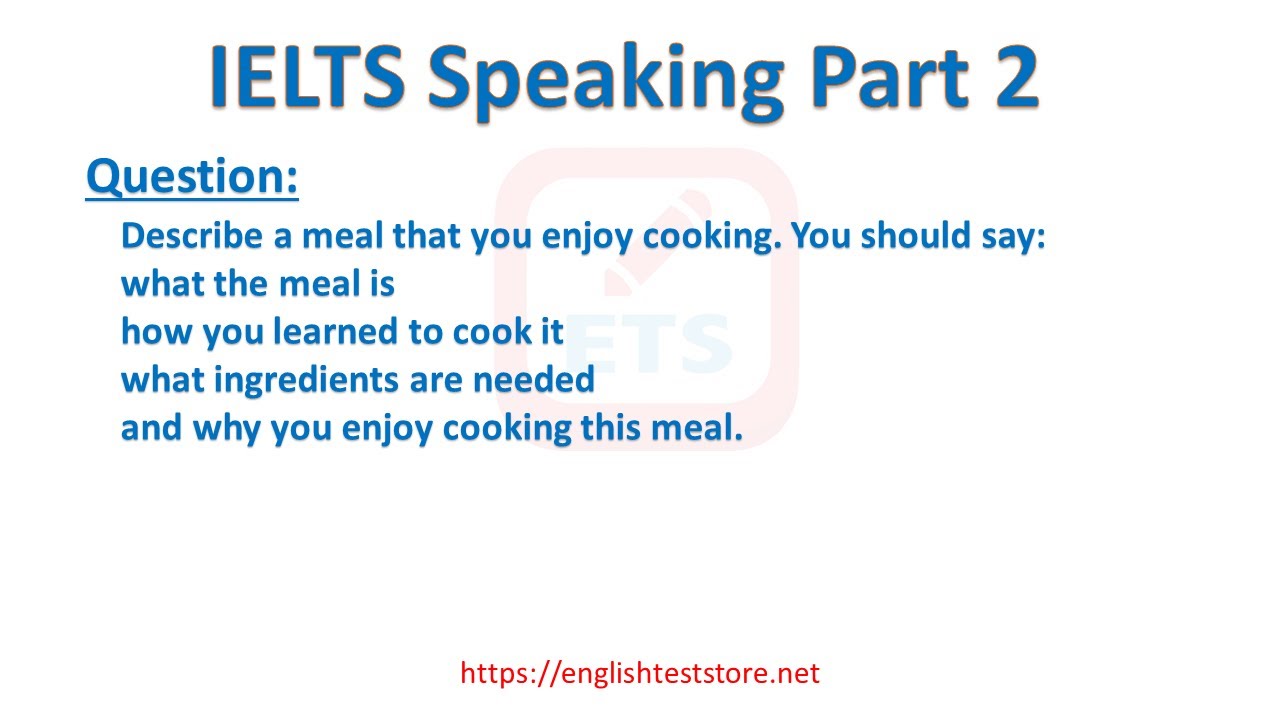
IELTS Speaking Part 2: Describe a meal that you enjoy cookin...
11K views · May 31, 2023 englishteststore.net
Practice online: https://englishteststore.net/index.php?option=com_content&view=category&id=653&Itemid=1113 Describe a meal that you enjoy cooking. You should say: what the meal is how you learned to cook it what ingredients are needed and why you enjoy cooking this meal. - Thank you for watching! Please subscribe, share, and like the video. #ieltsspeaking #ieltsspeakingpart2 #ieltstest #ielts #ieltspreparation #ieltsexam #ieltslistening #ieltslisteningtest EnglishTestStore ►https://englishteststore.net/ Facebook ►https://www.facebook.com/englishteststore.net/ Twitter ►https://twitter.com/englishteststor
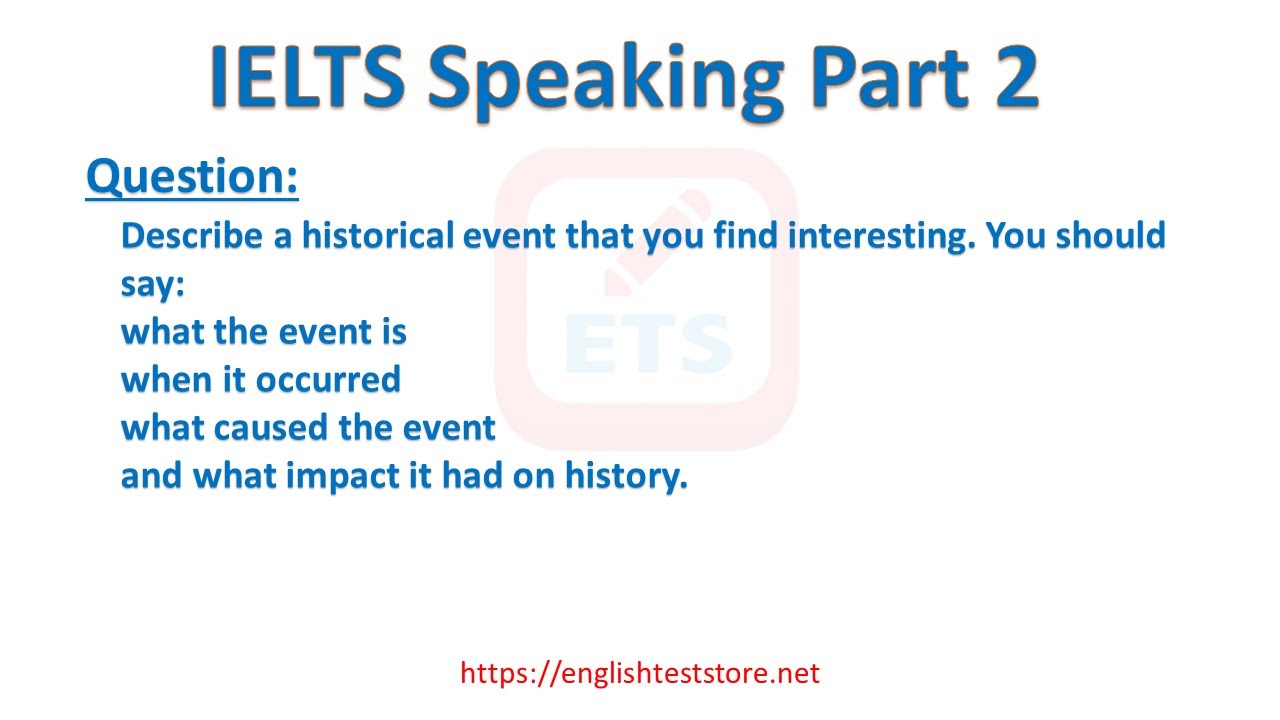
IELTS Speaking Part 2: Describe a historical event that you ...
59K views · May 31, 2023 englishteststore.net
Practice online: https://englishteststore.net/index.php?option=com_content&view=category&id=653&Itemid=1113 Describe a historical event that you find interesting. You should say: what the event is when it occurred what caused the event and what impact it had on history. - Thank you for watching! Please subscribe, share, and like the video. #ieltsspeaking #ieltsspeakingpart2 #ieltstest #ielts #ieltspreparation #ieltsexam #ieltslistening #ieltslisteningtest EnglishTestStore ►https://englishteststore.net/ Facebook ►https://www.facebook.com/englishteststore.net/ Twitter ►https://twitter.com/englishteststor
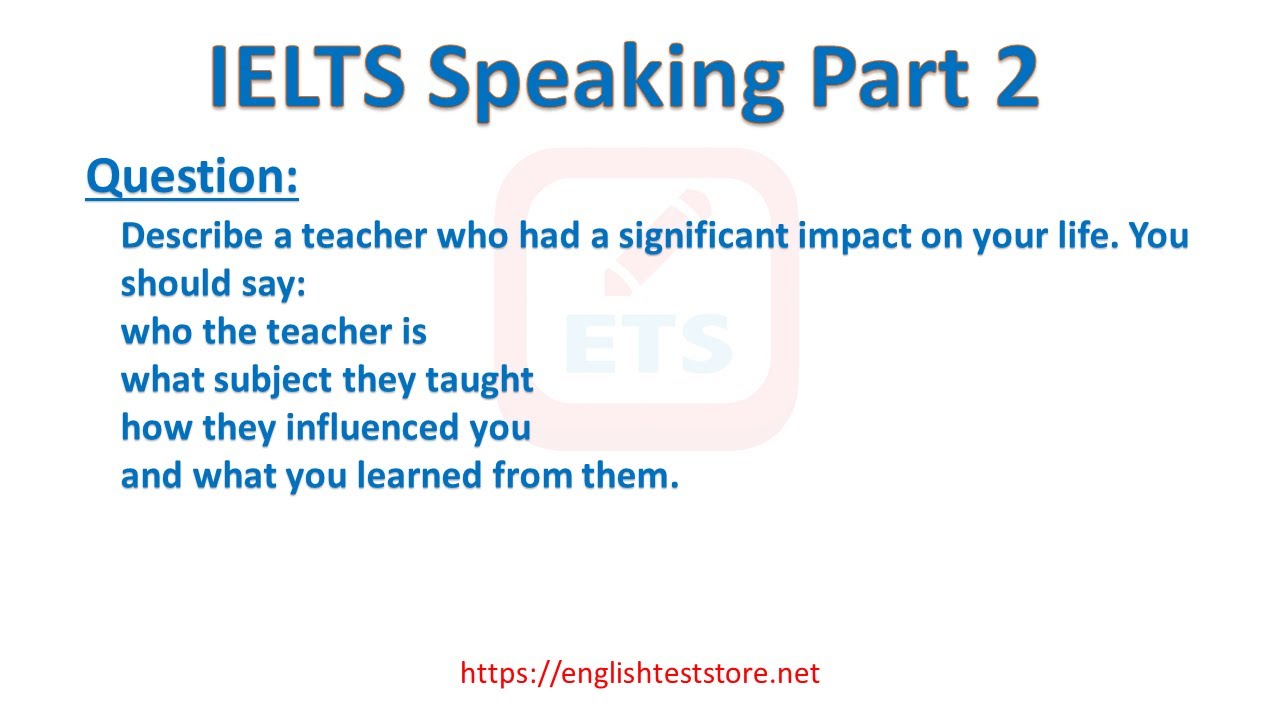
IELTS Speaking Part 2: Describe a teacher who had a signific...
32K views · May 26, 2023 englishteststore.net
Practice online: https://englishteststore.net/index.php?option=com_content&view=category&id=653&Itemid=1113 Describe a teacher who had a significant impact on your life. You should say: who the teacher is what subject they taught how they influenced you and what you learned from them. - Thank you for watching! Please subscribe, share, and like the video. #ieltsspeaking #ieltsspeakingpart2 #ieltstest #ielts #ieltspreparation #ieltsexam #ieltslistening #ieltslisteningtest EnglishTestStore ►https://englishteststore.net/ Facebook ►https://www.facebook.com/englishteststore.net/ Twitter ►https://twitter.com/englishteststor
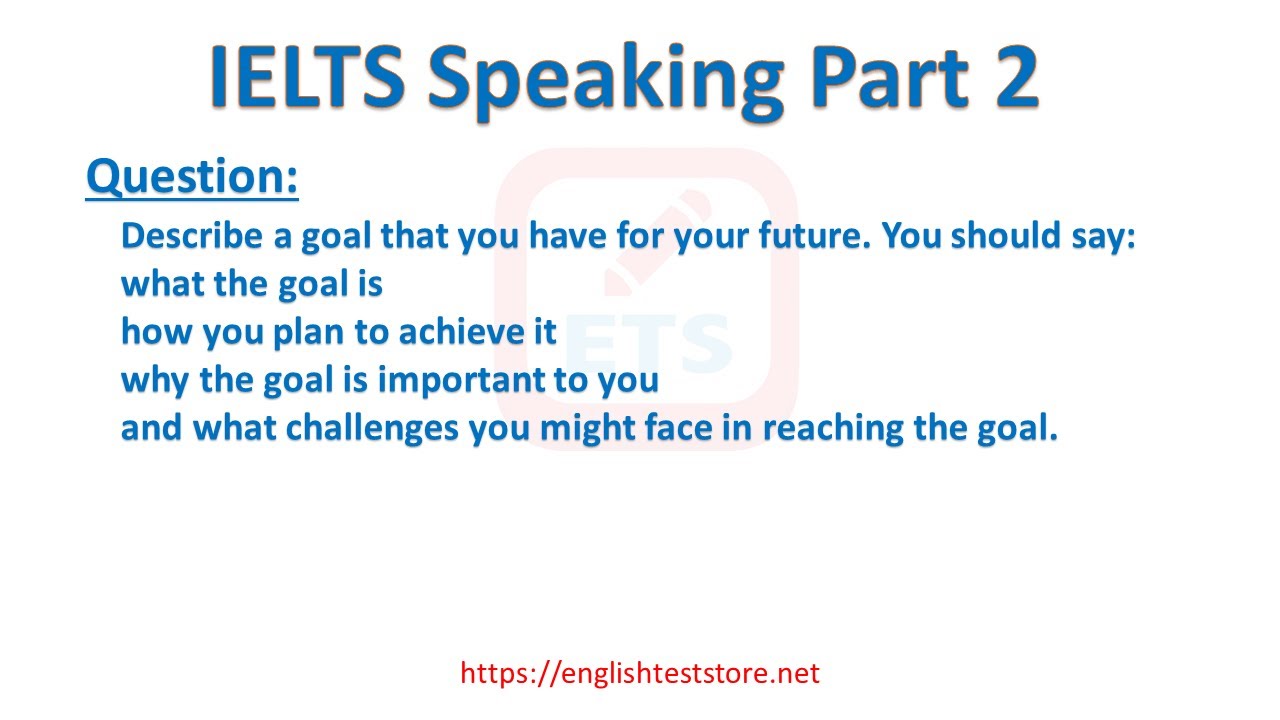
IELTS Speaking Part 2: Describe a goal that you have for you...
119K views · May 26, 2023 englishteststore.net
Practice online: https://englishteststore.net/index.php?option=com_content&view=category&id=653&Itemid=1113 Describe a goal that you have for your future. You should say: what the goal is how you plan to achieve it why the goal is important to you and what challenges you might face in reaching the goal. - Thank you for watching! Please subscribe, share, and like the video. #ieltsspeaking #ieltsspeakingpart2 #ieltstest #ielts #ieltspreparation #ieltsexam #ieltslistening #ieltslisteningtest EnglishTestStore ►https://englishteststore.net/ Facebook ►https://www.facebook.com/englishteststore.net/ Twitter ►https://twitter.com/englishteststor
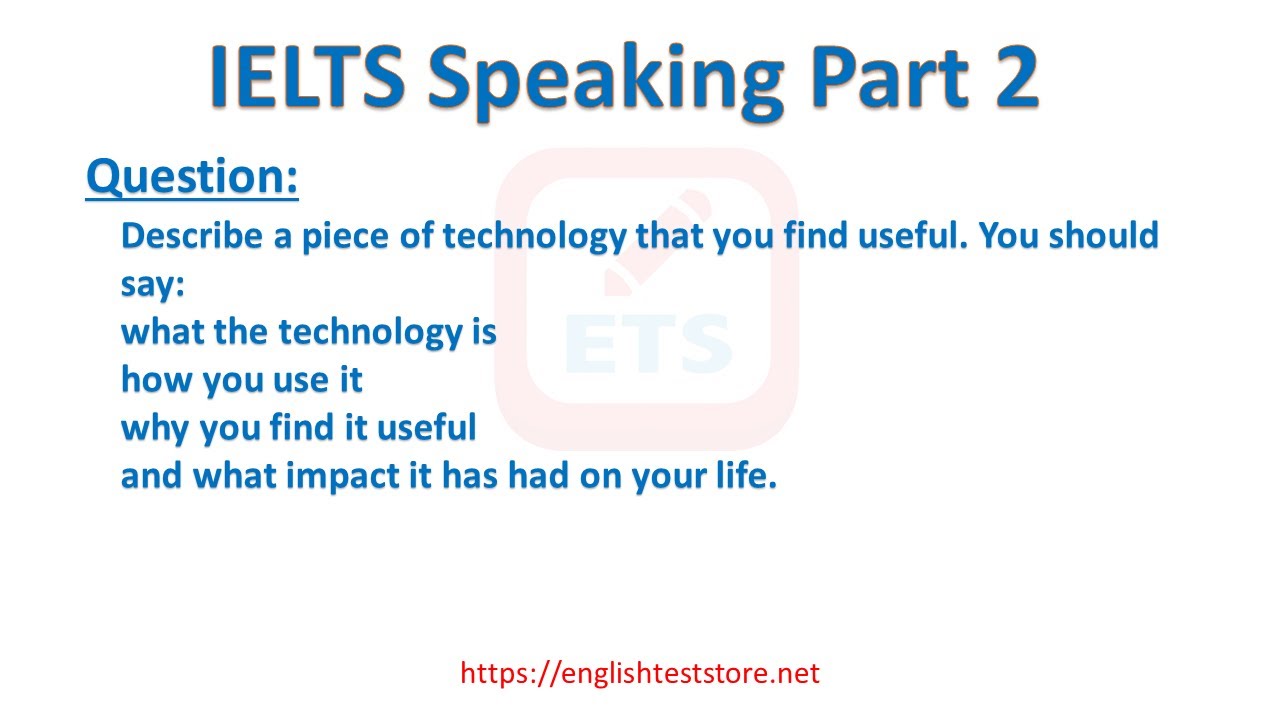
IELTS Speaking Part 2: Describe a piece of technology that y...
116K views · May 26, 2023 englishteststore.net
Practice online: https://englishteststore.net/index.php?option=com_content&view=category&id=653&Itemid=1113 Describe a piece of technology that you find useful. You should say: what the technology is how you use it why you find it useful and what impact it has had on your life. - Thank you for watching! Please subscribe, share, and like the video. #ieltsspeaking #ieltsspeakingpart2 #ieltstest #ielts #ieltspreparation #ieltsexam #ieltslistening #ieltslisteningtest EnglishTestStore ►https://englishteststore.net/ Facebook ►https://www.facebook.com/englishteststore.net/ Twitter ►https://twitter.com/englishteststor
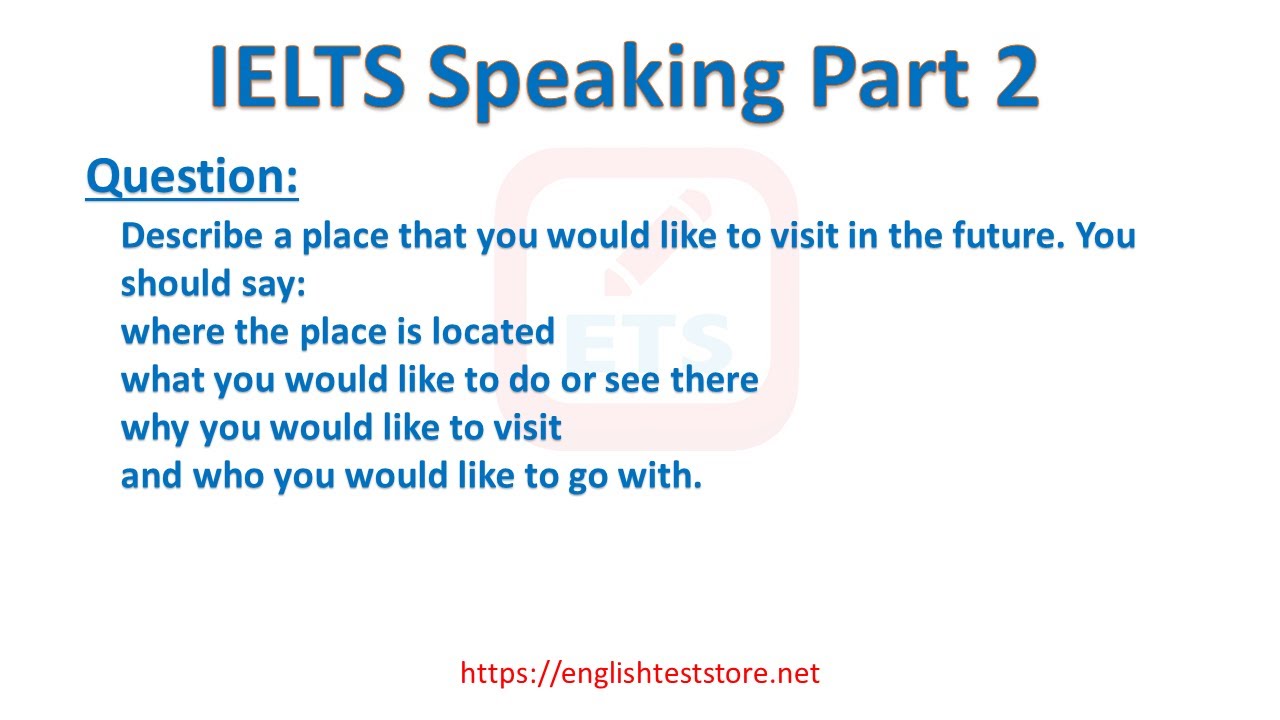
IELTS Speaking Part 2: Describe a place that you would like ...
12K views · May 26, 2023 englishteststore.net
Practice online: https://englishteststore.net/index.php?option=com_content&view=category&id=653&Itemid=1113 Describe a place that you would like to visit in the future. You should say: where the place is located what you would like to do or see there why you would like to visit and who you would like to go with. - Thank you for watching! Please subscribe, share, and like the video. #ieltsspeaking #ieltsspeakingpart2 #ieltstest #ielts #ieltspreparation #ieltsexam #ieltslistening #ieltslisteningtest EnglishTestStore ►https://englishteststore.net/ Facebook ►https://www.facebook.com/englishteststore.net/ Twitter ►https://twitter.com/englishteststor
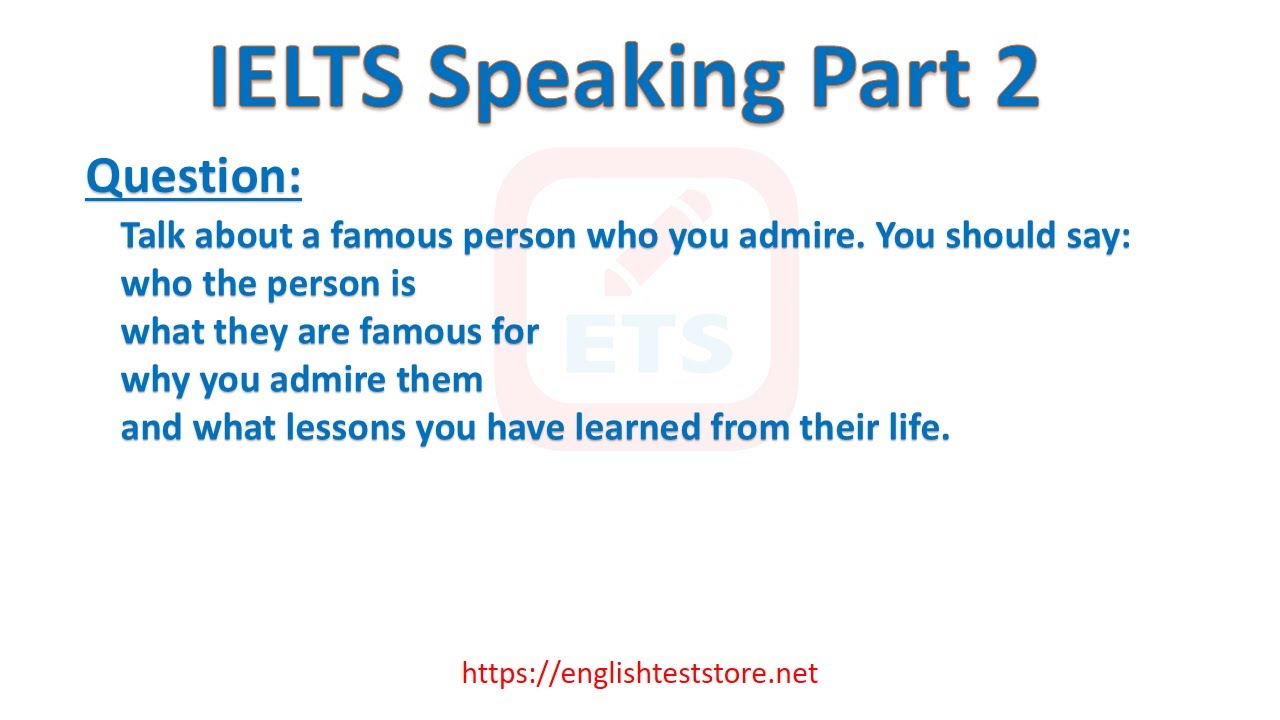
IELTS Speaking Part 2: Talk About A Famous Person You Admire
21K views · Oct 21, 2023 englishteststore.net
To learn about talk about a famous person you admire , you need to check out: ? https://englishteststore.net/index.php?option=com_content&view=category&id=653&Itemid=1113 Our video is presenting talk about a famous person you admire topic information but we try to cover the following subjects: -describe a famous person you admire ielts speaking -describe a famous person you admire for ielts -describe a famous person whose work you admire Often a video is much easier to see than reading an write-up concerning talk about a famous person you admire Talk about a famous person you admire subject is showcased in several video clips, however we attempted to provide you the very best info in a short and understandable video. For your information Just wanted to let you know that Liking a video is a fast method to let us know that you liked our work. If you're logged in, liking a video will include it to your "Liked videos" playlist. so you can find it later on If you're not the greatest fan of a Youtube video, disliking it is one method to reveal your viewpoint and let us know we have to create better videos. Some YT videos may not be available in your region for one following factors: _________________________ Follow us Official Site: https://englishteststore.net/index.php?option=com_content&view=category&id=653&Itemid=1113 Twitter: https://twitter.com/englishteststor Facebook: https://www.facebook.com/englishteststore.net Instagram: Thanks for seeing. Do not forget to go to our site .

Top 10 Commonly Confused Words in Metabolomics
84 views · Dec 5, 2023 englishteststore.net
Top 10 Commonly Confused Words in Metabolomics 1. Metabolite vs. Metabolome First up, we have metabolite and metabolome. While both terms refer to molecules involved in cellular processes, there's a key distinction. A metabolite is a specific compound, like glucose or amino acids, while a metabolome encompasses the entire set of metabolites in a biological system. Think of it as the difference between a single ingredient and the entire recipe! 2. Quantitative vs. Qualitative Analysis Next, let's clarify the difference between quantitative and qualitative analysis. When we talk about quantitative analysis in metabolomics, we're referring to measuring the precise amounts of metabolites present. On the other hand, qualitative analysis focuses on identifying the presence or absence of metabolites, without quantifying them. It's like distinguishing between knowing the exact weight of an ingredient and simply recognizing its presence in a dish. 3. Targeted vs. Untargeted Profiling Moving on, we have targeted and untargeted profiling. Targeted profiling involves analyzing a specific set of known metabolites, providing detailed information about their concentrations. In contrast, untargeted profiling is a broader approach, where the goal is to capture as many metabolites as possible, even those that haven't been identified before. It's akin to either focusing on a specific group of ingredients or exploring a wide variety of flavors in a dish. 4. Annotation vs. Identification Now, let's discuss annotation and identification. Annotation is the process of assigning putative identities to metabolites based on available databases or spectral libraries. It's like suggesting a potential ingredient based on its characteristics. On the other hand, identification involves confirming the actual chemical structure of a metabolite, often through techniques like mass spectrometry. It's akin to definitively determining the composition of an ingredient. 5. Isomer vs. Isobar Next, we have isomer and isobar. Isomers are compounds that have the same molecular formula but differ in their arrangement. They're like different arrangements of the same set of ingredients. Isobars, on the other hand, have the same mass-to-charge ratio, making them indistinguishable using mass spectrometry alone. It's like having different ingredients with the same weight, making it challenging to differentiate them based on weight alone. 6. Retention Time vs. Mass-to-Charge Ratio Moving on, let's clarify the difference between retention time and mass-to-charge ratio. In chromatography, retention time refers to the time a metabolite spends in the stationary phase before eluting. It's like the time an ingredient takes to move through a sieve. Mass-to-charge ratio, on the other hand, is a characteristic of ions and is crucial in mass spectrometry-based analysis. It's like the weight of an ingredient relative to its charge. 7. Sensitivity vs. Specificity Now, let's discuss sensitivity and specificity. Sensitivity in metabolomics refers to the ability to detect even low concentrations of a metabolite. It's like having a highly sensitive taste bud that can detect even a hint of a flavor. Specificity, on the other hand, is the ability to distinguish a particular metabolite from others. It's like being able to identify a specific flavor among a multitude of tastes. 8. Ionization vs. Fragmentation Next, we have ionization and fragmentation. Ionization is the process of converting a neutral molecule into an ion, often through techniques like electrospray ionization. It's like adding a charge to an ingredient. Fragmentation, on the other hand, involves breaking down an ion into smaller fragments, providing information about its structure. It's like dissecting an ingredient to understand its composition. 9. Internal vs. External Standards Moving on, let's clarify the difference between internal and external standards. Internal standards are compounds that are added to a sample before analysis, serving as a reference for quantification. It's like having a known ingredient in a dish to determine the concentration of other components. External standards, on the other hand, are separate samples with known concentrations that are analyzed alongside the unknown samples. It's like comparing a dish you're cooking to a standard recipe. 10. False Discovery Rate vs. Family-Wise Error Rate Lastly, let's discuss the difference between false discovery rate (FDR) and family-wise error rate (FWER).

Top 10 Commonly Confused Words in Neuropharmacology
1K views · Dec 5, 2023 englishteststore.net
Top 10 Commonly Confused Words in Neuropharmacology 1. Agonist vs. Antagonist One of the most fundamental concepts in neuropharmacology is understanding the difference between an agonist and an antagonist. An agonist is a substance that activates a receptor, mimicking the effects of a neurotransmitter. On the other hand, an antagonist blocks the receptor, preventing the neurotransmitter from exerting its effects. It's crucial to grasp this distinction, as it forms the basis for many drug actions. 2. Tolerance vs. Dependence While these terms are often used interchangeably, they have distinct meanings. Tolerance refers to the body's reduced response to a drug over time, requiring higher doses to achieve the same effect. Dependence, on the other hand, is a state where the body has adapted to the presence of a drug, and its sudden removal can lead to withdrawal symptoms. Understanding these differences is vital in managing patient care. 3. Efficacy vs. Potency When evaluating a drug's effectiveness, we consider both its efficacy and potency. Efficacy refers to the maximum effect a drug can produce, regardless of the dose. Potency, on the other hand, relates to the amount of drug required to produce a specific effect. In simple terms, a drug can be highly potent but not very efficacious, or vice versa. Both factors are crucial in selecting the right medication for a patient. 4. Side Effect vs. Adverse Effect While all medications can have unintended effects, it's important to differentiate between side effects and adverse effects. Side effects are generally mild and expected, such as drowsiness or dry mouth. Adverse effects, on the other hand, are more severe and can even be life-threatening. As healthcare professionals, we need to be aware of these possibilities and take appropriate measures to minimize harm. 5. Pharmacokinetics vs. Pharmacodynamics Pharmacokinetics and pharmacodynamics are two essential aspects of drug action. Pharmacokinetics deals with how the body processes a drug, including absorption, distribution, metabolism, and excretion. Pharmacodynamics, on the other hand, focuses on the drug's effects on the body and the underlying mechanisms. Both areas are interconnected and crucial in understanding a drug's overall profile. 6. Selective vs. Non-Selective When we talk about drug action, we often refer to their selectivity. A selective drug targets a specific receptor or pathway, while a non-selective drug may have multiple targets. Selective drugs are often preferred as they can minimize off-target effects, leading to better tolerability and safety profiles. However, there are instances where non-selective drugs may be necessary. 7. Bioavailability vs. Bioequivalence Bioavailability and bioequivalence are terms commonly encountered in pharmacokinetics. Bioavailability refers to the fraction of a drug that reaches systemic circulation, while bioequivalence compares the rate and extent of absorption of two formulations of the same drug. These concepts are crucial when evaluating generic medications, as they need to demonstrate bioequivalence to the brand-name drug. 8. Therapeutic Index vs. Safety Margin When assessing a drug's safety, we often refer to its therapeutic index or safety margin. The therapeutic index is a ratio that compares the dose required for therapeutic effect to the dose that causes toxicity. A wider therapeutic index indicates a safer drug, as there's a greater difference between the effective and toxic doses. It's essential to consider this factor when prescribing medications. 9. Onset of Action vs. Duration of Action The onset of action refers to the time it takes for a drug to start working, while the duration of action is how long its effects last. These parameters can vary significantly between medications and are important considerations when determining dosing intervals. For some conditions, a rapid onset of action may be crucial, while for others, a longer duration may be desired. 10. Placebo vs. Nocebo Placebo and nocebo are terms often encountered in clinical trials and patient care. A placebo is an inactive substance given to a patient, often as a control, to assess the true effects of a drug. On the other hand, a nocebo refers to the negative effects experienced by a patient due to the expectation of harm, even when the treatment itself is inert. These phenomena highlight the importance of the mind-body connection in healthcare. Conclusion And there you have it, the top 10 commonly confused words in neuropharmacology.
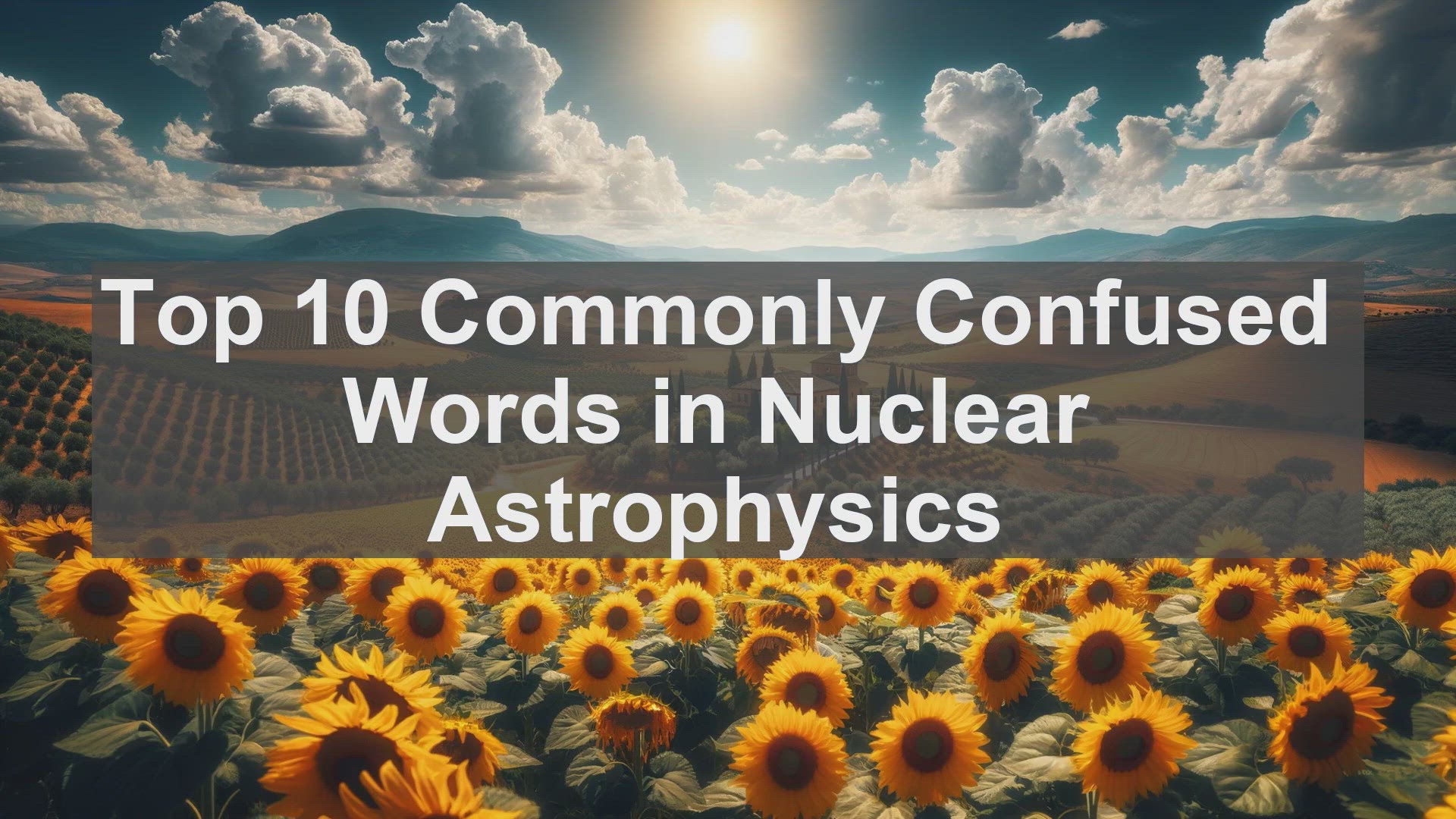
Top 10 Commonly Confused Words in Nuclear Astrophysics
114 views · Dec 5, 2023 englishteststore.net
Top 10 Commonly Confused Words in Nuclear Astrophysics 1. Fusion vs. Fission Fusion and fission are two fundamental processes in nuclear astrophysics. Fusion refers to the merging of two atomic nuclei to form a heavier nucleus, releasing a tremendous amount of energy. On the other hand, fission involves the splitting of a heavy nucleus into two or more lighter nuclei, accompanied by the release of energy. While both processes release energy, they differ in the reactions they entail. Fusion powers the stars, including our Sun, while fission is harnessed in nuclear power plants. 2. Isotope vs. Element Isotope and element are often used interchangeably, but they have distinct meanings. An element refers to a substance composed of atoms with the same number of protons. For example, all carbon atoms have six protons, making carbon the element. On the other hand, isotopes are variants of an element with the same number of protons but different numbers of neutrons. Carbon-12 and carbon-14 are examples of carbon isotopes, with 6 and 8 neutrons, respectively. 3. Neutron Star vs. Black Hole Neutron stars and black holes are both remnants of massive stars, but they differ in their properties. A neutron star is incredibly dense, with a mass comparable to that of the Sun but squeezed into a sphere of only a few kilometers. It is composed mainly of neutrons. In contrast, a black hole is a region in space where gravity is so intense that nothing, not even light, can escape its pull. It is formed when a massive star collapses under its own gravity. 4. Supernova vs. Nova Supernovae and novae are both astronomical events involving stars, but they differ in scale and intensity. A nova occurs in a binary star system, where a white dwarf, a dense stellar remnant, accretes matter from its companion star. This matter triggers a thermonuclear explosion on the white dwarf's surface, resulting in a temporary increase in brightness. In contrast, a supernova is a much more powerful explosion that occurs when a massive star reaches the end of its life, leading to its complete destruction. 5. Redshift vs. Blueshift Redshift and blueshift are terms used to describe the shift in the wavelength of light from astronomical objects. Redshift occurs when an object is moving away from us, causing the light it emits to stretch, resulting in a shift towards the red end of the spectrum. This phenomenon is a key piece of evidence for the expansion of the universe. Conversely, blueshift occurs when an object is moving towards us, causing the light to compress, resulting in a shift towards the blue end of the spectrum. 6. Nucleosynthesis vs. Nuclear Fusion Nucleosynthesis and nuclear fusion are related but distinct processes. Nuclear fusion, as we discussed earlier, is the process of combining atomic nuclei to form a heavier nucleus. Nucleosynthesis, on the other hand, refers to the formation of new atomic nuclei, often through fusion, in various astrophysical environments. It is responsible for the creation of elements in the universe, from hydrogen and helium in the early stages to heavier elements like carbon, oxygen, and beyond. 7. Cosmic Rays vs. Solar Wind Cosmic rays and solar wind are both streams of particles originating from space, but they have different sources and compositions. Cosmic rays are high-energy particles, primarily protons, that come from outside our solar system, often from distant galaxies. They can have immense energies, some even higher than those produced in particle accelerators on Earth. Solar wind, on the other hand, is a stream of charged particles, mainly electrons and protons, emitted by the Sun. It is a constant outflow from the Sun's outer atmosphere. 8. Pulsar vs. Quasar Pulsars and quasars are both astronomical objects, but they are vastly different. A pulsar is a highly magnetized, rotating neutron star that emits beams of electromagnetic radiation. These beams are only visible when they point towards Earth, resulting in a periodic 'pulsing' effect, hence the name. Quasars, on the other hand, are extremely luminous, distant objects powered by supermassive black holes at their centers. They emit vast amounts of energy, including visible light, and are among the brightest objects in the universe. 9. Dark Matter vs. Dark Energy Dark matter and dark energy are two mysterious components that make up a significant portion of the universe, but their natures are still largely unknown. Dark matter is a form of matter that does not interact with light or other forms of electromagnetic radiation.
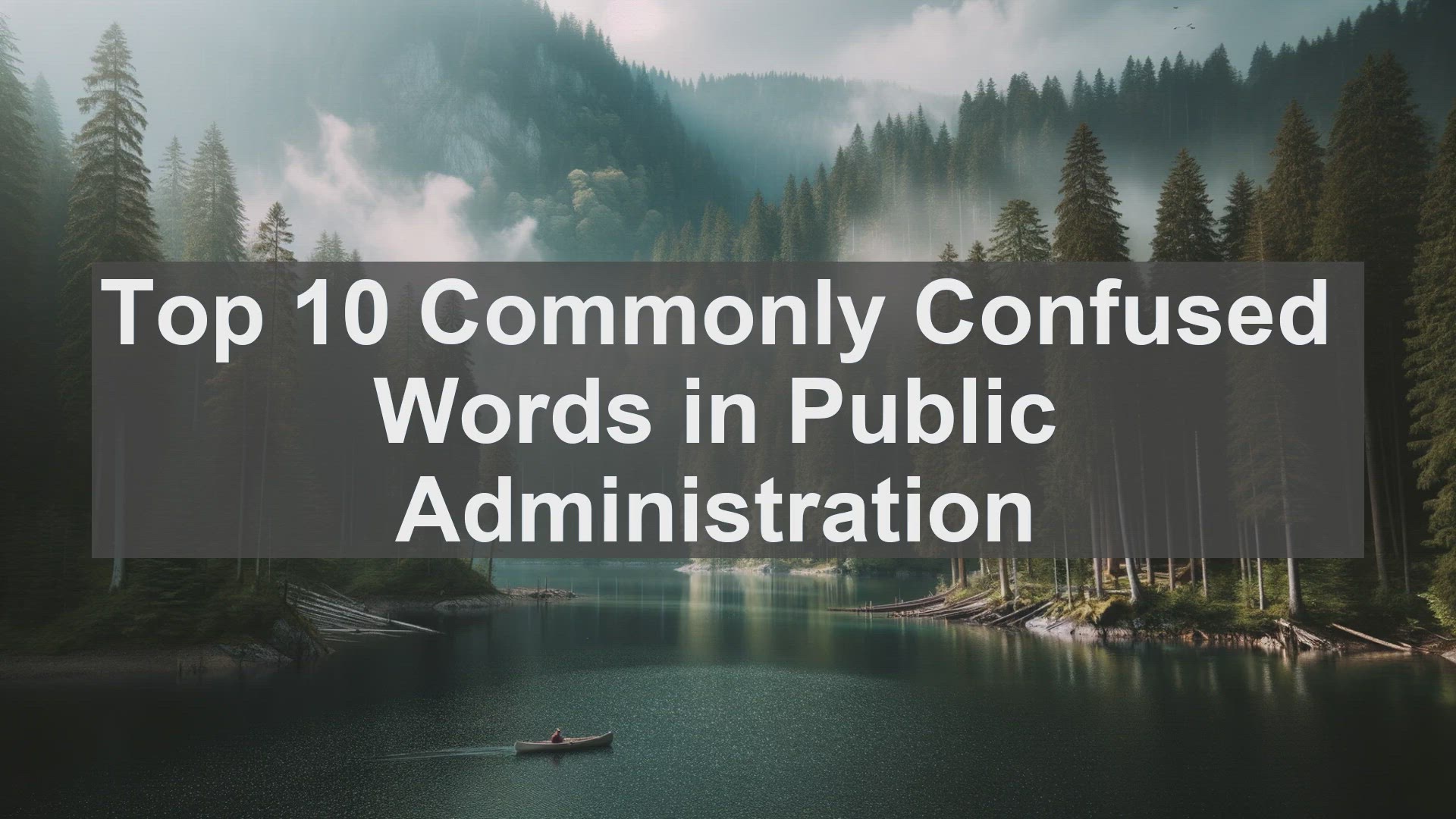
Top 10 Commonly Confused Words in Public Administration
4K views · Dec 5, 2023 englishteststore.net
Top 10 Commonly Confused Words in Public Administration 1. Policy vs. Procedure Policy refers to a set of principles or guidelines that guide decision-making, while a procedure is a series of steps to achieve a specific goal. Policies are broad, while procedures are more detailed. For example, a policy might state that all employees should adhere to ethical standards, while a procedure outlines the steps to report a violation. Understanding the distinction between these two is vital in public administration. 2. Efficiency vs. Effectiveness Efficiency is about doing things in the most economical and timely manner, while effectiveness is about achieving the desired outcome. In public administration, it's not just about completing tasks quickly (efficiency), but also ensuring that those tasks contribute to the overall goals of the organization (effectiveness). Striking the right balance between the two is crucial for success. 3. Authority vs. Power Authority refers to the legitimate right to make decisions and give orders, often derived from a position or role. Power, on the other hand, is the ability to influence others, regardless of formal authority. In public administration, individuals can have authority due to their position, but they may also possess power through their expertise or connections. Recognizing the difference helps in understanding the dynamics of decision-making. 4. Accountability vs. Responsibility Accountability is the answerability for actions or decisions, often to a higher authority or the public. Responsibility, on the other hand, is the duty or task assigned to someone. In public administration, individuals can be responsible for a task, but they are also accountable for the outcomes. Understanding this difference is crucial for ensuring transparency and trust in the system. 5. Public vs. Private Sector The public sector refers to government organizations and entities funded by taxpayers, while the private sector includes businesses and organizations driven by profit. In public administration, the goals and priorities of these sectors can differ. Public sector organizations often focus on providing services to the public, while private sector organizations aim for profitability. Recognizing these distinctions is essential for understanding the unique challenges and dynamics of each sector. 6. Bureaucracy vs. Red Tape Bureaucracy refers to the administrative system and processes in place to ensure the smooth functioning of an organization. While bureaucracy is necessary for maintaining order, it can sometimes lead to excessive paperwork and delays, which is often referred to as red tape. Balancing the need for bureaucracy with the avoidance of red tape is a constant challenge in public administration. 7. Transparency vs. Confidentiality Transparency is about openness and sharing information with the public, promoting accountability and trust. Confidentiality, on the other hand, is about protecting sensitive or classified information. In public administration, there is often a need to balance the two. While transparency is crucial for public trust, certain information, such as personal or national security-related, needs to be kept confidential. 8. Stakeholder vs. Shareholder Stakeholders are individuals or groups who have an interest or are affected by the actions of an organization. Shareholders, on the other hand, are individuals who own shares or stocks in a company. In public administration, stakeholders can include the public, interest groups, or other government agencies. Recognizing and engaging with stakeholders is vital for effective decision-making and policy implementation. 9. Ethics vs. Morals Ethics refers to a set of principles or values that guide behavior, often in a professional context. Morals, on the other hand, are personal beliefs about what is right or wrong. In public administration, ethical behavior is crucial for maintaining public trust. While individuals may have different personal morals, they are expected to adhere to a common set of ethical standards in their professional roles. 10. Public Interest vs. Special Interest Public interest refers to the welfare or well-being of the general public as a whole. Special interest, on the other hand, refers to the concerns or goals of a specific group or organization. In public administration, the challenge is to balance the needs of various special interest groups while ensuring that decisions are in the overall public interest.

Top 10 Commonly Confused Words in Semantics
491 views · Dec 6, 2023 englishteststore.net
Top 10 Commonly Confused Words in Semantics 1. Affect vs. Effect One of the most common confusions in semantics is between 'affect' and 'effect.' 'Affect' is usually a verb, meaning to influence or produce a change. On the other hand, 'effect' is often a noun, representing the result or consequence of an action. So, while 'affect' is about doing something, 'effect' is about the outcome. For example, 'The rain affected the match' or 'The effect of the rain was evident in the flooded streets.' 2. Complement vs. Compliment The words 'complement' and 'compliment' may sound similar, but their meanings are quite different. 'Complement' refers to something that completes or enhances another thing. It's often used in the context of matching or harmonizing. On the other hand, 'compliment' is about expressing admiration or praise. So, while 'complement' is about fitting together, 'compliment' is about giving praise. For example, 'The red curtains complement the blue walls' or 'She received a compliment on her presentation.' 3. Farther vs. Further When it comes to distance, 'farther' and 'further' are often confused. 'Farther' is used to indicate physical distance. For example, 'The next town is farther than I thought.' On the other hand, 'further' is about metaphorical or figurative distance. It's often used in the sense of additional or more. For example, 'We need to further discuss this matter.' So, while 'farther' is about actual distance, 'further' is about extending or progressing something. 4. Its vs. It's The difference between 'its' and 'it's' lies in the apostrophe. 'Its' is a possessive pronoun, indicating ownership. For example, 'The dog wagged its tail.' On the other hand, 'it's' is a contraction, short for 'it is' or 'it has.' For example, 'It's a beautiful day' or 'It's been a long journey.' So, while 'its' shows possession, 'it's' is a contraction for 'it is' or 'it has.' 5. Then vs. Than The words 'then' and 'than' may sound similar, but their usage is distinct. 'Then' is often used to indicate time or sequence. For example, 'We went to the park, and then we had lunch.' On the other hand, 'than' is used in comparisons, highlighting a difference or preference. For example, 'She is taller than her brother.' So, while 'then' is about time or sequence, 'than' is about comparison. 6. Principle vs. Principal The words 'principle' and 'principal' are often interchanged, but they have different meanings. 'Principle' refers to a fundamental truth or belief. For example, 'She has strong principles.' On the other hand, 'principal' has multiple meanings, but it's often used to refer to the head of a school. For example, 'The principal addressed the students.' So, while 'principle' is about a belief or truth, 'principal' is often about a person in authority. 7. Stationary vs. Stationery The words 'stationary' and 'stationery' are homophones, which means they sound the same but have different meanings. 'Stationary' refers to something that is not moving or fixed in one place. For example, 'The car was stationary at the traffic light.' On the other hand, 'stationery' refers to writing materials, such as paper, pens, and envelopes. For example, 'I bought some stationery for my office.' So, while 'stationary' is about something not moving, 'stationery' is about writing materials. 8. Accept vs. Except The words 'accept' and 'except' may seem similar, but they have distinct uses. 'Accept' means to receive willingly or agree to something. For example, 'She accepted the invitation.' On the other hand, 'except' is often used to exclude or leave out. For example, 'Everyone attended the party except John.' So, while 'accept' is about agreeing or receiving, 'except' is about excluding or leaving out. 9. Allusion vs. Illusion The words 'allusion' and 'illusion' are often confused due to their similar spellings. However, they have different meanings. 'Allusion' refers to an indirect or passing reference. For example, 'The author made an allusion to Greek mythology.' On the other hand, 'illusion' is about something that deceives or misleads the senses. For example, 'The magician created an illusion of a disappearing act.' So, while 'allusion' is about a reference, 'illusion' is about something that tricks the senses. 10. Capital vs. Capitol The words 'capital' and 'capitol' are often used interchangeably, but they have distinct meanings. 'Capital' has multiple meanings, but it's often used to refer to a city that serves as the seat of government.

Top 10 Verbs for Conversations on Sustainable Infrastructure...
700 views · Dec 7, 2023 englishteststore.net
Top 10 Verbs for Conversations on Sustainable Infrastructure and Green Technology 1. Innovate: Pioneering Solutions Innovation is at the heart of sustainable infrastructure and green technology. When we innovate, we're not just coming up with new ideas; we're finding practical solutions to address environmental challenges. From designing energy-efficient buildings to creating renewable energy sources, this verb encompasses the spirit of progress. 2. Implement: Transforming Ideas into Reality Ideas alone aren't enough. To make a difference, we need to implement them. This verb signifies the crucial step of turning concepts into tangible actions. Whether it's installing solar panels or constructing eco-friendly transportation systems, implementation is where the vision takes shape. 3. Collaborate: Building Partnerships Sustainable infrastructure and green technology require collective effort. Collaboration, therefore, is vital. By working together, experts from various fields can pool their knowledge and resources, leading to more comprehensive and effective solutions. This verb emphasizes the importance of teamwork and shared goals. 4. Optimize: Maximizing Efficiency In a world with finite resources, optimization is key. This verb highlights the need to make the most of what we have. From optimizing water usage in a building to streamlining waste management processes, the focus is on minimizing waste and maximizing efficiency, ultimately reducing our ecological footprint. 5. Educate: Spreading Awareness Change begins with awareness, and that's where education comes in. By educating others about sustainable practices and the benefits of green technology, we can inspire more people to take action. This verb is about sharing knowledge and empowering others to make informed choices. 6. Adapt: Embracing Change The field of sustainable infrastructure and green technology is ever-evolving. To stay relevant, we need to adapt. This verb signifies the ability to adjust to new technologies, methodologies, and even environmental conditions. Adaptation ensures that our solutions remain effective in a dynamic world. 7. Monitor: Tracking Progress Once a project is underway, monitoring becomes crucial. This verb involves regularly assessing and evaluating the impact of our actions. By monitoring, we can identify areas for improvement, address any issues, and ensure that our initiatives are on track towards their sustainability goals. 8. Advocate: Being a Voice for Change Advocacy is about more than just words. It's about actively promoting and supporting sustainable initiatives. This verb emphasizes the role each of us can play in driving change, whether it's through participating in campaigns, engaging with policymakers, or simply spreading the word within our communities. 9. Integrate: Creating Holistic Solutions Sustainable infrastructure and green technology aren't isolated concepts. They're part of a larger ecosystem. This verb signifies the need to integrate various elements, be it combining renewable energy sources for a more reliable grid or incorporating green spaces into urban designs. Integration ensures a comprehensive and interconnected approach. 10. Inspire: Motivating Others Last but certainly not least, we have 'inspire.' This verb is about more than motivation; it's about sparking a passion for sustainability. By sharing success stories, showcasing innovative projects, and highlighting the positive impact of sustainable infrastructure and green technology, we can inspire others to join the movement. Conclusion: The Verbs of Change And there you have it, our top 10 verbs for conversations on sustainable infrastructure and green technology. By incorporating these verbs into our discussions, we can not only enhance our vocabulary but also convey the depth and potential of this field. So, let's embrace these verbs, and together, let's build a greener, more sustainable future. Thank you for watching!
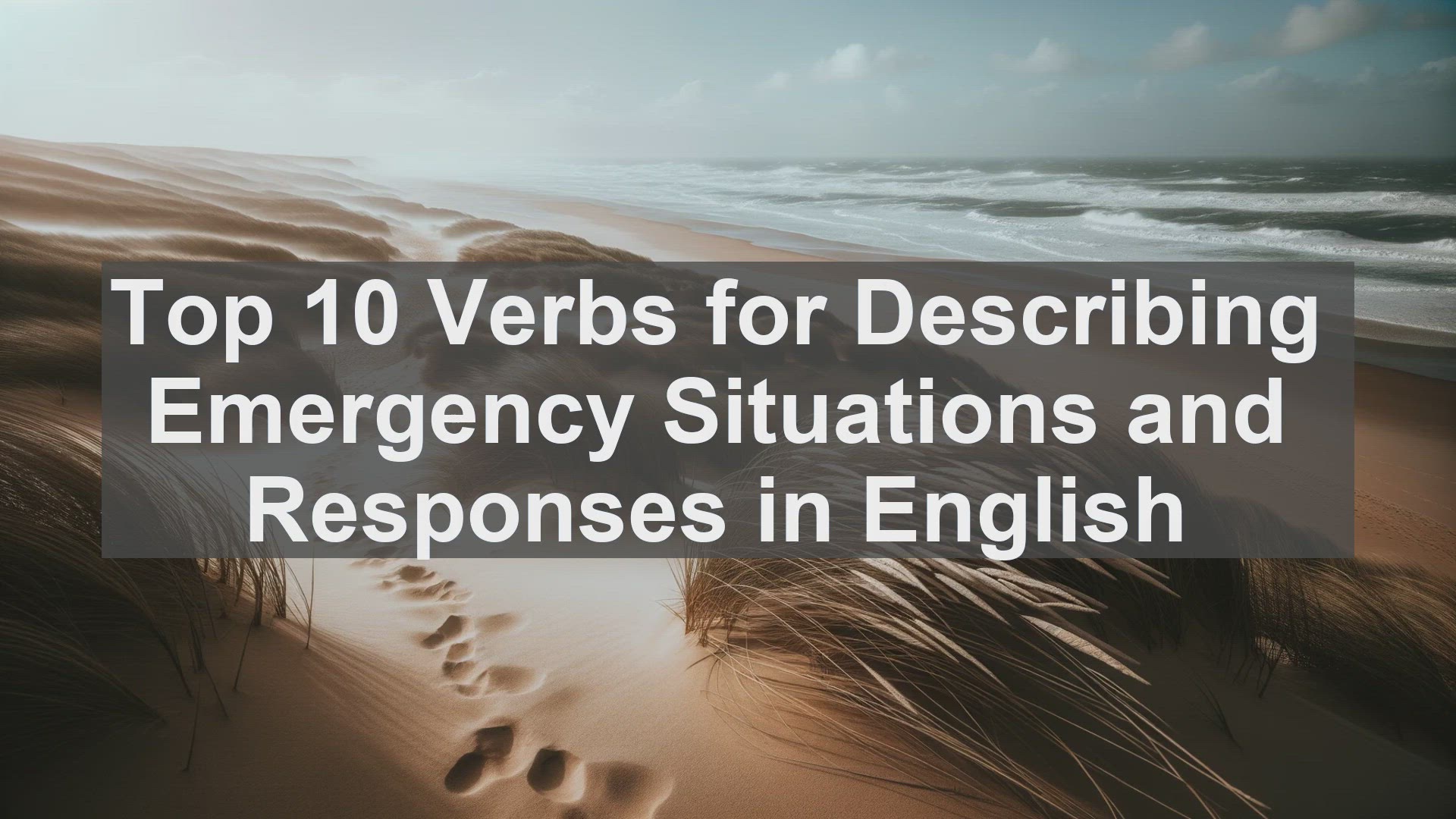
Top 10 Verbs for Describing Emergency Situations and Respons...
2K views · Dec 7, 2023 englishteststore.net
Top 10 Verbs for Describing Emergency Situations and Responses in English 1. Alert When an emergency occurs, it's crucial to alert the relevant authorities or individuals. This verb implies notifying someone about the situation, ensuring that they're aware and can take appropriate action. 2. Evacuate In certain emergencies, it's necessary to evacuate the area. This means moving people to a safer location, away from the immediate danger. Evacuation plans often involve designated assembly points and specific routes to follow. 3. Rescue During an emergency, the act of rescuing individuals becomes paramount. This involves saving people from harm, be it through natural disasters, accidents, or other hazardous situations. Rescue efforts can be carried out by professionals or even by fellow community members. 4. Provide First Aid In many emergency situations, providing immediate medical assistance is crucial. This can range from simple actions like applying bandages to more advanced techniques like CPR. First aid knowledge is invaluable and can often make a significant difference in the outcome of an emergency. 5. Coordinate In large-scale emergencies, coordination is key. This verb encompasses activities like organizing resources, communicating with different teams, and ensuring that everyone is working together towards a common goal. Effective coordination can streamline response efforts and maximize their impact. 6. Assess Before taking action, it's essential to assess the situation. This involves gathering information, evaluating risks, and understanding the scope of the emergency. By conducting a thorough assessment, responders can make informed decisions and prioritize their actions. 7. Communicate Clear and timely communication is vital during emergencies. This includes not only conveying information but also actively listening to others. Effective communication ensures that everyone is on the same page, reducing confusion and enabling a more coordinated response. 8. Secure In some emergencies, securing the area is necessary. This involves actions like setting up barriers, restricting access, or ensuring that potential hazards are contained. By securing the scene, responders can minimize further risks and create a safer environment. 9. Reunite In the aftermath of an emergency, reuniting individuals with their loved ones is a priority. This can involve establishing designated meeting points or using communication channels to facilitate the process. Reuniting not only provides emotional support but also ensures that everyone is accounted for. 10. Recover After the immediate response phase, the recovery process begins. This verb encompasses activities like rebuilding, restoring services, and helping affected individuals return to normalcy. Recovery efforts can take time, but they're essential for the long-term well-being of the community. Conclusion And there you have it - the top 10 verbs for describing emergency situations and responses. By familiarizing yourself with these verbs, you'll be better equipped to understand and discuss emergencies in English. Remember, emergency preparedness is a collective responsibility, and every individual's actions can make a difference. Thank you for watching, and stay safe!

Top 10 English Idioms Involving Christmas Decorations for Ch...
8K views · Dec 23, 2023 englishteststore.net
Hello everyone, and welcome to this special English lesson. As Christmas approaches, we're not only surrounded by the joyous decorations but also a treasure trove of idioms. Today, we'll explore the top 10 English idioms that revolve around Christmas decorations. These idioms not only add color to our conversations but also offer a glimpse into the rich cultural tapestry of the English language. So, let's dive in!

Top 10 Phrases for Talking about Sustainable Urban Artisanal...
5 views · Jan 13, 2024 englishteststore.net
Top 10 Phrases for Talking about Sustainable Urban Artisanal Markets Introduction: The World of Sustainable Urban Artisanal Markets Hello, students! Today, we're diving into the vibrant realm of sustainable urban artisanal markets. These markets, often nestled in the heart of cities, offer a treasure trove of locally crafted goods and fresh produce. But beyond their aesthetic appeal, they're also hubs of sustainability and community engagement. Let's explore some phrases that will help you navigate this fascinating world. 1. 'The Charm Lies in the Handmade' When discussing artisanal markets, this phrase captures the essence of what sets them apart. Unlike mass-produced items, the goods found here are lovingly crafted by skilled artisans. This not only adds a unique touch but also supports local talent and preserves traditional craftsmanship. 2. 'From Farm to Table: The Local Produce Advantage' One of the hallmarks of these markets is the abundance of fresh, locally sourced produce. This phrase emphasizes the direct link between the farmer and the consumer, cutting out intermediaries. It's not just about the taste; it's also about reducing carbon footprints and supporting sustainable farming practices. 3. 'A Feast for the Senses: The Market's Ambiance' Artisanal markets aren't just about shopping; they're immersive experiences. Use this phrase to describe the vibrant colors, enticing aromas, and lively sounds that fill the air. It's this sensory richness that often makes a visit to these markets so memorable. 4. 'Community at the Core: The Market's Social Aspect' Beyond commerce, these markets foster a sense of community. This phrase highlights how they become meeting points, where locals and visitors alike gather, exchange stories, and forge connections. They're not just marketplaces; they're social hubs. 5. 'Preserving Cultural Heritage: The Role of Traditional Crafts' Artisanal markets are often treasure troves of traditional crafts. Use this phrase to discuss how these crafts, passed down through generations, are not just beautiful but also repositories of cultural heritage. By supporting them, we ensure their continuity and the preservation of our collective history. 6. 'Beyond the Transaction: The Value of Personal Connections' In a world dominated by online shopping, artisanal markets offer something unique: personal connections. This phrase emphasizes how interacting directly with the seller, hearing their stories, and understanding the process behind the goods can enrich the buying experience. 7. 'A Win-Win: Supporting Local Businesses' When you shop at an artisanal market, you're not just making a purchase; you're making an investment in the local economy. This phrase highlights how these markets provide a platform for small businesses, helping them thrive and contribute to the community's overall prosperity. 8. 'The Ripple Effect: How Sustainable Choices Extend Beyond the Market' Sustainability isn't just confined to the market's boundaries. This phrase emphasizes how the choices we make here, be it opting for eco-friendly packaging or buying products with minimal carbon footprints, have a wider impact, influencing our overall lifestyle and consumption patterns. 9. 'A Learning Space: Workshops and Demonstrations' Artisanal markets aren't just for shopping; they're also hubs of learning. This phrase highlights how many markets offer workshops and demonstrations, giving visitors a chance to not just observe but actively participate in traditional crafts and skills. 10. 'The Market's Evolution: Balancing Tradition and Innovation' As times change, artisanal markets must adapt. This phrase encapsulates the delicate balance between preserving tradition and embracing innovation. It's this ability to evolve that ensures these markets remain relevant and continue to enchant generations to come. Conclusion: A World of Possibilities So, students, armed with these phrases, you're ready to explore the fascinating world of sustainable urban artisanal markets. From the stories behind the crafts to the flavors of local produce, there's a wealth of experiences waiting for you. Happy exploring!
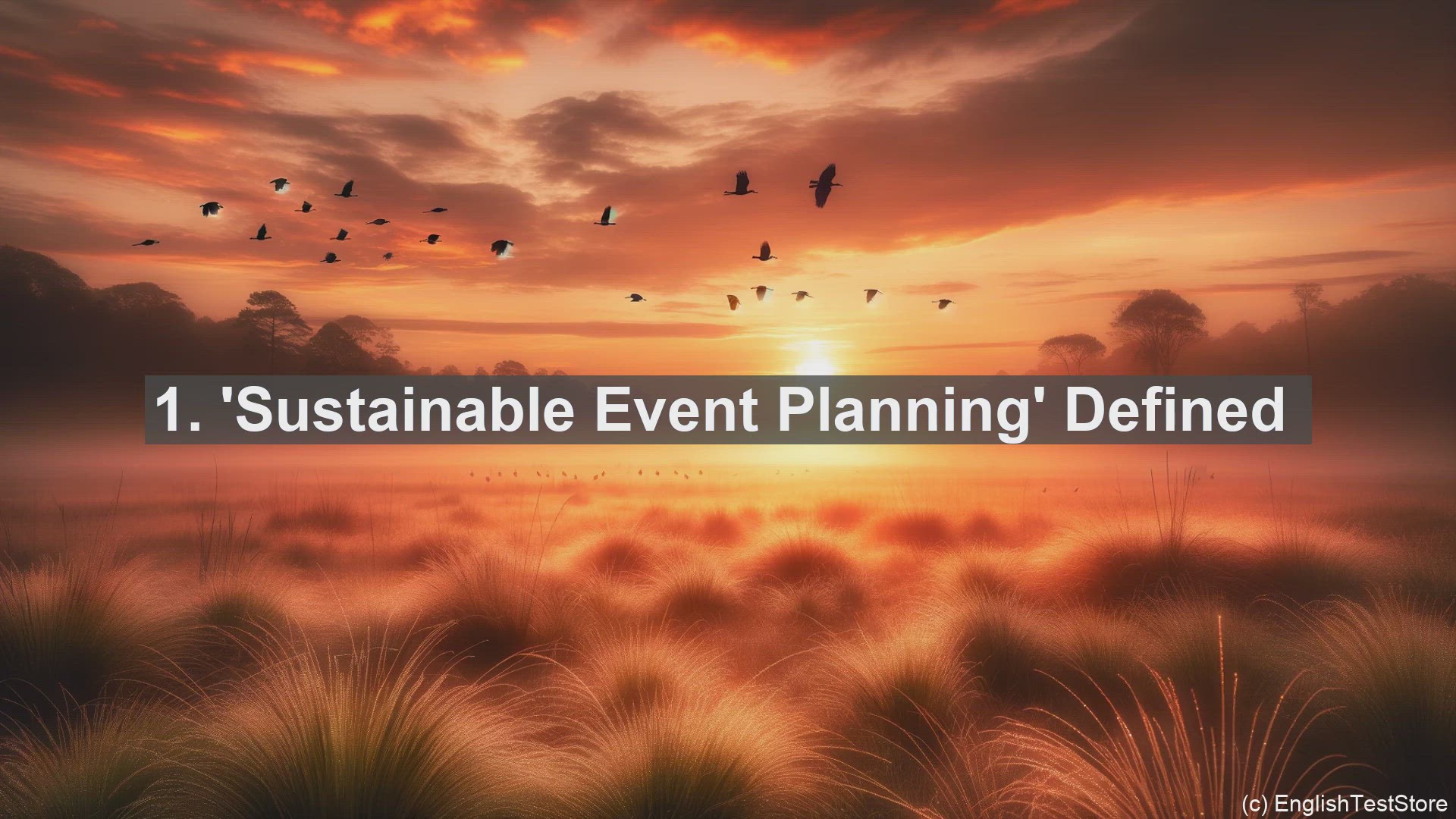
Top 10 Sentences for Understanding Sustainable Event Plannin...
721 views · Jan 15, 2024 englishteststore.net
Top 10 Sentences for Understanding Sustainable Event Planning Introduction: The Urgency of Sustainable Event Planning Hello everyone! In today's video, we delve into the world of sustainable event planning. With the increasing need for eco-consciousness, this field has gained immense importance. Whether you're organizing a small gathering or a large-scale conference, it's crucial to consider the environmental impact. Let's start with the basics! 1. 'Sustainable Event Planning' Defined Sustainable event planning is the practice of organizing and managing events while minimizing negative environmental, social, and economic impacts. It involves a holistic approach, considering factors like waste management, energy consumption, and community engagement. 2. The Three Pillars of Sustainability Sustainability in event planning revolves around three pillars: environmental, social, and economic. These pillars are interconnected, and a balanced approach is essential. For example, reducing waste not only benefits the environment but can also lead to cost savings. 3. The Power of Venue Selection Choosing the right venue is a crucial decision. Opt for spaces that are already equipped with sustainable infrastructure, such as energy-efficient lighting and water-saving fixtures. Additionally, consider the venue's accessibility to public transportation, reducing carbon emissions from attendees' travel. 4. Crafting an Eco-Friendly Menu Food is a significant aspect of any event, and it can also have a substantial environmental impact. Embrace sustainable catering options, such as locally sourced and organic ingredients. Minimize food waste through careful planning and consider composting or food donation for leftovers. 5. The Importance of Waste Management An event can generate a significant amount of waste. Implement a comprehensive waste management plan, including recycling and composting stations. Educate attendees about proper waste disposal, fostering a culture of sustainability beyond the event. 6. Engaging Stakeholders and the Community Sustainable event planning goes beyond the event itself. Engage with local communities, businesses, and organizations to create a positive impact. This can include partnering with local vendors, supporting local causes, or organizing post-event clean-up activities. 7. The Role of Technology In today's digital age, technology can be a powerful tool for sustainable event planning. Utilize event management software to streamline processes, reducing paper usage. Leverage virtual platforms for remote participation, minimizing the need for travel. 8. Evaluating Success: Metrics and Reporting Measuring the success of a sustainable event is essential. Define key metrics, such as energy consumption or waste diversion rates, and track them. This data not only helps in assessing the event's impact but also provides valuable insights for future improvements. 9. The Growing Demand for Sustainable Events The demand for sustainable events is on the rise. Individuals, organizations, and governments are increasingly recognizing the importance of environmental responsibility. By mastering sustainable event planning, you position yourself as a valuable asset in this evolving industry. Conclusion: Embracing the Future of Event Planning As we conclude our guide, remember that sustainable event planning is not just a trend; it's a necessity. By adopting eco-friendly practices, you contribute to a better world while creating memorable and impactful experiences. Thank you for joining us, and best of luck on your sustainable event planning journey!

Top 10 English Verbs for Avionics Technician
169 views · Feb 16, 2024 englishteststore.net
Top 10 English Verbs for Avionics Technician Introduction Hello everyone! Welcome to today's video. If you're an avionics technician or aspiring to be one, you know how crucial effective communication is in this field. Today, we'll be focusing on the top 10 English verbs that are essential for your day-to-day work. Let's get started! 1. Analyze As an avionics technician, you'll often be faced with complex systems and components. The verb 'analyze' is your go-to when it comes to breaking down these elements, understanding their functionality, and identifying any issues or improvements. 2. Troubleshoot Avionics systems can sometimes encounter problems. When that happens, your ability to 'troubleshoot' becomes invaluable. This verb encompasses the process of identifying, diagnosing, and resolving any issues that may arise. 3. Calibrate Precision is of utmost importance in avionics. Whether it's instruments, sensors, or other equipment, 'calibrating' ensures that they are accurate and aligned with the required standards. This verb involves adjusting and fine-tuning to achieve the desired results. 4. Install From new systems to upgraded components, 'installing' is a verb that you'll frequently encounter. It involves the process of setting up, connecting, and integrating various elements to ensure their proper functioning within the aircraft. 5. Maintain Avionics systems require regular attention and care. 'Maintaining' involves not only routine checks and inspections but also preventive measures to ensure optimal performance and longevity. 6. Upgrade With advancements in technology, avionics systems are constantly evolving. As an avionics technician, you'll often be involved in 'upgrading' existing systems, replacing outdated components with newer, more efficient ones. 7. Document In any technical field, 'documentation' is vital. This verb encompasses the process of recording, detailing, and archiving various aspects, from system configurations to maintenance logs. Accurate and comprehensive documentation is essential for traceability and future reference. 8. Communicate Avionics technicians rarely work in isolation. Effective 'communication' is key, whether it's with colleagues, pilots, or other stakeholders. This verb involves not only conveying information but also actively listening and understanding the needs and requirements of others. 9. Test Before an aircraft takes flight, thorough 'testing' is conducted. This verb encompasses a range of activities, from functional checks to performance evaluations. The goal is to ensure that all systems are operating as intended, without any issues or anomalies. 10. Troubleshoot We're back to 'troubleshoot' again, but this time, it's in the context of ongoing support. Even after a system is installed or repaired, there may be instances where issues arise. Your ability to 'troubleshoot' effectively ensures that these problems are addressed promptly, minimizing any potential disruptions. Conclusion And there you have it - the top 10 English verbs for avionics technicians. Mastering these verbs not only enhances your technical skills but also contributes to seamless collaboration and communication within the aviation industry. Thank you for watching, and we'll see you in the next video!
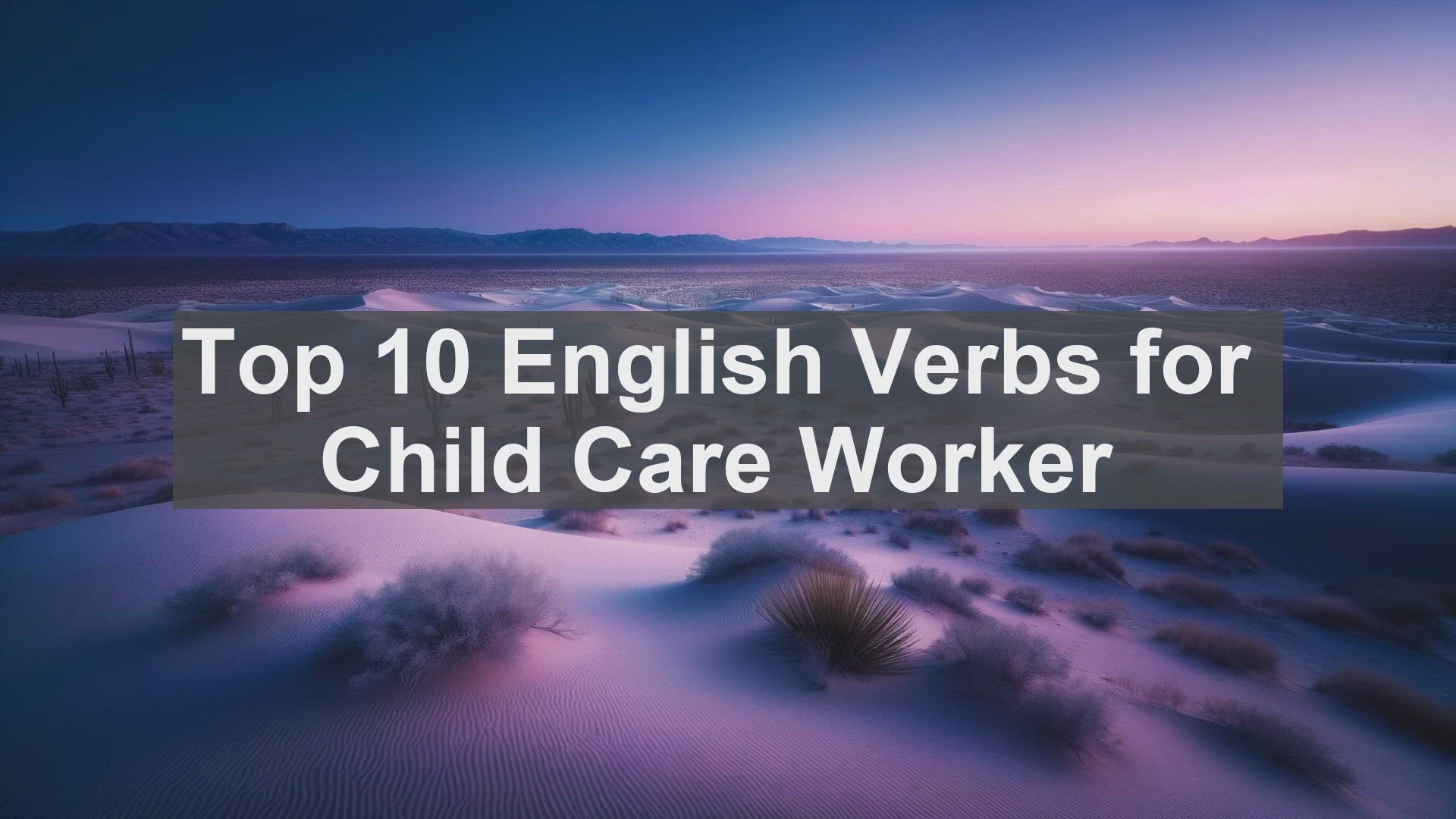
Top 10 English Verbs for Child Care Worker
285 views · Feb 16, 2024 englishteststore.net
Top 10 English Verbs for Child Care Worker Introduction Hello everyone! As a child care worker, effective communication is key. And what better way to improve your communication skills than by mastering the most important verbs? Today, I'll be sharing with you the top 10 English verbs that every child care worker should know. Let's get started! 1. Play Play is not just about having fun; it's a crucial part of a child's development. By engaging in play activities, you can foster their cognitive, social, and emotional growth. So, whether it's building blocks or playing pretend, remember to make time for play! 2. Listen Listening is an essential skill for any child care worker. By actively listening to a child, you not only show them that you value their thoughts and feelings, but you also gain valuable insights into their needs and interests. So, next time a child speaks, give them your full attention! 3. Teach As a child care worker, you're not just a caregiver; you're also an educator. Whether it's teaching them the alphabet or a new skill, your role in their learning journey is crucial. So, embrace every opportunity to teach and inspire! 4. Care Caring is at the heart of your profession. From providing a safe environment to tending to their physical and emotional needs, your care and nurturing play a significant role in a child's well-being. Never underestimate the power of a caring touch or a comforting word! 5. Communicate Communication is the cornerstone of any relationship, and it's no different in child care. Whether it's with a child, their parents, or your colleagues, clear and effective communication ensures that everyone is on the same page. So, hone your communication skills to build strong connections! 6. Support Children rely on you for support, both physically and emotionally. From helping them with their daily tasks to being there during challenging moments, your support gives them the confidence to navigate the world around them. So, always be ready to lend a helping hand! 7. Observe Observation is a skill that can provide you with valuable insights into a child's behavior, interests, and development. By keenly observing, you can tailor your activities and approaches to suit their individual needs. Remember, sometimes, the best way to understand a child is by simply watching them! 8. Encourage Encouragement is a powerful motivator. By acknowledging a child's efforts and providing positive reinforcement, you not only boost their self-esteem but also inspire them to keep trying. So, be their biggest cheerleader! 9. Engage Engaging with a child goes beyond just being physically present. It's about actively participating in their world, showing genuine interest, and creating meaningful connections. So, whether it's through a game or a conversation, make sure you're fully engaged! 10. Adapt Flexibility is key in child care. Every day brings new challenges and situations, and being able to adapt and adjust is crucial. So, embrace change, think on your feet, and always be ready for the unexpected! Conclusion And there you have it - the top 10 English verbs for child care workers. By mastering these verbs, you'll not only enhance your language skills but also become an even more effective and impactful child care worker. So, keep learning, keep growing, and keep making a difference in the lives of the children you care for. Thank you for watching!

Top 10 important words and phrases for Photographic Equipmen...
2K views · Feb 27, 2024 englishteststore.net
Top 10 important words and phrases for Photographic Equipment Mechanic Introduction to Photographic Equipment Mechanics Hello everyone! Welcome to this video on the top 10 important words and phrases for photographic equipment mechanics. As a student or an enthusiast in the field of photography, it's crucial to have a solid understanding of these terms. Whether you're planning to pursue a career in camera repair or simply want to maintain your own gear, this knowledge will be invaluable. So, let's get started! 1. Shutter Speed Shutter speed refers to the length of time the camera's shutter remains open, allowing light to enter and expose the image sensor. It's measured in fractions of a second, such as 1/1000 or 1/30. Understanding shutter speed is essential for capturing motion, as it can freeze or blur movement, resulting in different creative effects. 2. Aperture Aperture, often denoted by an 'f' number, controls the size of the camera's lens opening. It determines the amount of light that reaches the image sensor. Additionally, aperture plays a crucial role in depth of field, affecting the sharpness of both foreground and background elements in a photograph. 3. ISO ISO, originally an abbreviation for 'International Organization for Standardization,' refers to the camera's sensitivity to light. A lower ISO, such as 100, is ideal for well-lit conditions, while a higher ISO, like 1600, is suitable for low-light situations. However, higher ISO values can introduce digital noise, affecting image quality. 4. Focal Length Focal length is a measure of a lens's magnification. It determines the field of view and the level of zoom. A smaller focal length, like 18mm, provides a wider angle of view, while a larger focal length, such as 200mm, offers a narrower field of view, often used for telephoto shots. 5. Depth of Field Depth of field refers to the range of distance in a photograph that appears acceptably sharp. It's influenced by factors like aperture, focal length, and subject distance. A shallow depth of field, achieved with a wide aperture, can create a beautiful background blur, drawing attention to the main subject. 6. White Balance White balance ensures accurate color reproduction in photographs. Different light sources have varying color temperatures, and adjusting the white balance setting helps neutralize these color casts. For instance, tungsten lighting appears warm, while daylight has a cooler tone. Setting the appropriate white balance ensures natural-looking colors. 7. Megapixel Megapixel refers to the resolution of a digital image. It's a measure of the number of pixels, or individual dots, that make up an image. Higher megapixel counts result in larger image sizes and potentially more detail. However, for most purposes, a camera with 12-24 megapixels is more than sufficient. 8. Image Stabilization Image stabilization, often abbreviated as IS or VR (Vibration Reduction), compensates for camera shake during handheld shooting. It's particularly useful in low-light conditions or when using longer focal lengths. Image stabilization can be implemented either in the camera body or the lens itself. 9. RAW Format RAW format, available in many high-end cameras, captures all the data from the image sensor without any compression or processing. It provides maximum flexibility during post-processing, allowing for adjustments in exposure, white balance, and more, without significant loss of quality. 10. Lens Hood A lens hood is an accessory that attaches to the front of a camera lens. Its primary purpose is to block stray light from entering the lens, reducing the chances of lens flare and improving image contrast. Additionally, a lens hood also provides physical protection to the lens from accidental bumps or scratches. Conclusion And that wraps up our exploration of the top 10 essential words and phrases for photographic equipment mechanics. Whether you're just starting out or already well-versed in the field, these terms form the foundation of your knowledge. By understanding and applying them, you'll be better equipped to handle camera repairs, maintain your gear, and capture stunning photographs. Thank you for watching, and see you in the next video!

Top 10 important words and phrases for PrintingGraphic Arts ...
3K views · Feb 28, 2024 englishteststore.net
Top 10 important words and phrases for Printing,Graphic Arts Reproduction Technician Introduction: The Power of Words in the Printing and Graphic Arts World Hello, aspiring Printing and Graphic Arts Reproduction Technicians! Today, we're diving into the world of words. While technical skills are crucial, understanding the terminology is equally important. It ensures clear communication and efficient workflow. Let's begin! 1. DPI: The Building Block of Image Quality DPI, or Dots Per Inch, measures the resolution of an image. A higher DPI means more dots, resulting in finer details. It's a critical factor when it comes to print quality and sharpness. 2. CMYK: The Color Model for Print CMYK stands for Cyan, Magenta, Yellow, and Key (Black). Unlike digital screens that use RGB, printers rely on CMYK. Each color is applied in layers, creating a full spectrum. Understanding CMYK's intricacies is essential for accurate color reproduction. 3. Bleed: Extending Beyond the Edge Bleed refers to the extra area around a design that extends beyond the final trim. It ensures that when the paper is cut, there are no white edges. A proper bleed guarantees a professional, polished result. 4. Halftone: The Art of Gradients Halftone is a technique used to reproduce continuous tone images, like photographs, using a series of dots. By varying the dot size and spacing, different shades and gradients are achieved. It's a fascinating process with a rich history. 5. Registration: Perfect Alignment In multi-color printing, registration is the precise alignment of each color layer. Even a slight misalignment can result in blurred or distorted images. Mastering registration is crucial for impeccable prints. 6. Plate: The Printing Surface A printing plate is the surface that carries the image to be printed. It can be made of metal, plastic, or even paper. The plate is carefully prepared, ensuring the correct transfer of ink to the substrate. 7. Substrate: The Canvas for Printing The substrate is the material on which the image is printed. It can be paper, fabric, plastic, or various other materials. Each substrate requires specific considerations, such as ink absorption and drying time. 8. Gamut: The Range of Colors Gamut refers to the complete range of colors that a device, such as a printer or monitor, can reproduce. Understanding a device's gamut helps in color management and ensuring accurate color representation. 9. Plate Cylinder: The Heart of the Press In a printing press, the plate cylinder holds the printing plate. As the cylinder rotates, the plate transfers the image to the substrate. It's a central component in the printing process. 10. Gripper Margin: Keeping Things in Place The gripper margin is the unprintable area on the leading edge of a sheet. It's where the grippers hold the paper during the printing process. A proper gripper margin ensures smooth, consistent feeding. Conclusion: The Journey Begins! And there you have it, 10 essential words and phrases for budding Printing and Graphic Arts Reproduction Technicians. By mastering these terms, you're building a solid foundation for your career. Keep exploring, keep learning, and the world of printing and graphic arts will unfold before you. Happy printing!
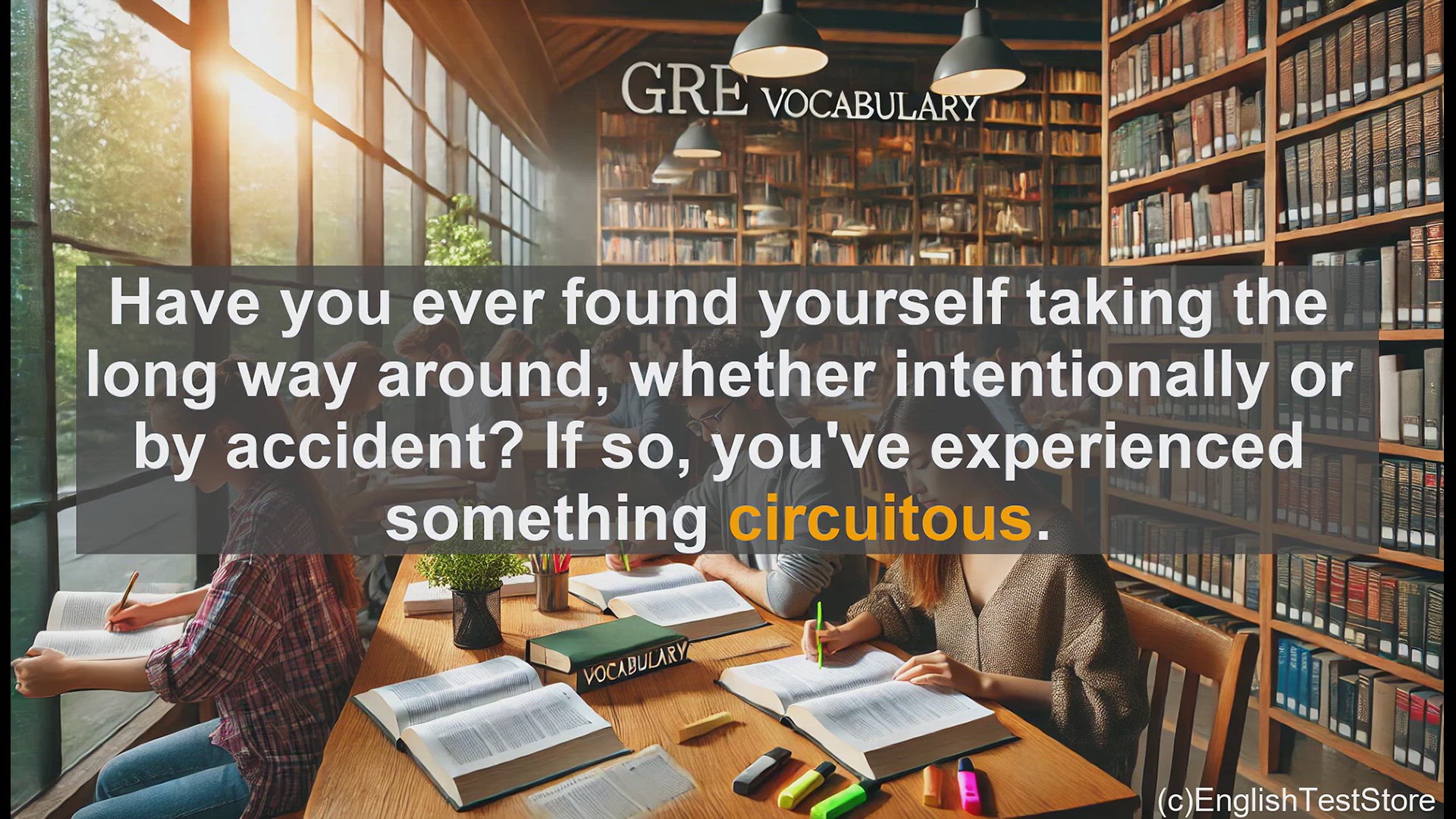
GRE Vocabulary Lesson: Exploring the Vocabulary Term 'Ci...
19K views · Aug 13, 2024 englishteststore.net
This video explores the meaning, usage, and importance of the vocabulary term 'circuitous' for the GRE exam. It covers the word's definition, history, synonyms, antonyms, and common errors in usage, providing examples to help viewers understand the concept.